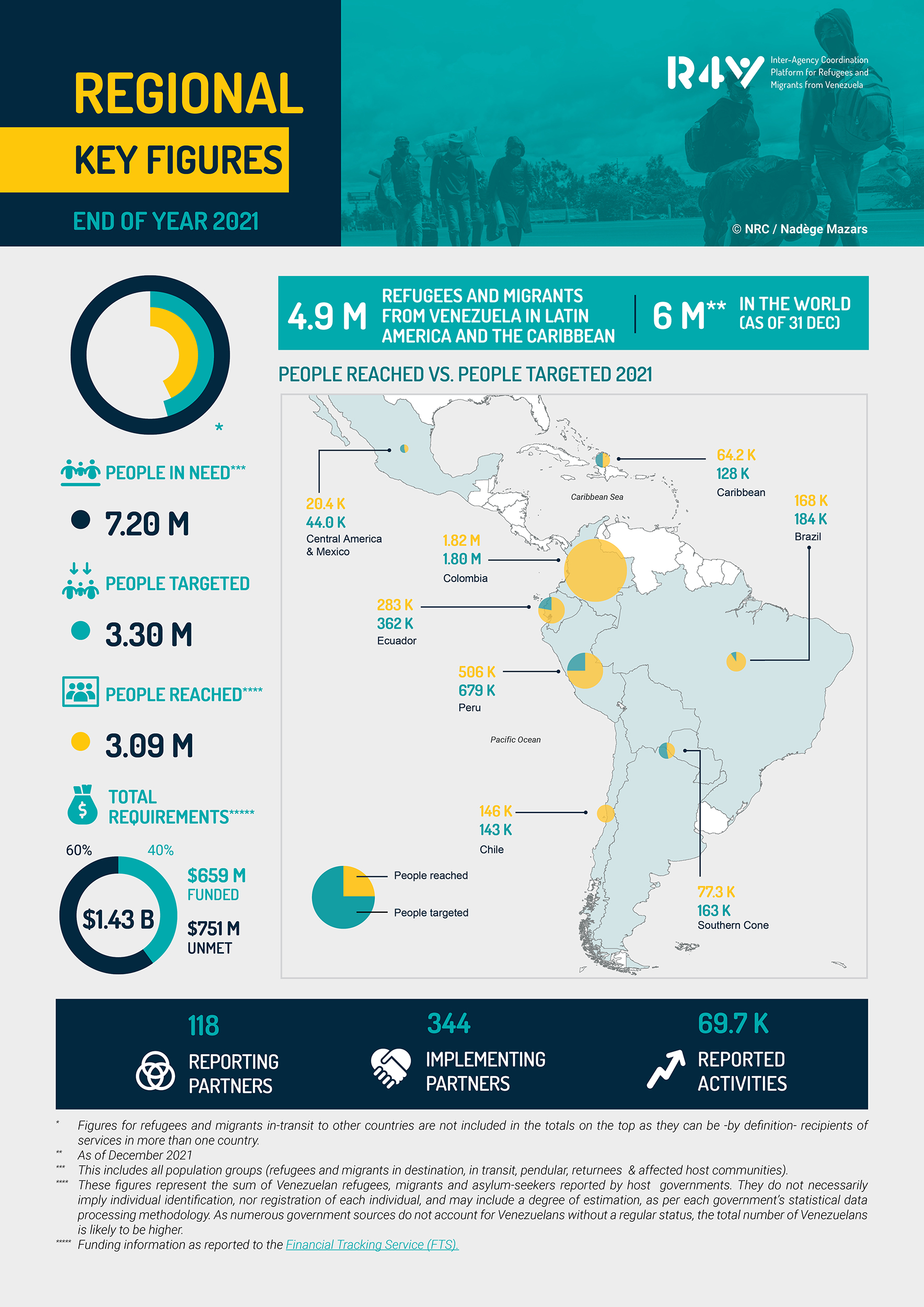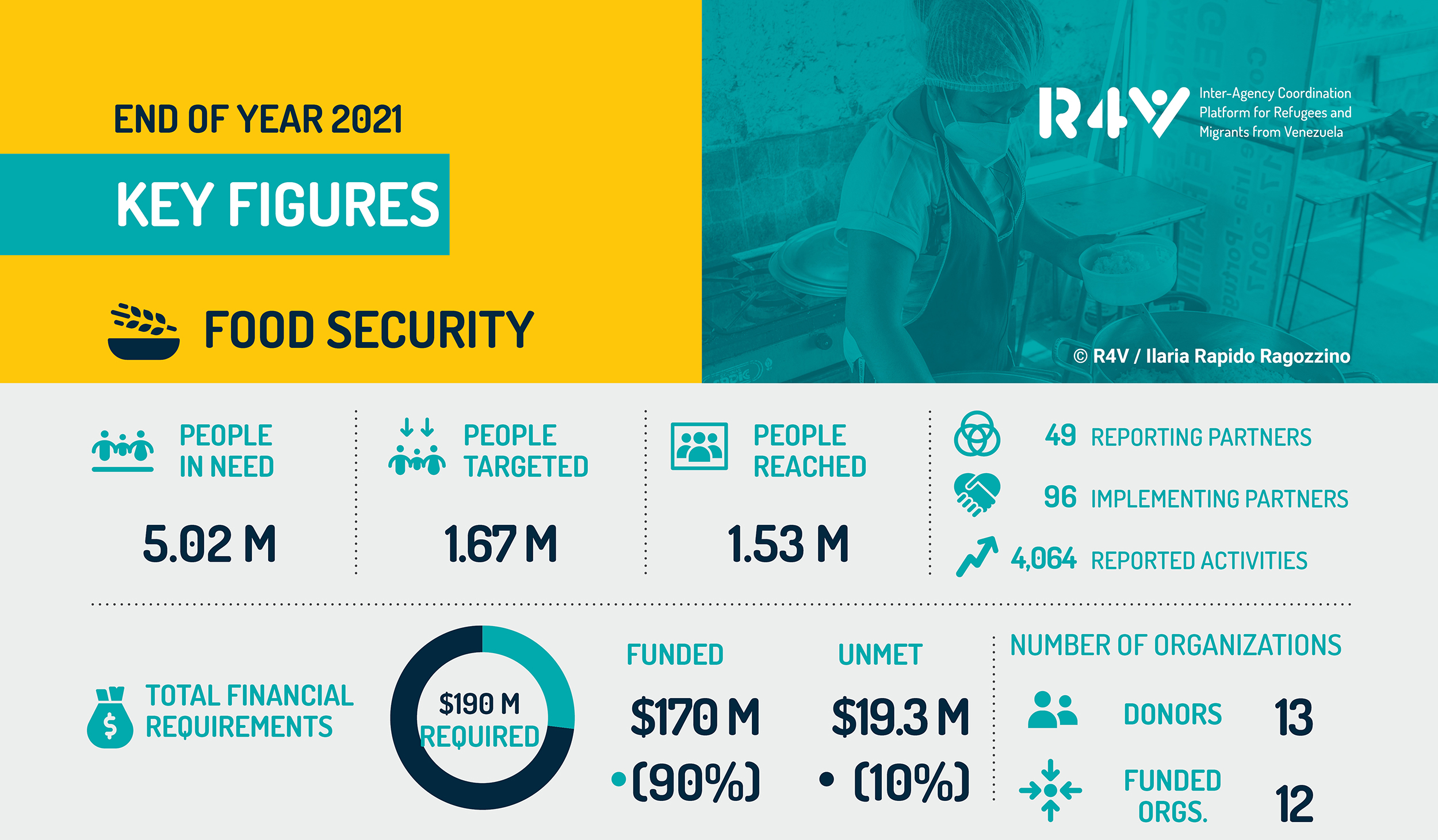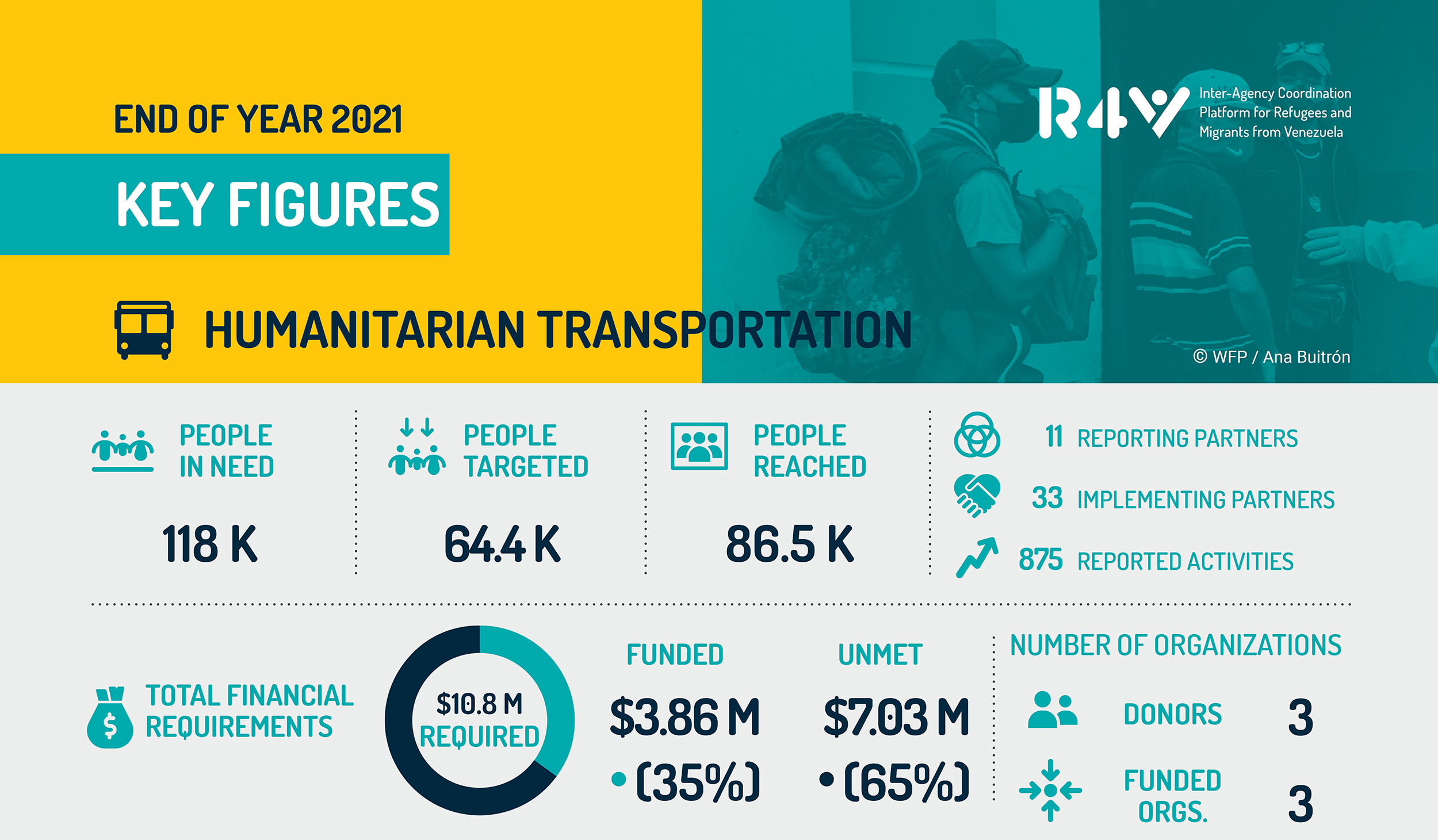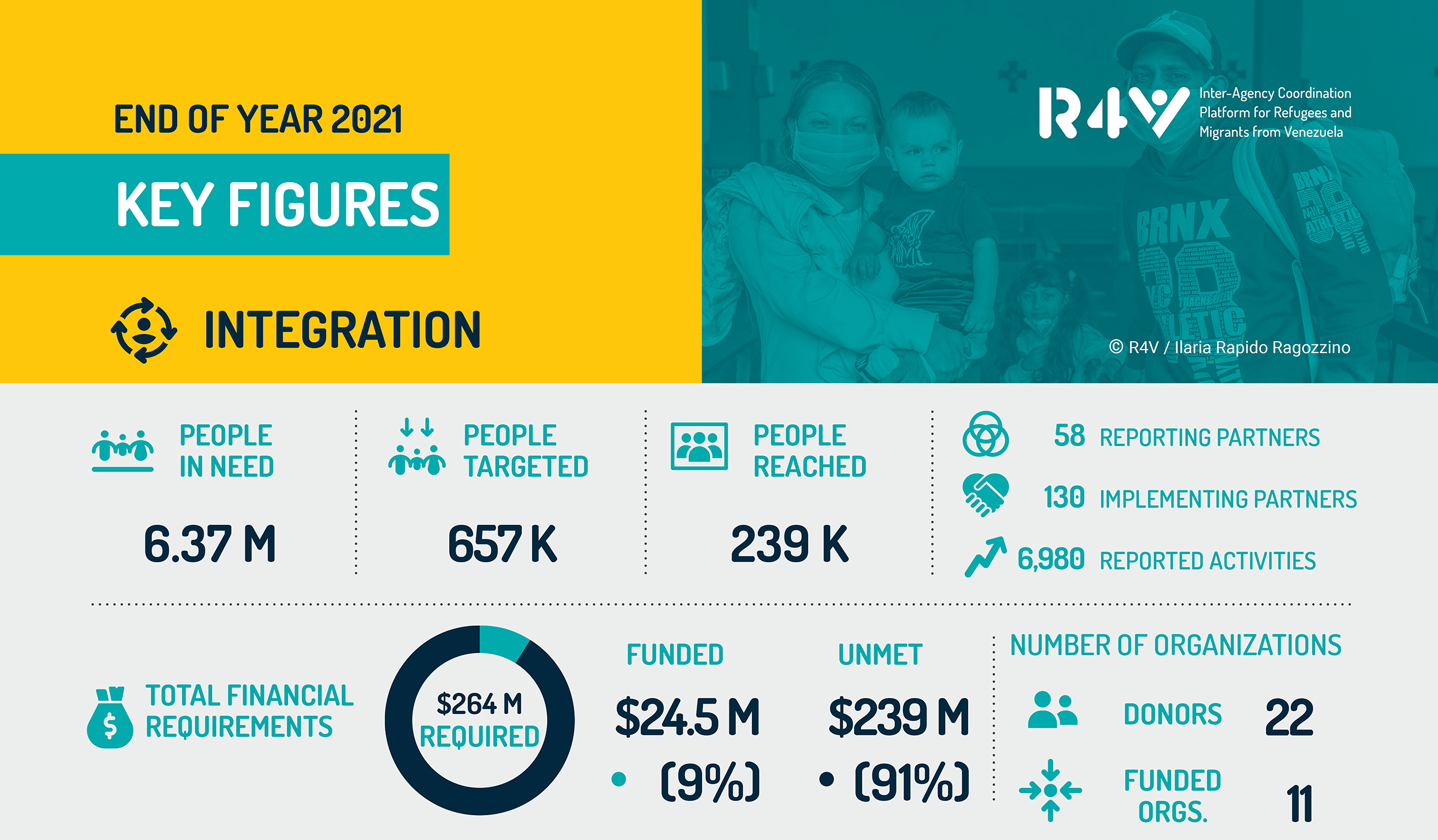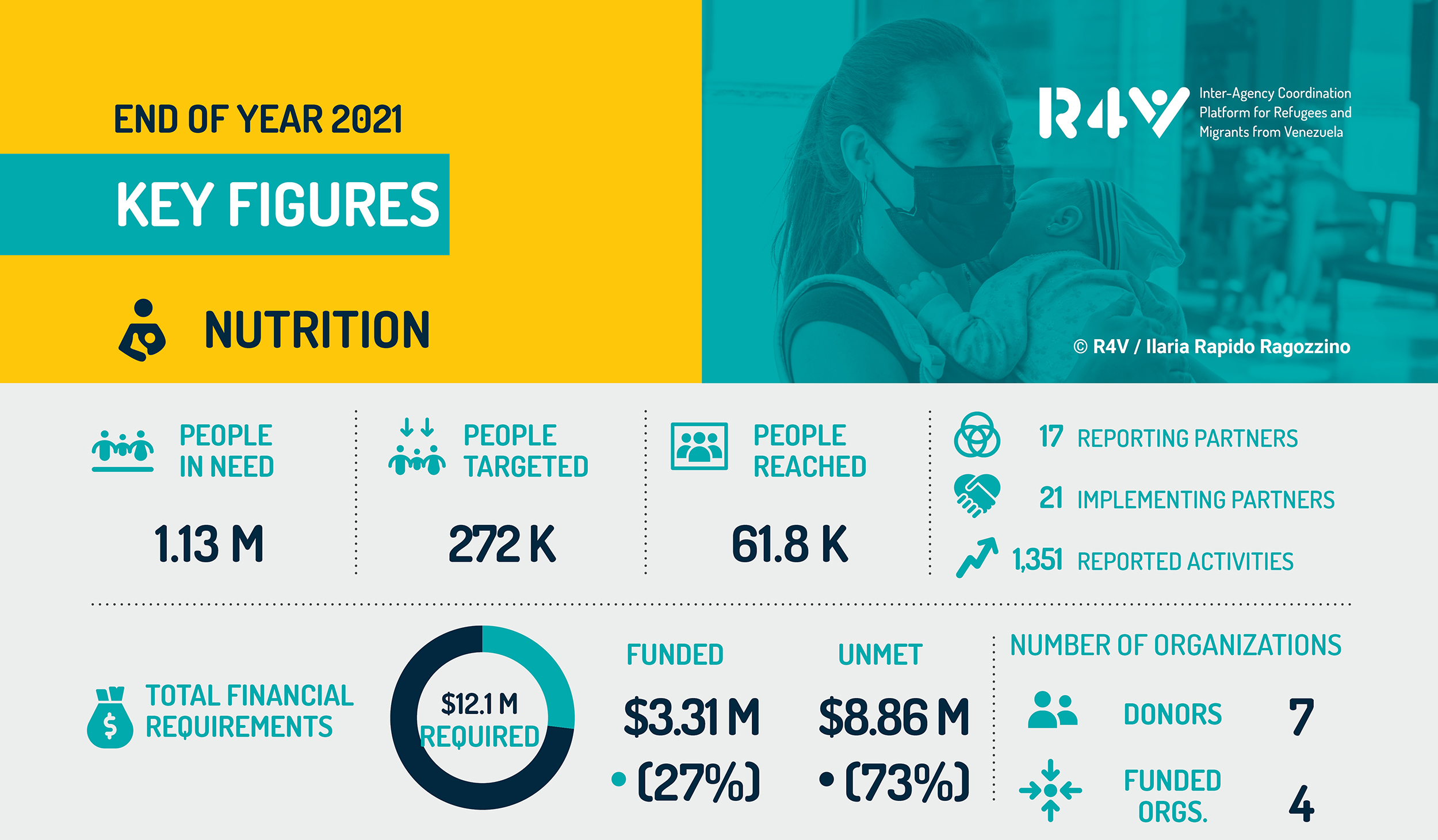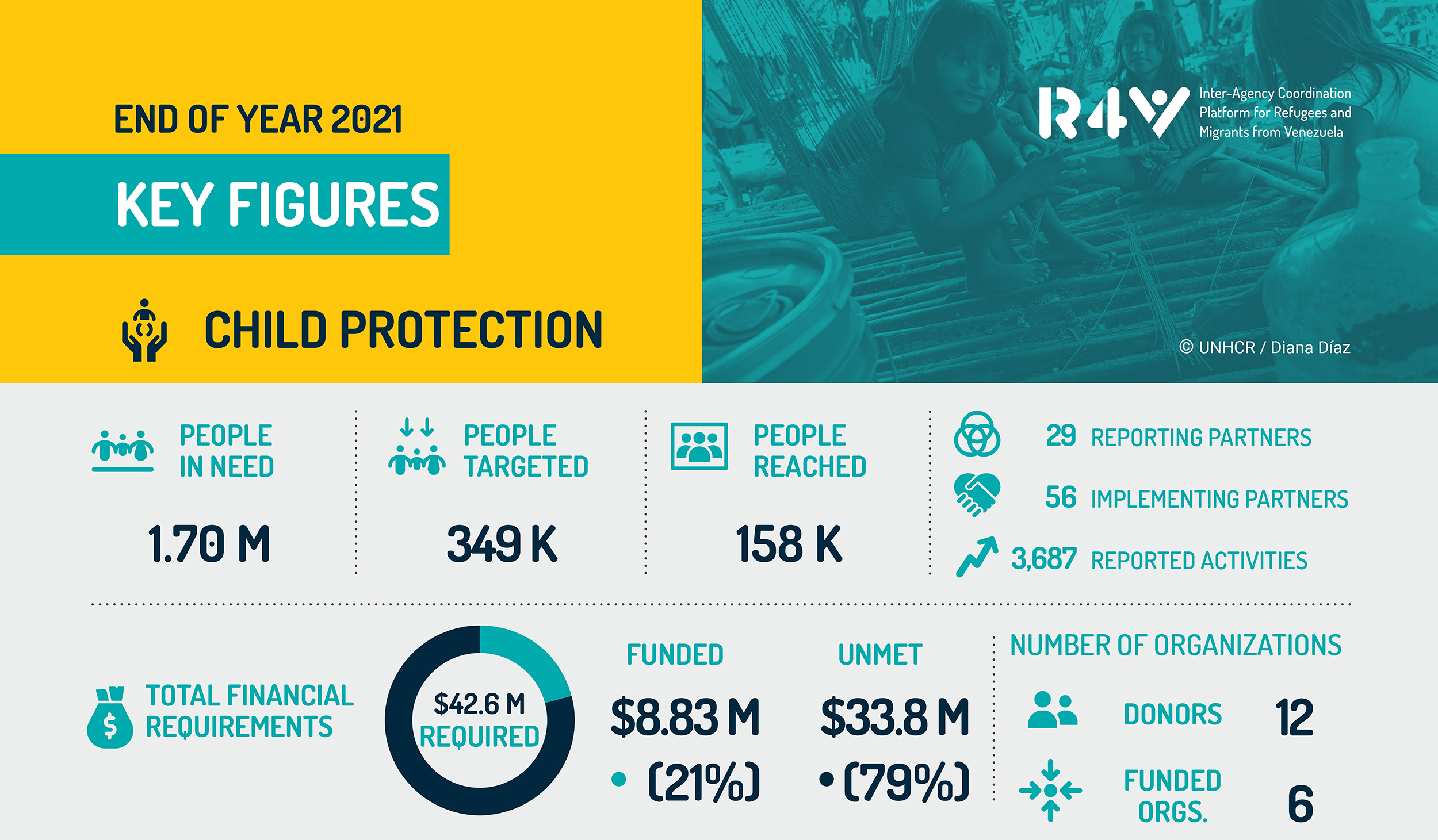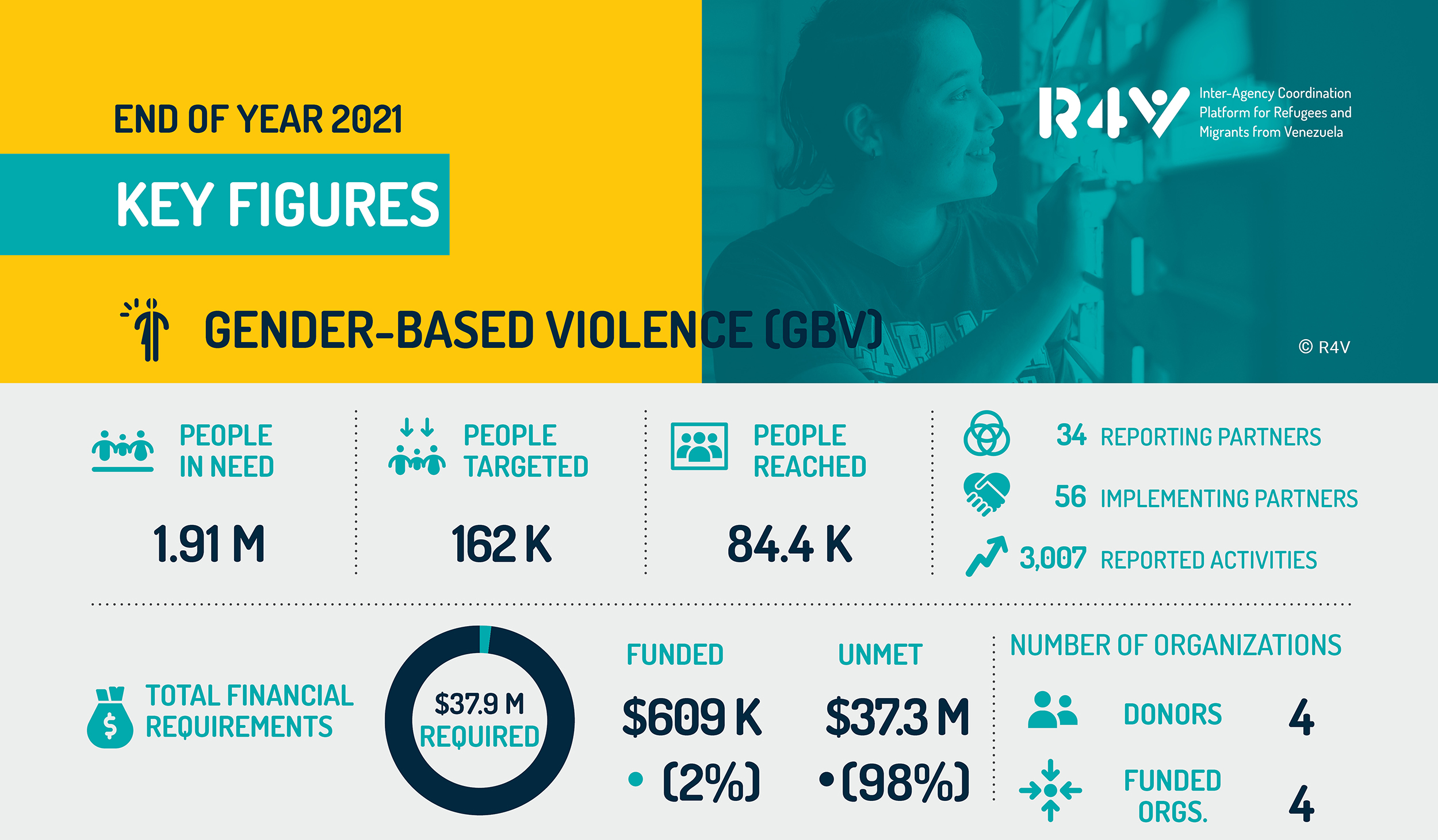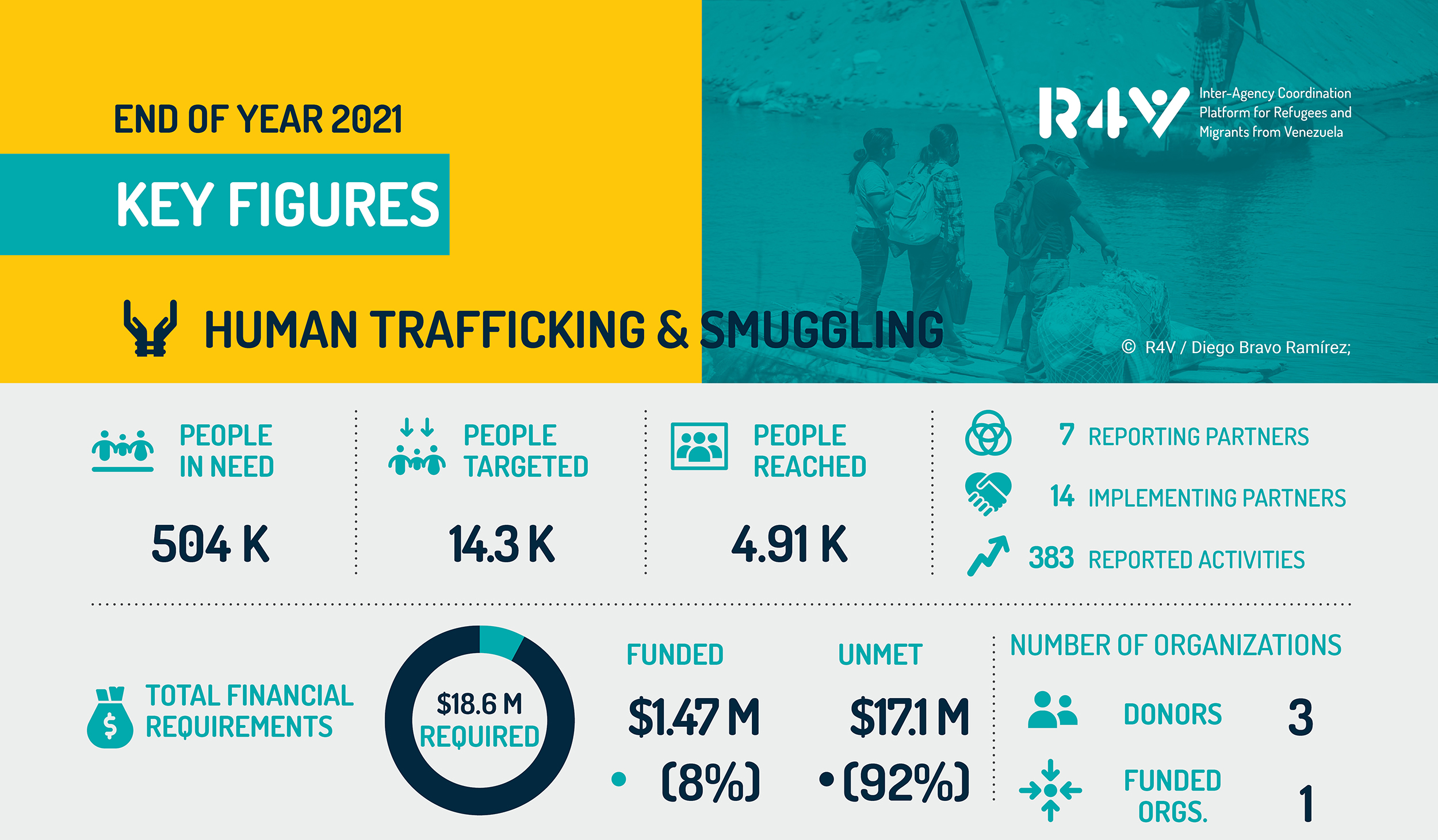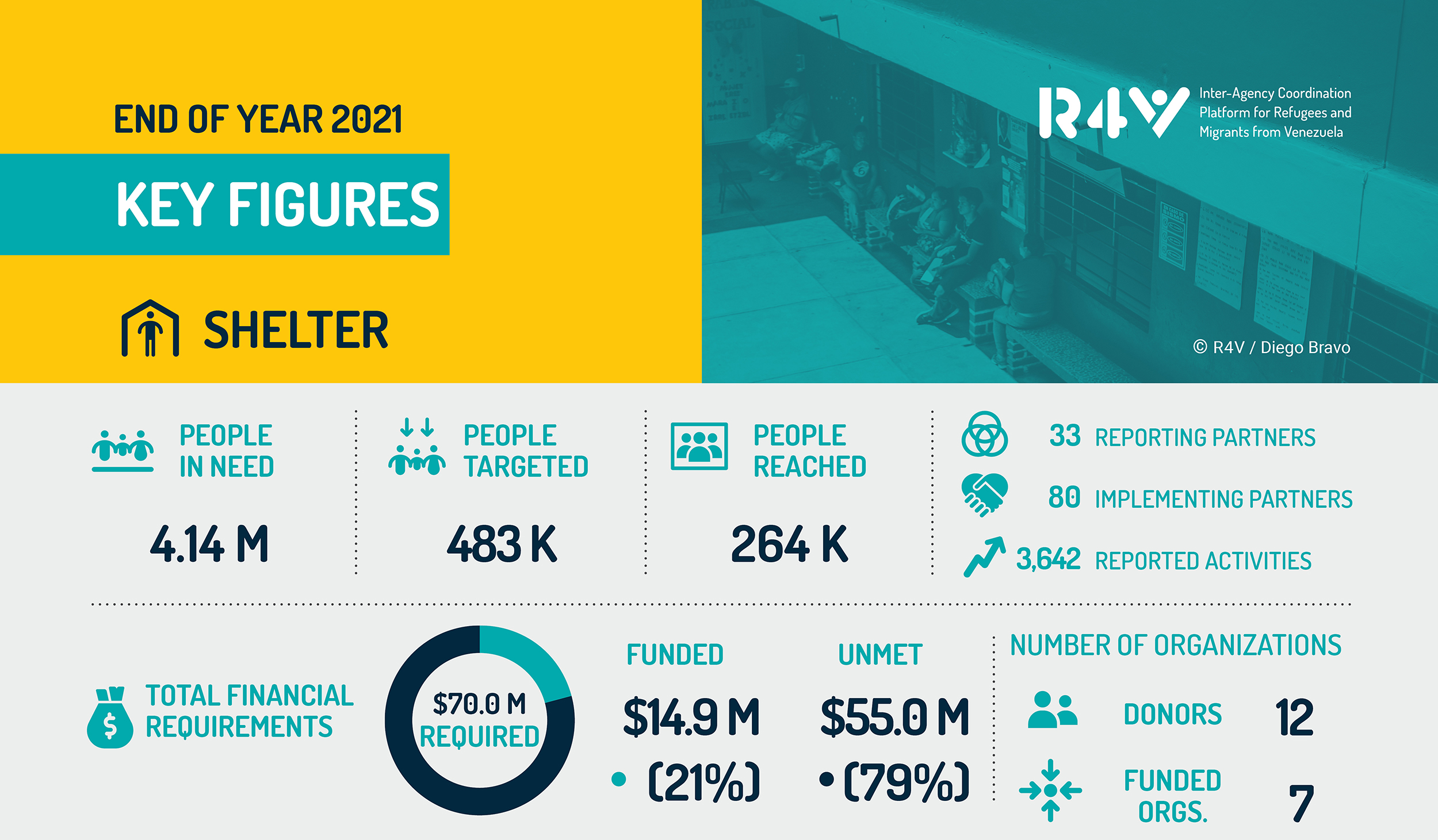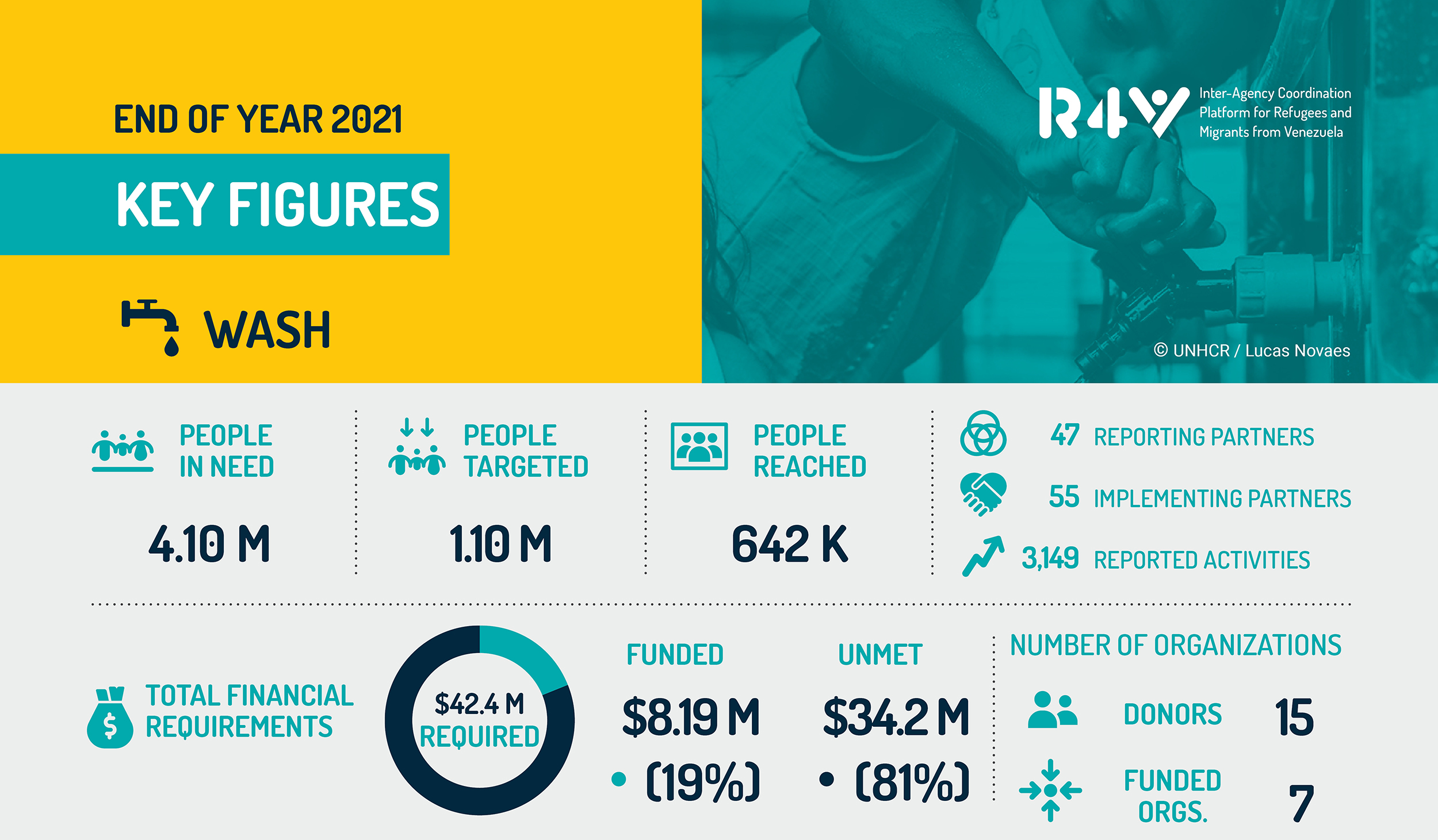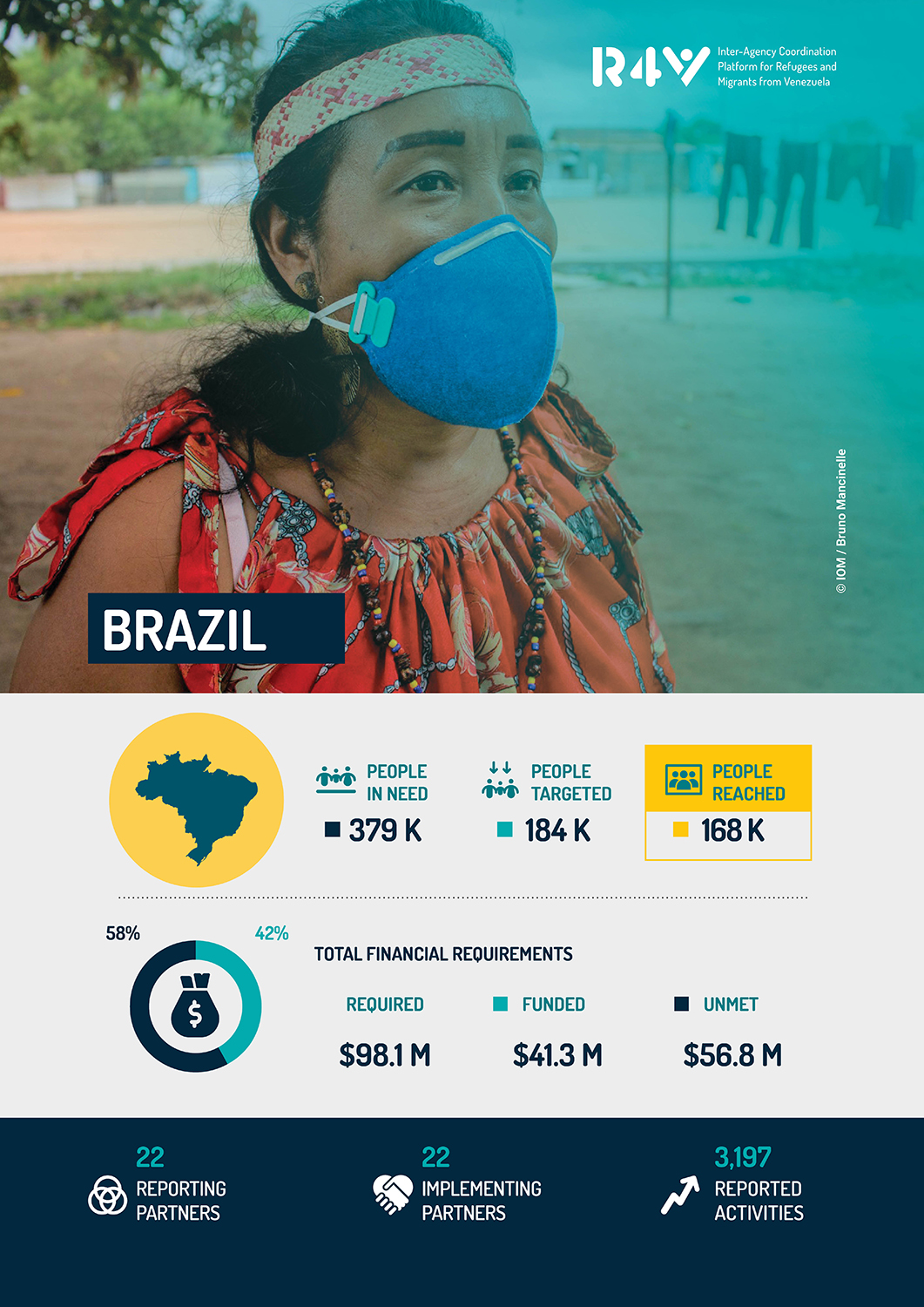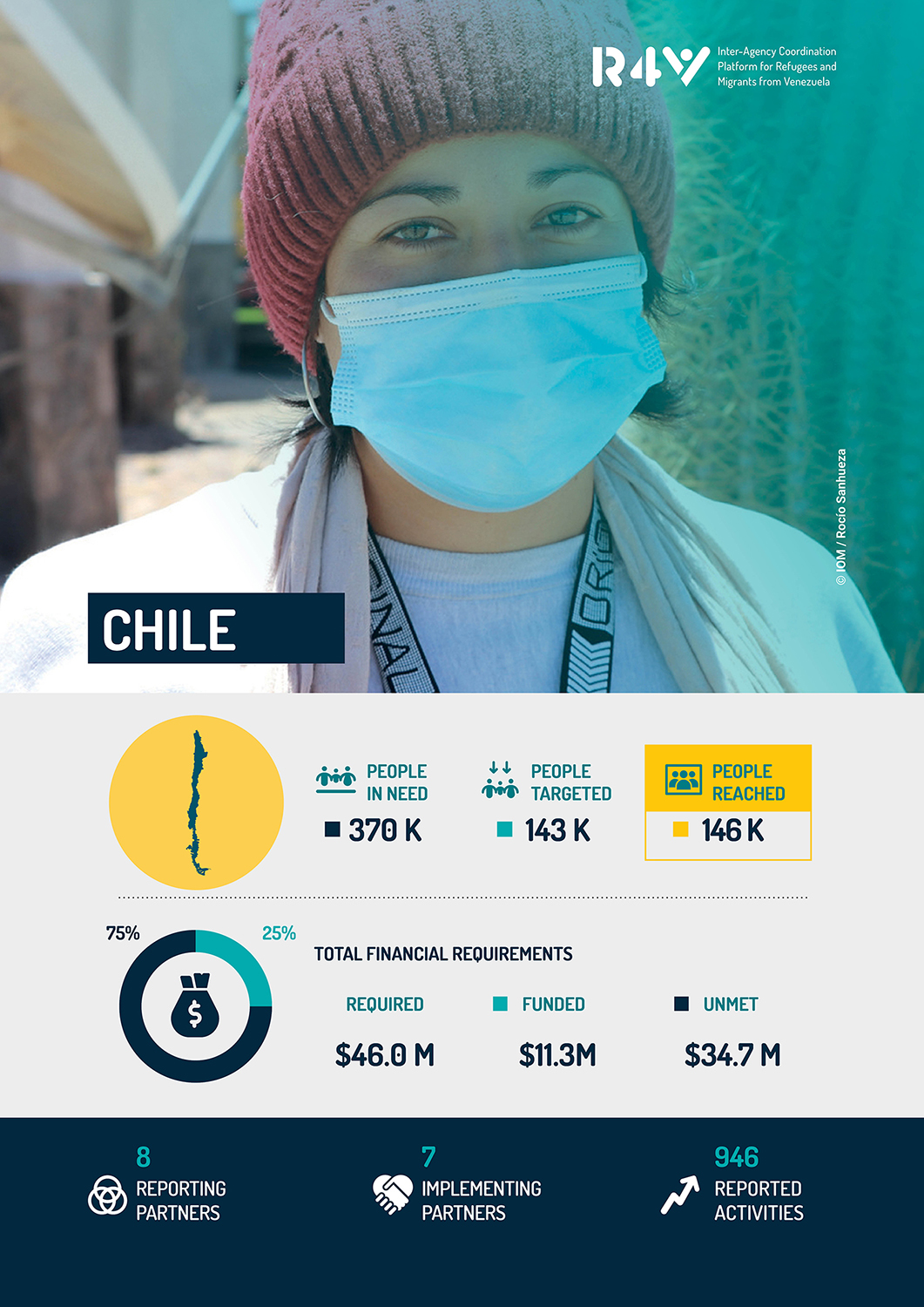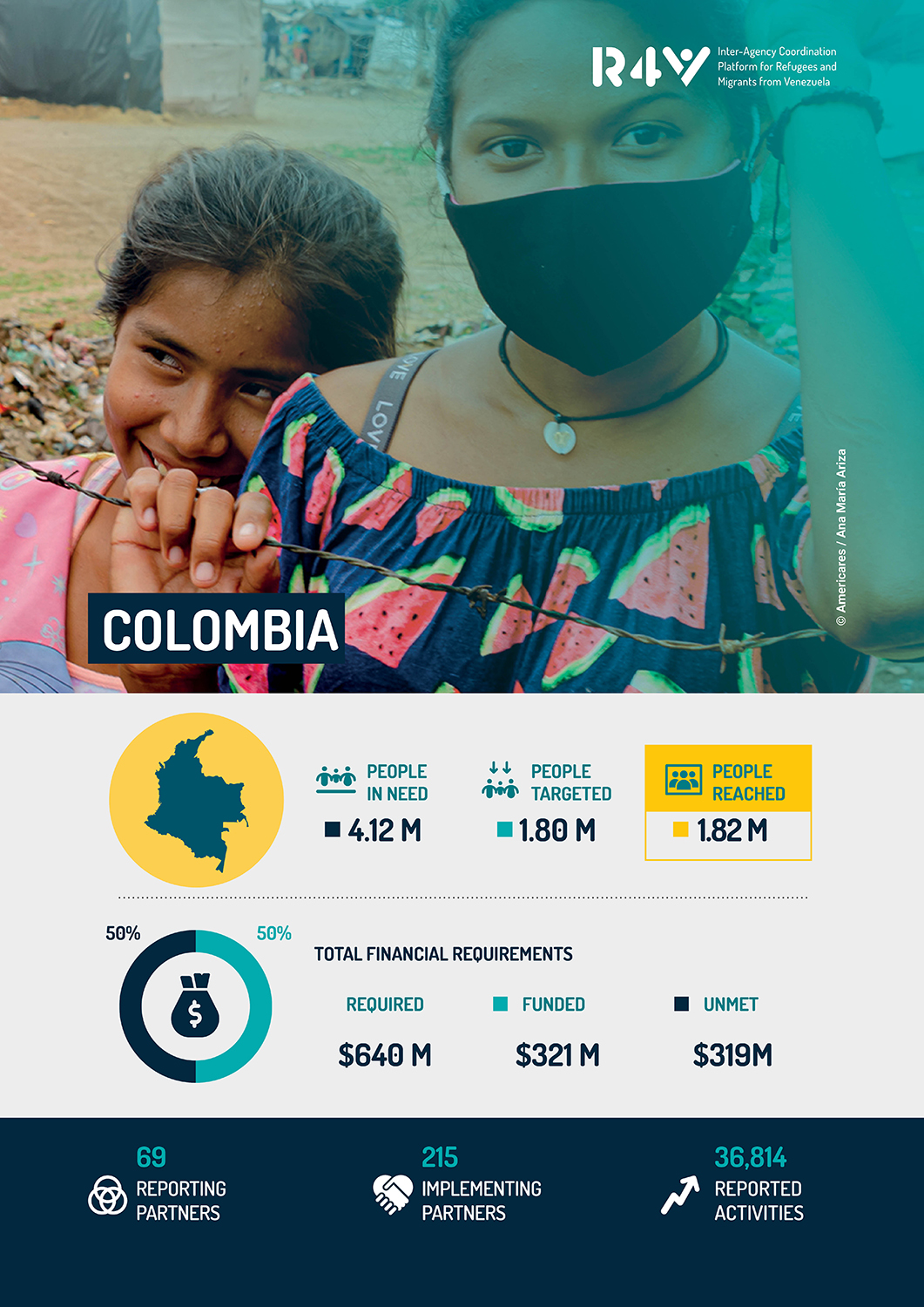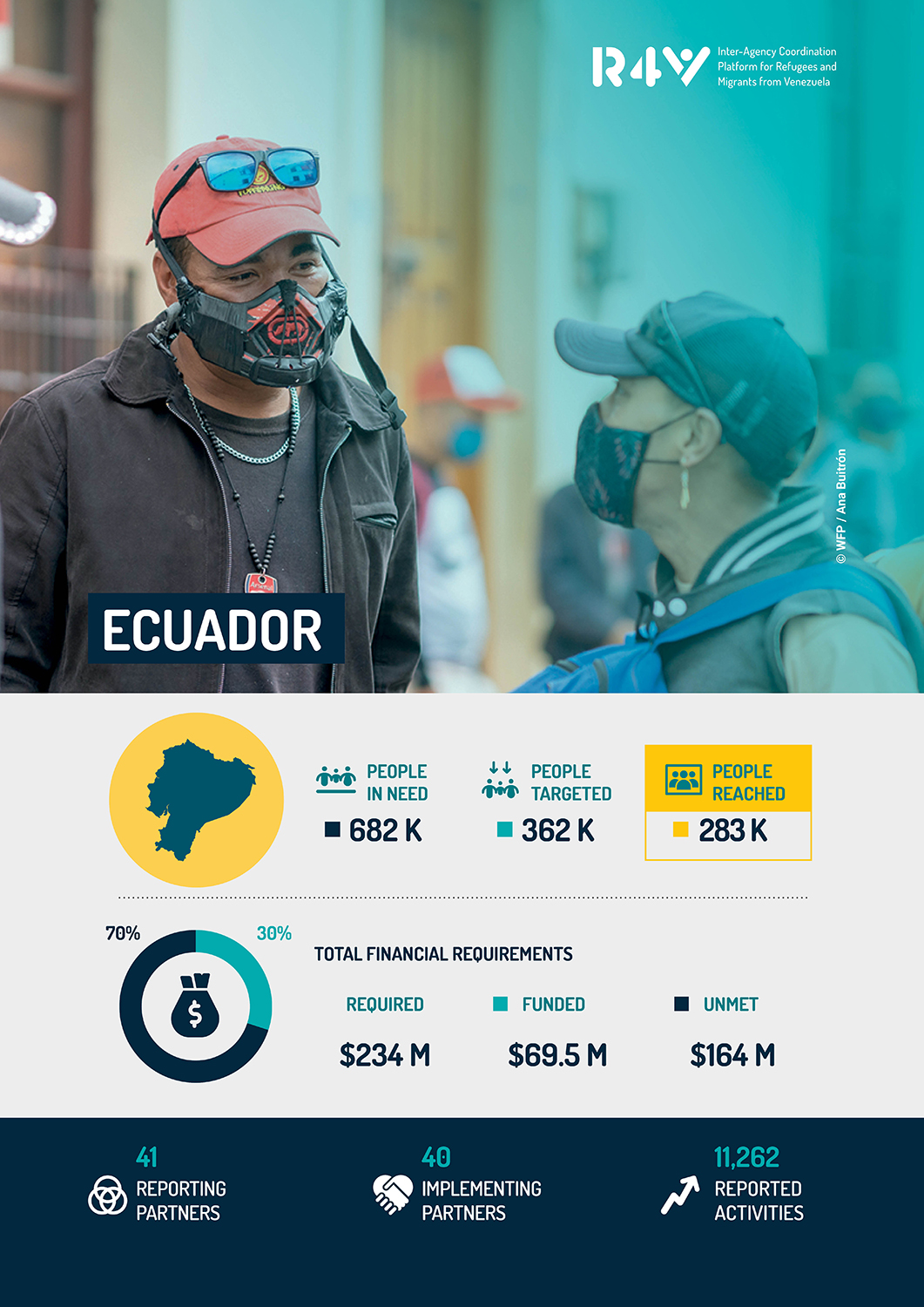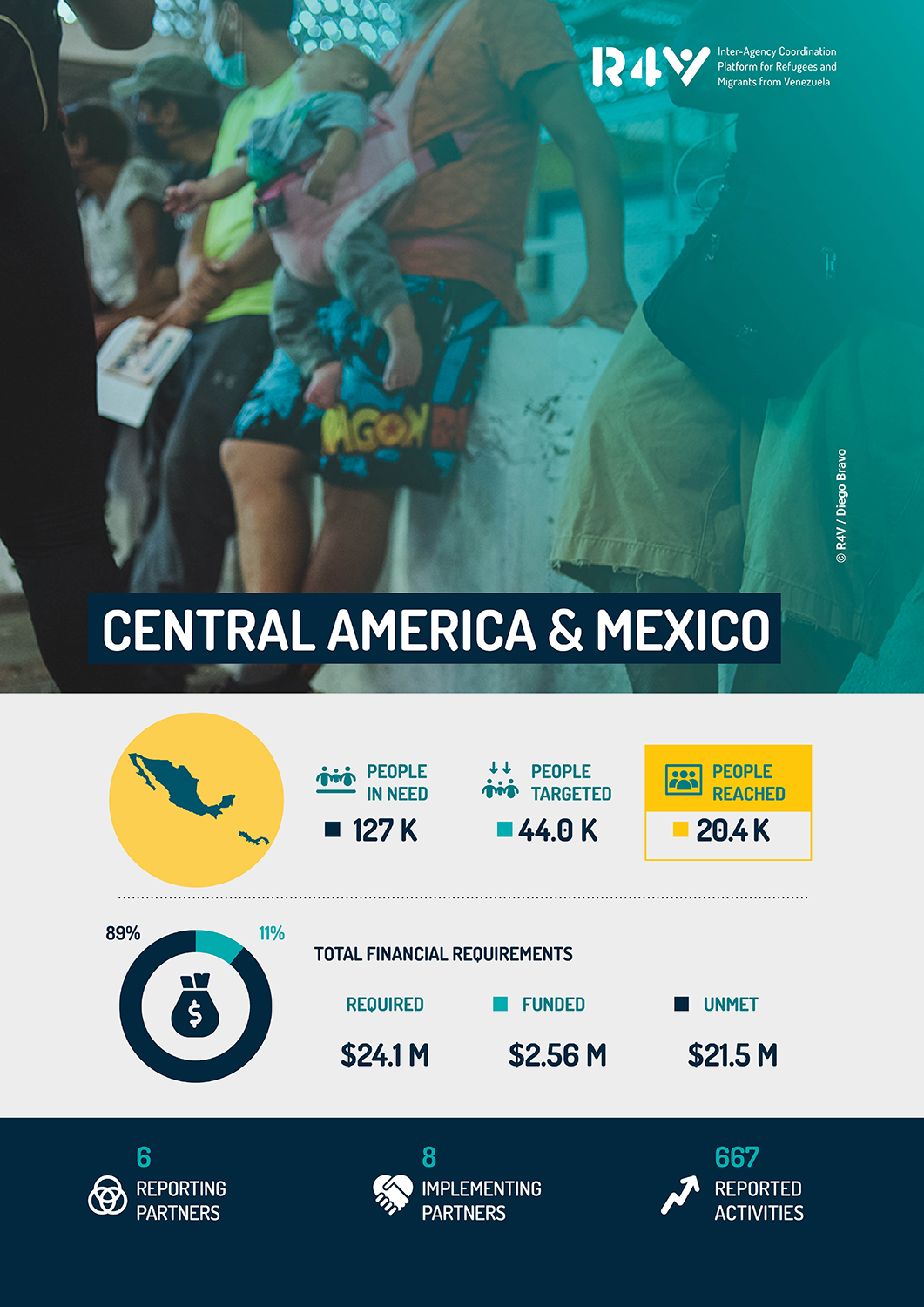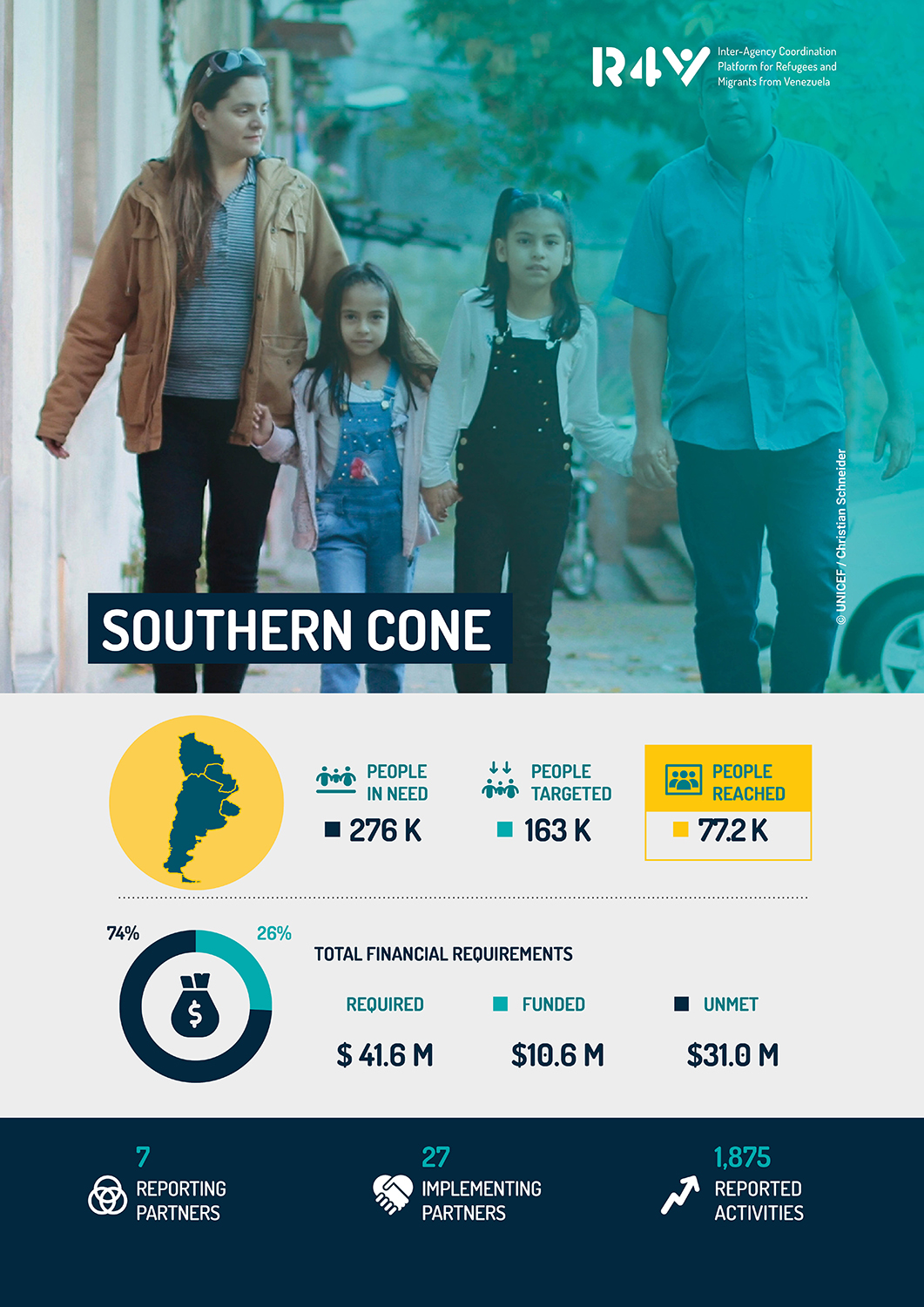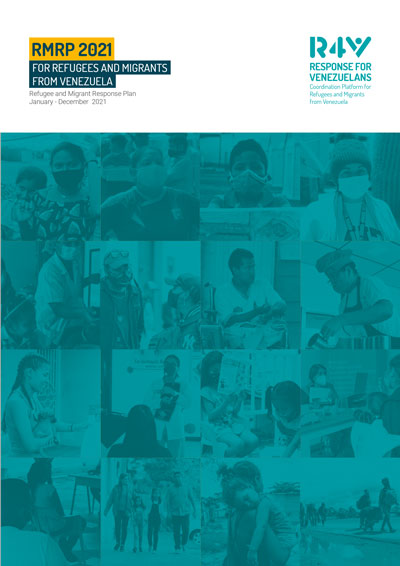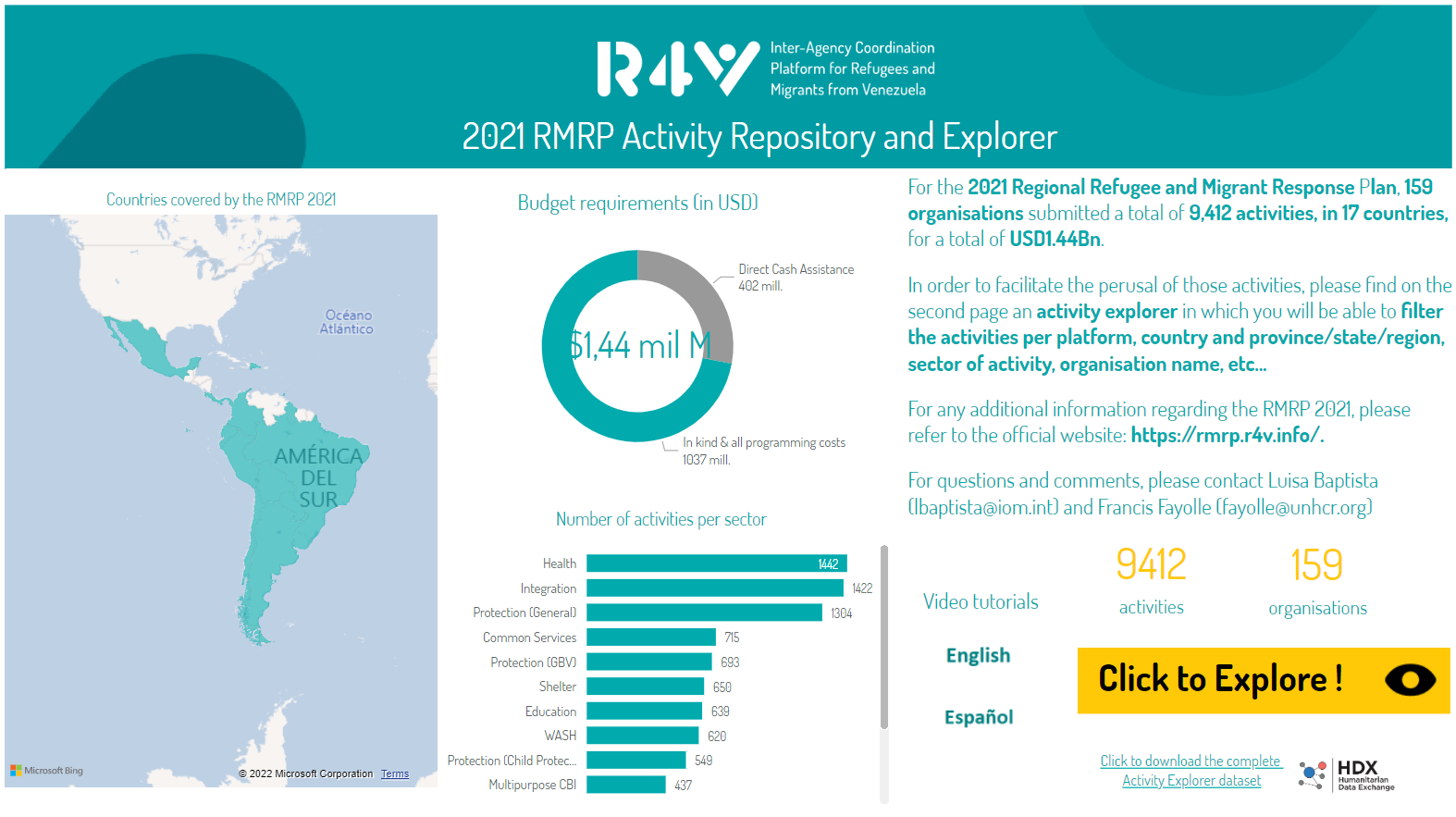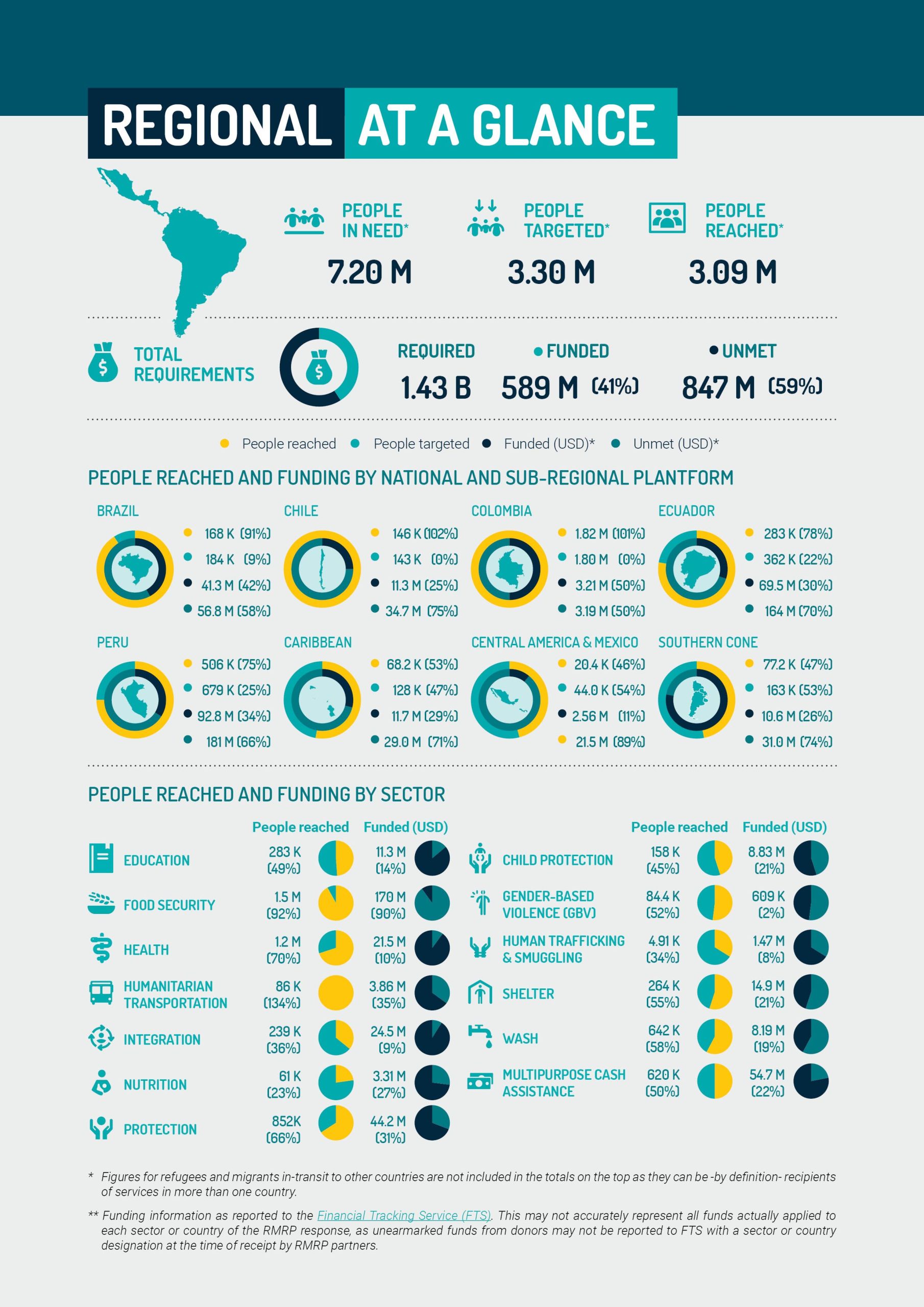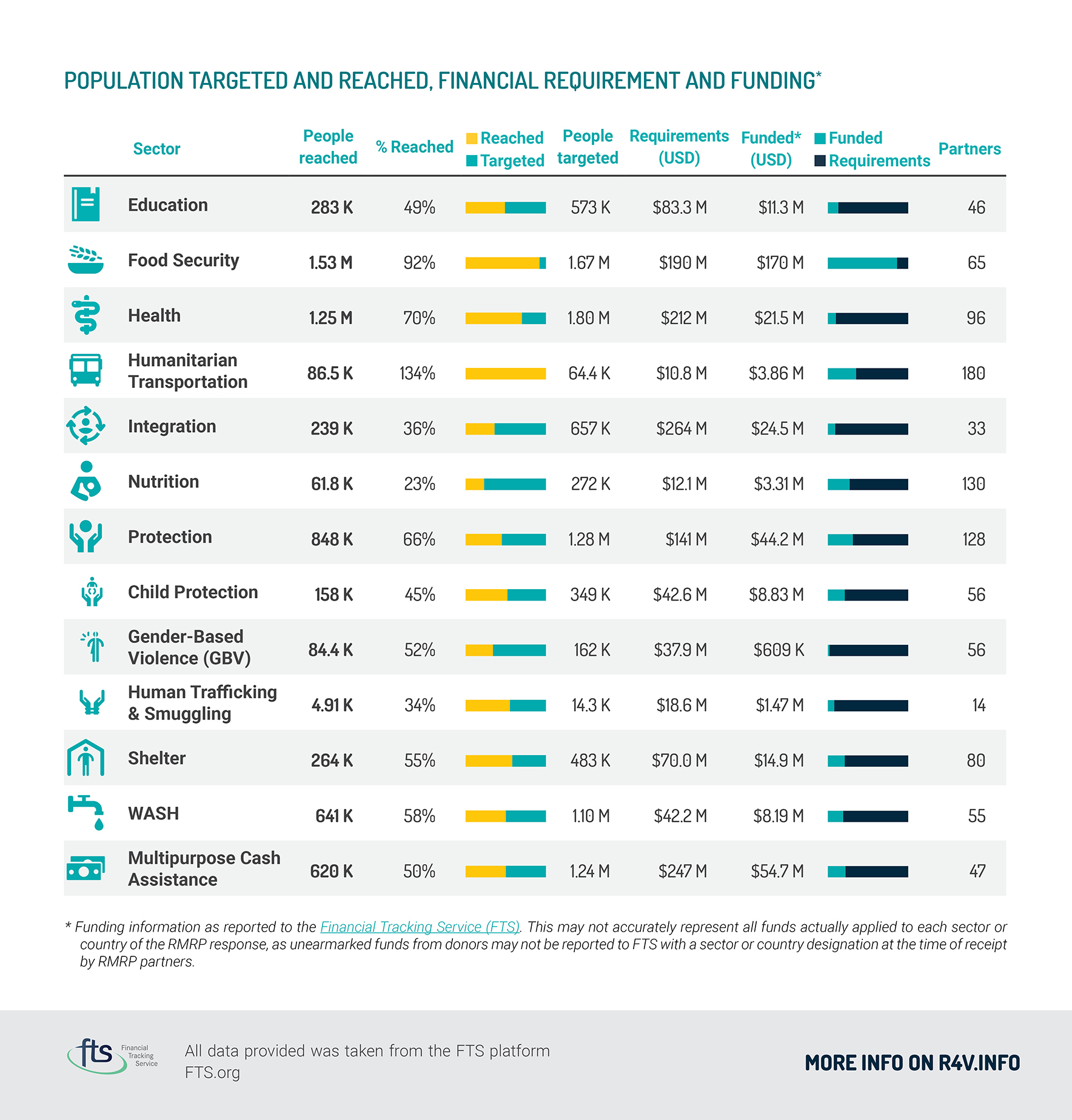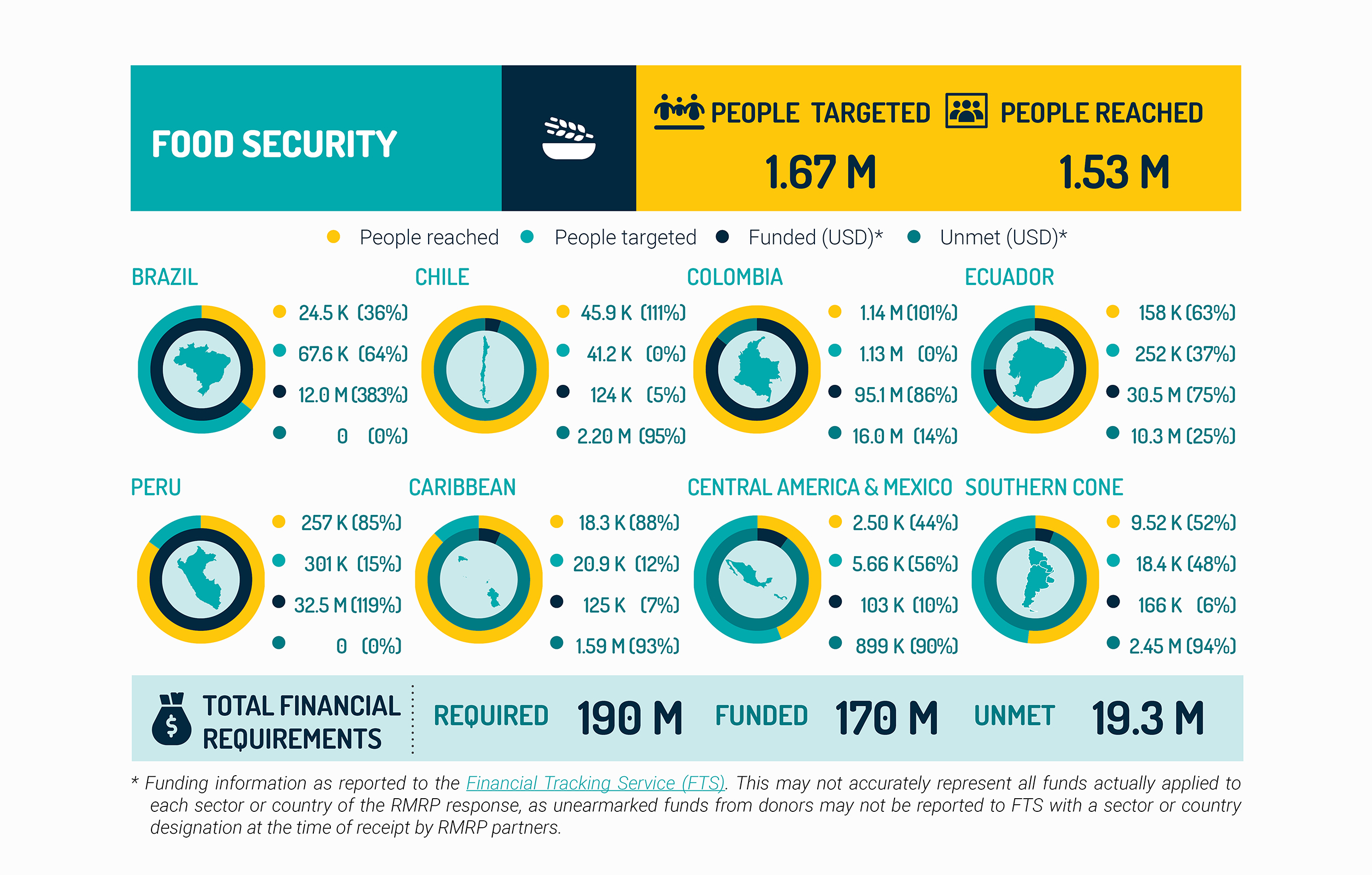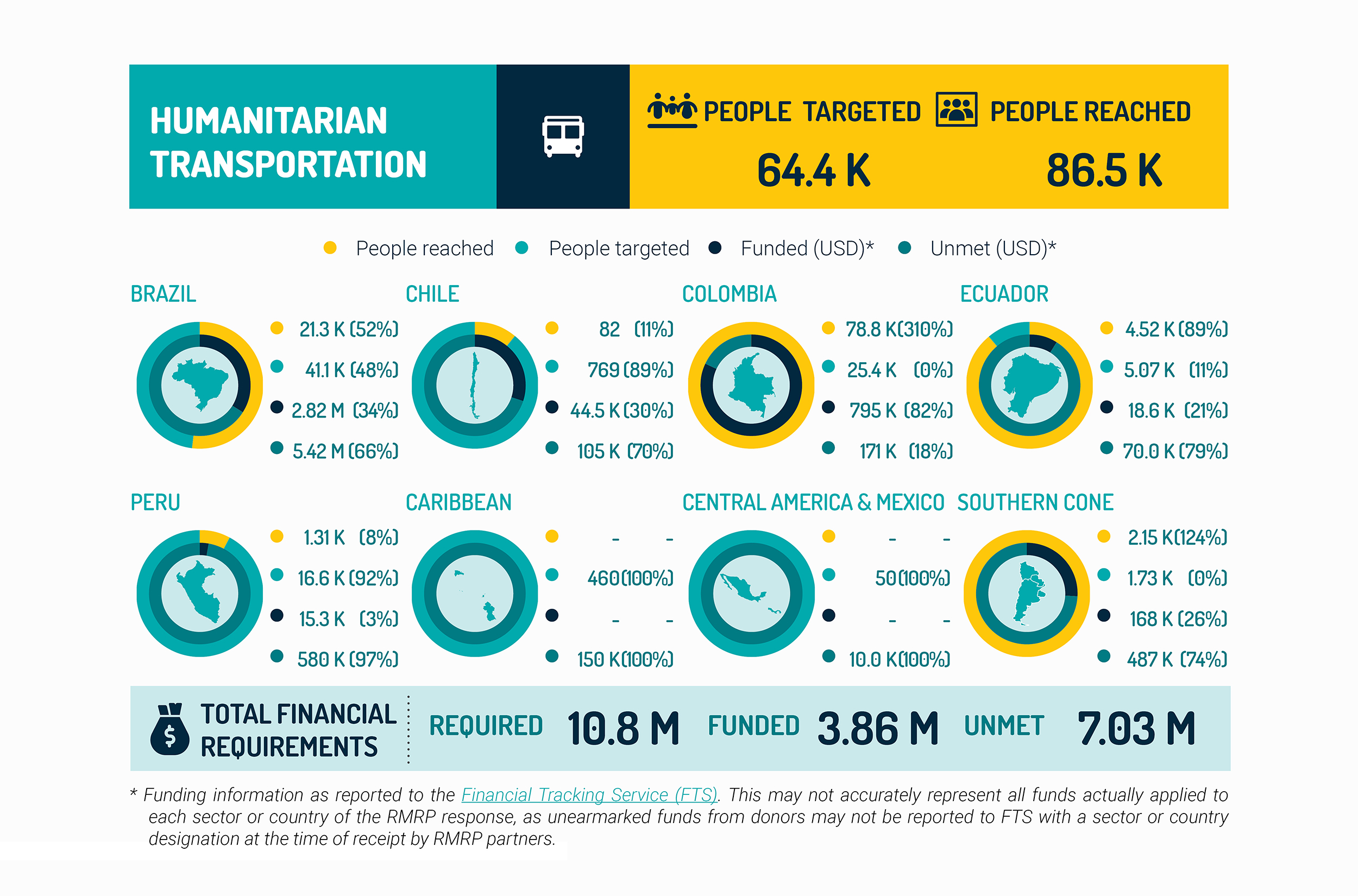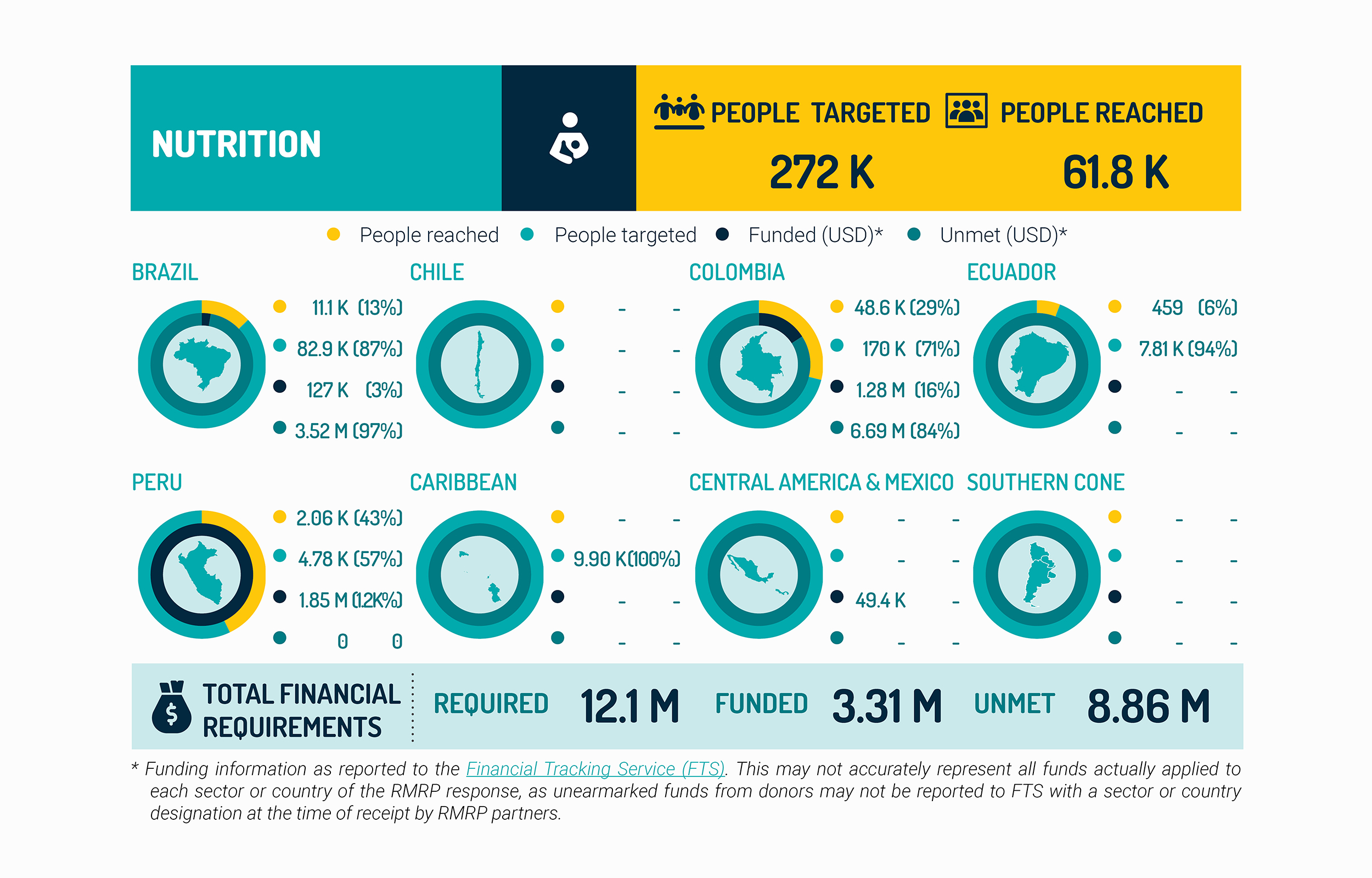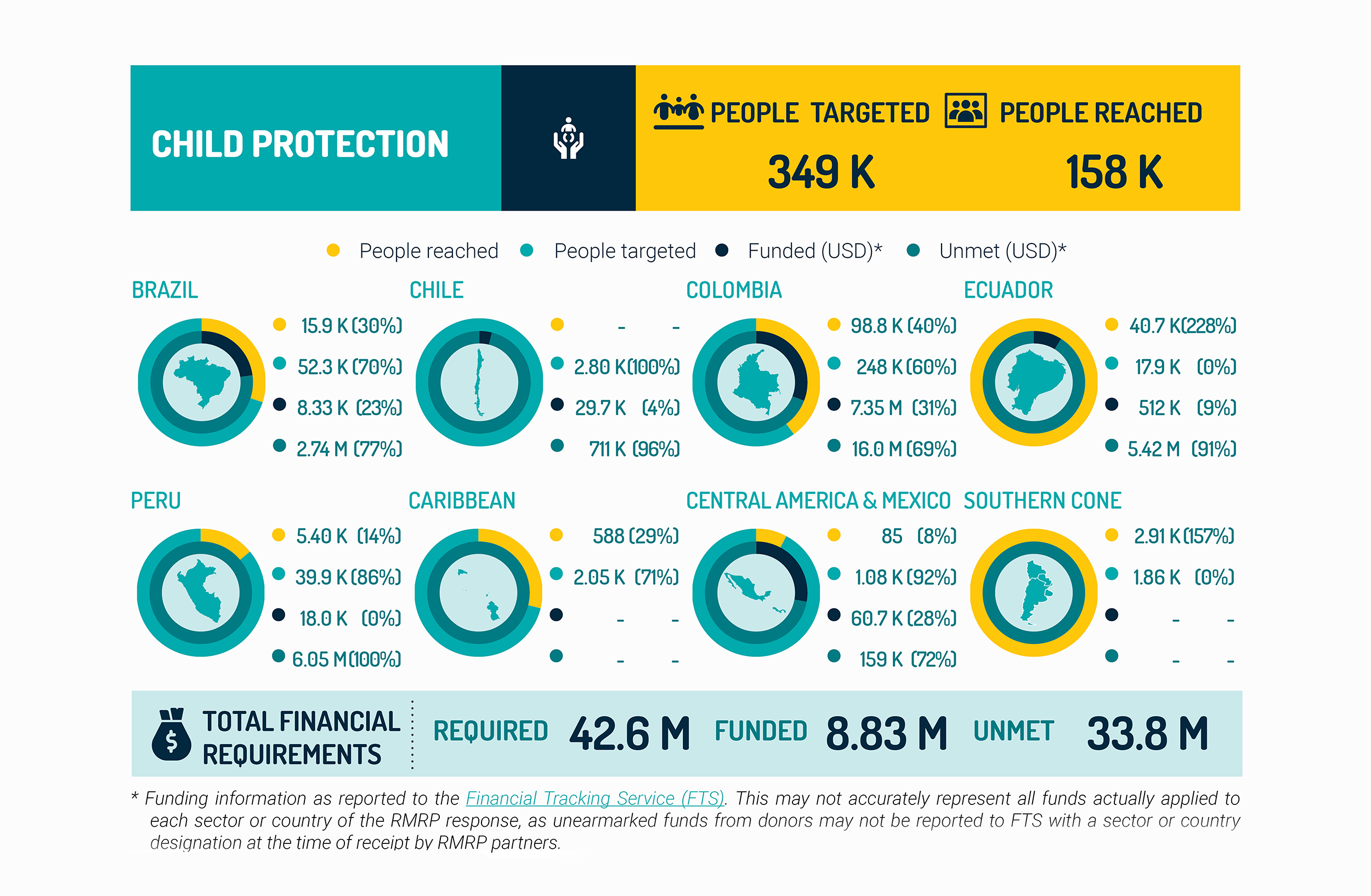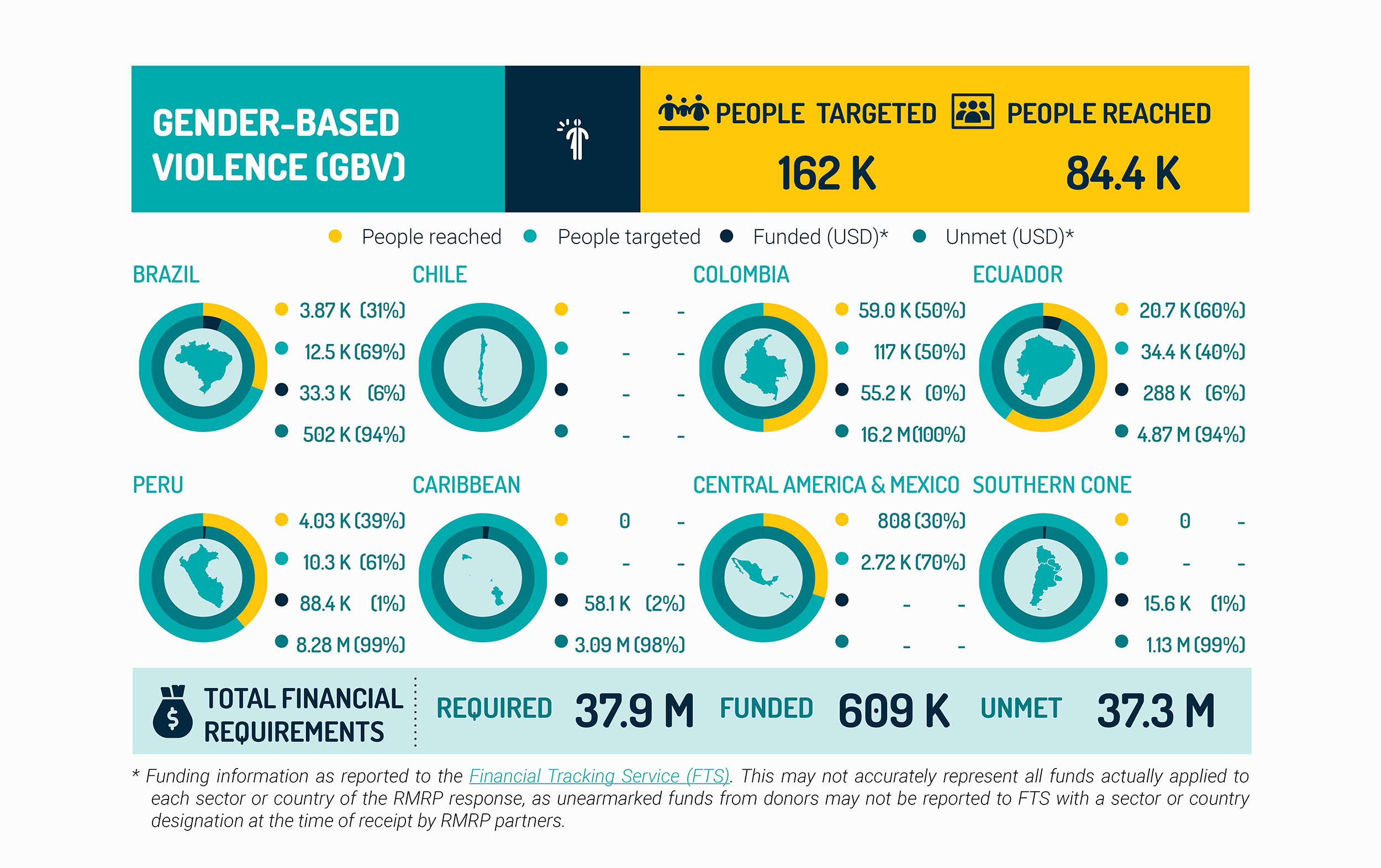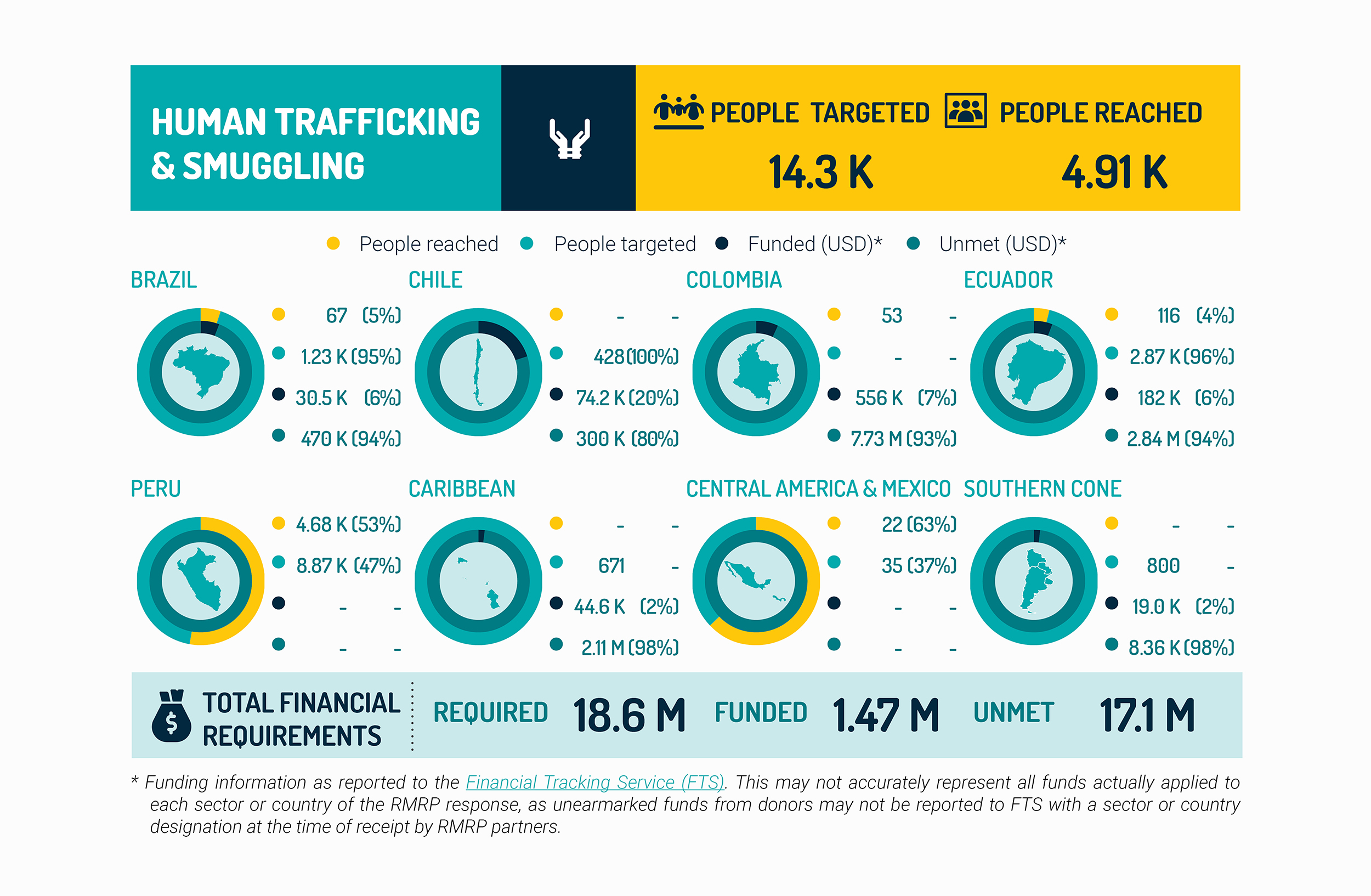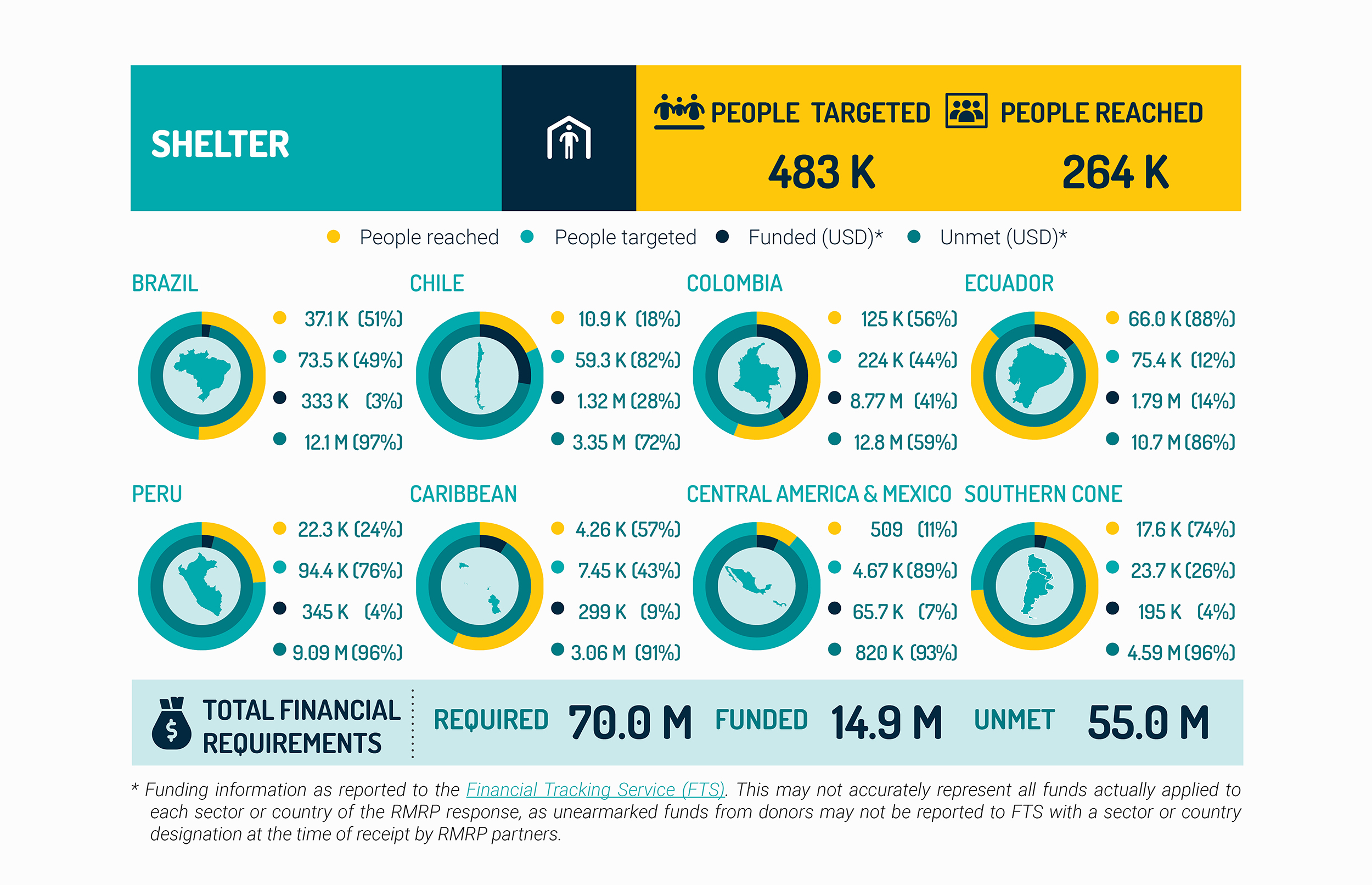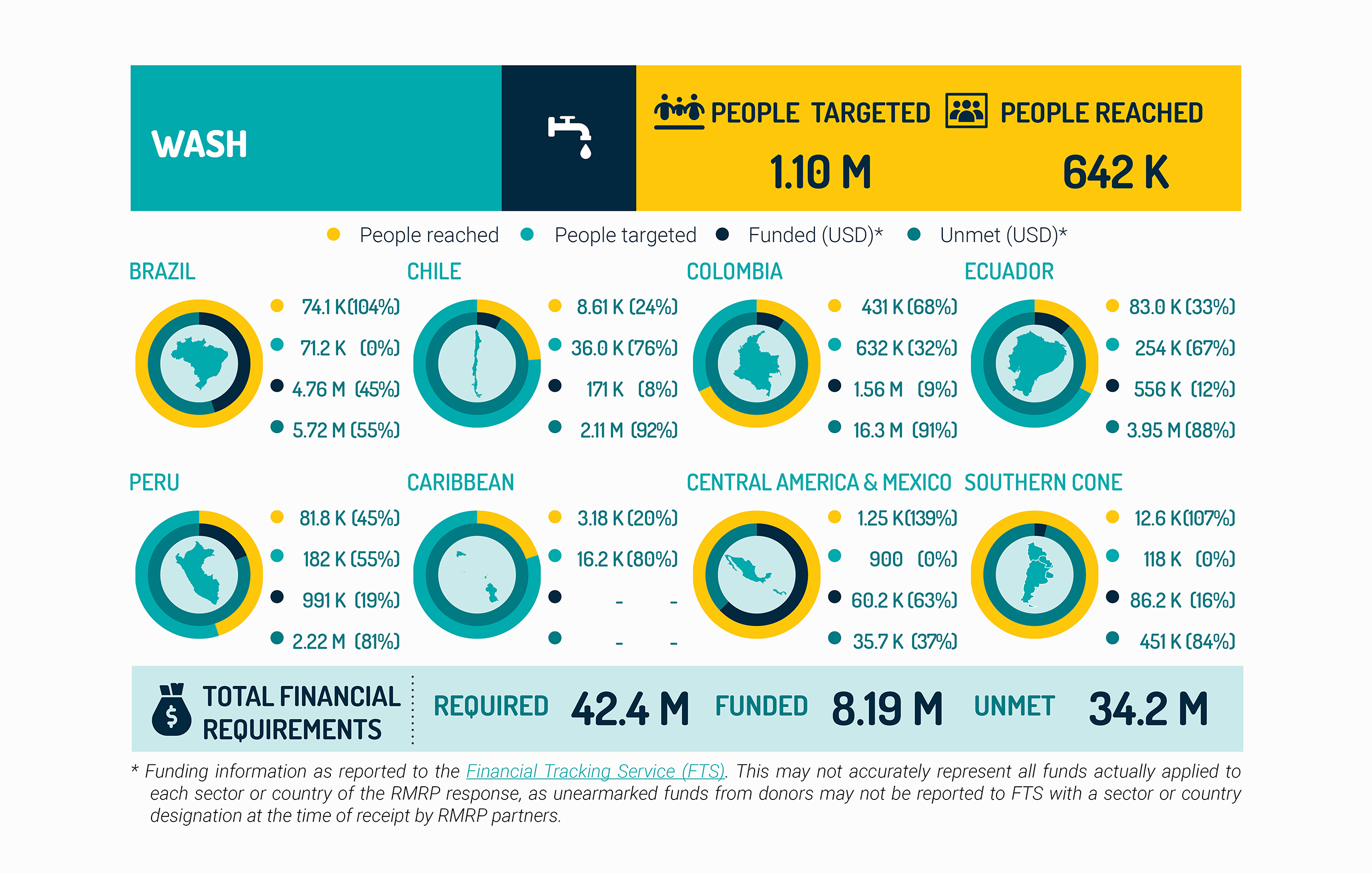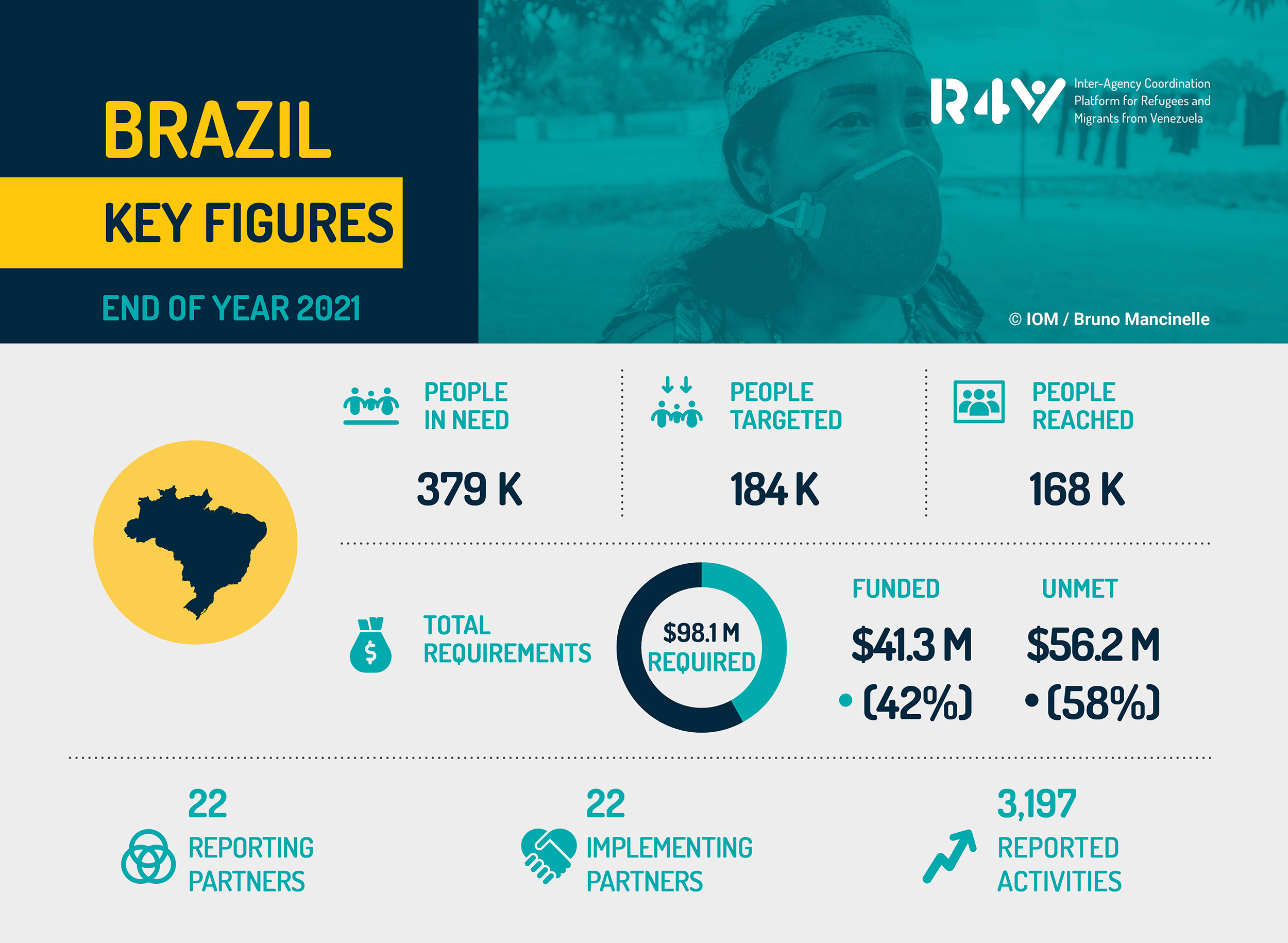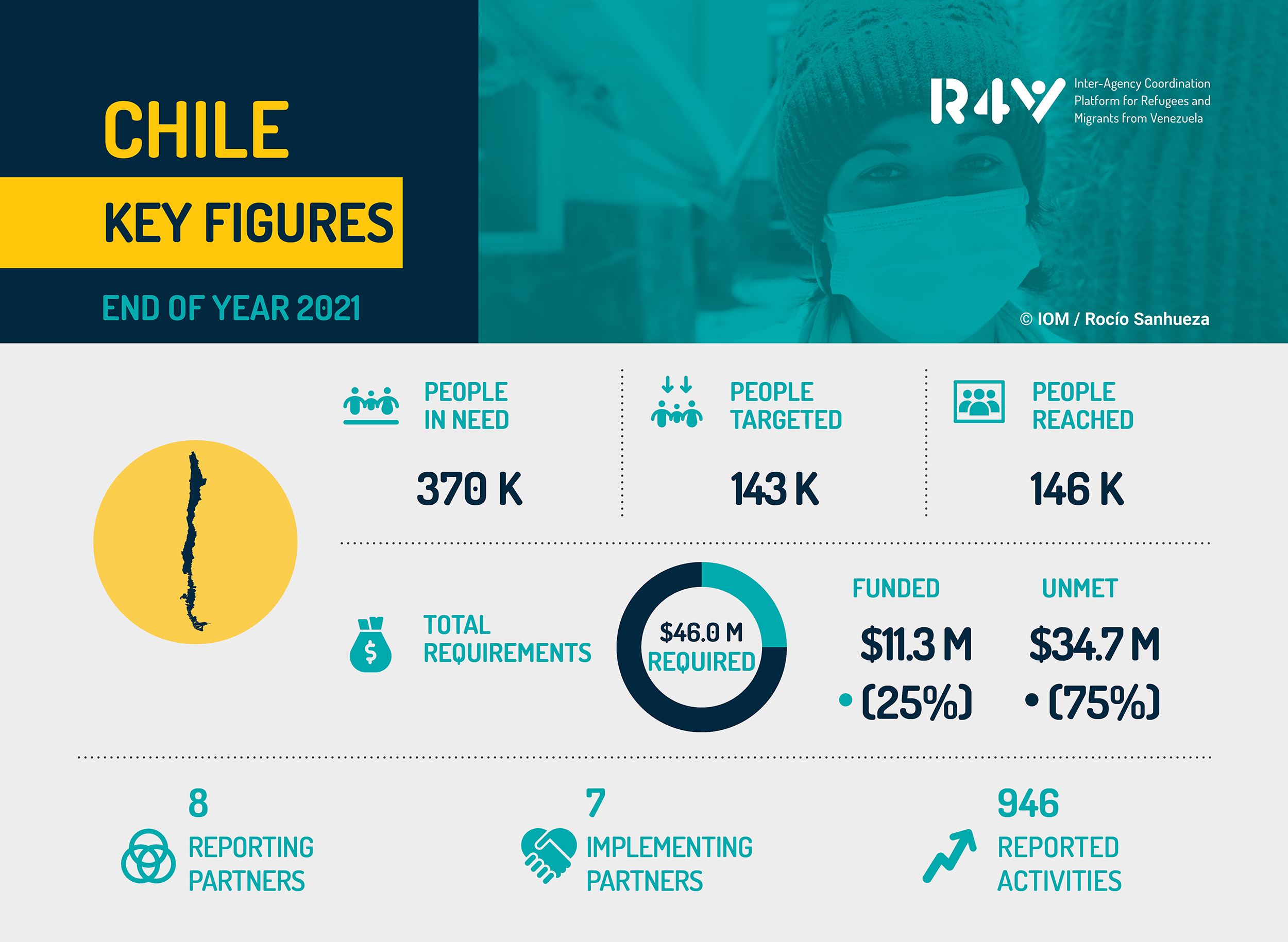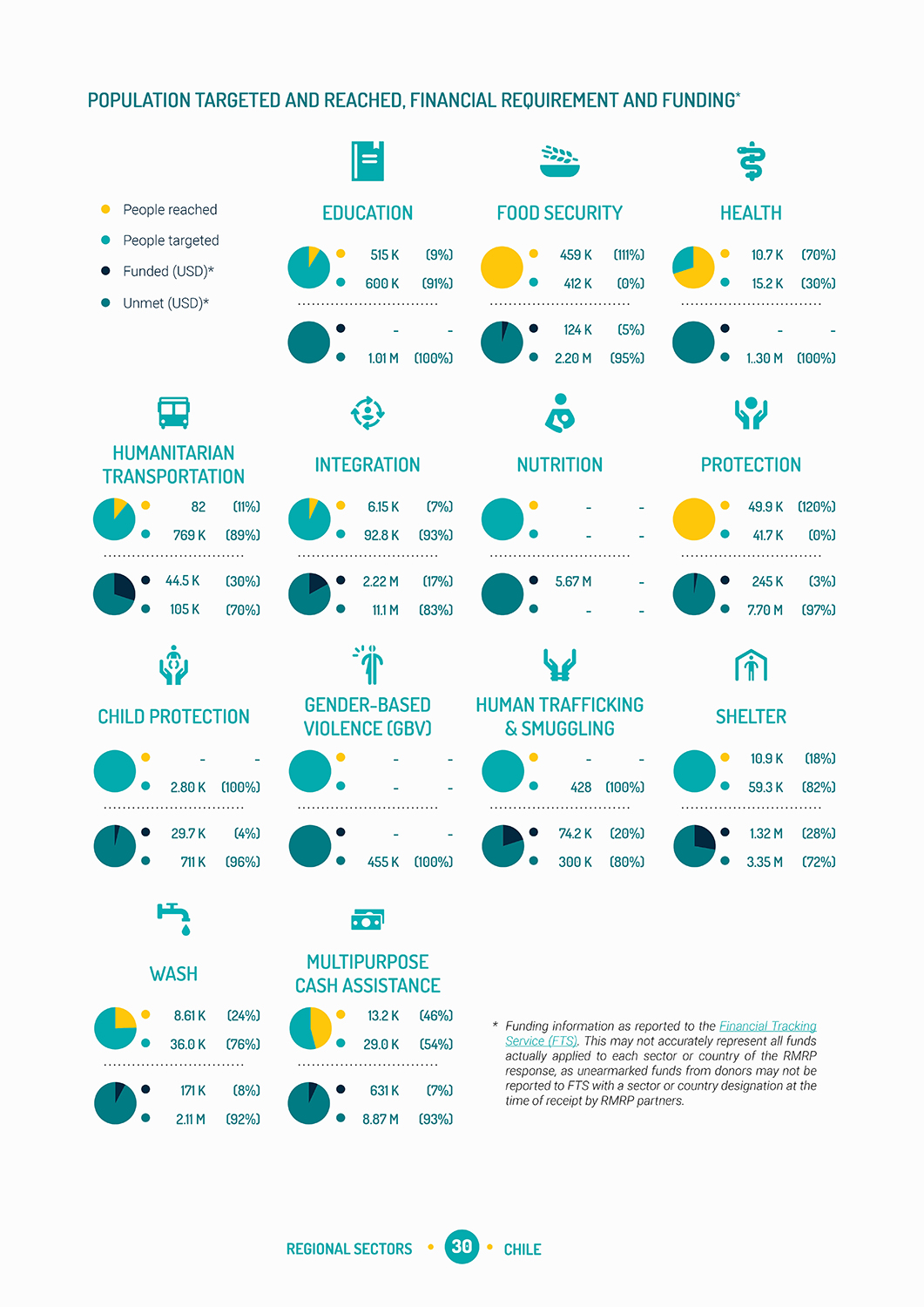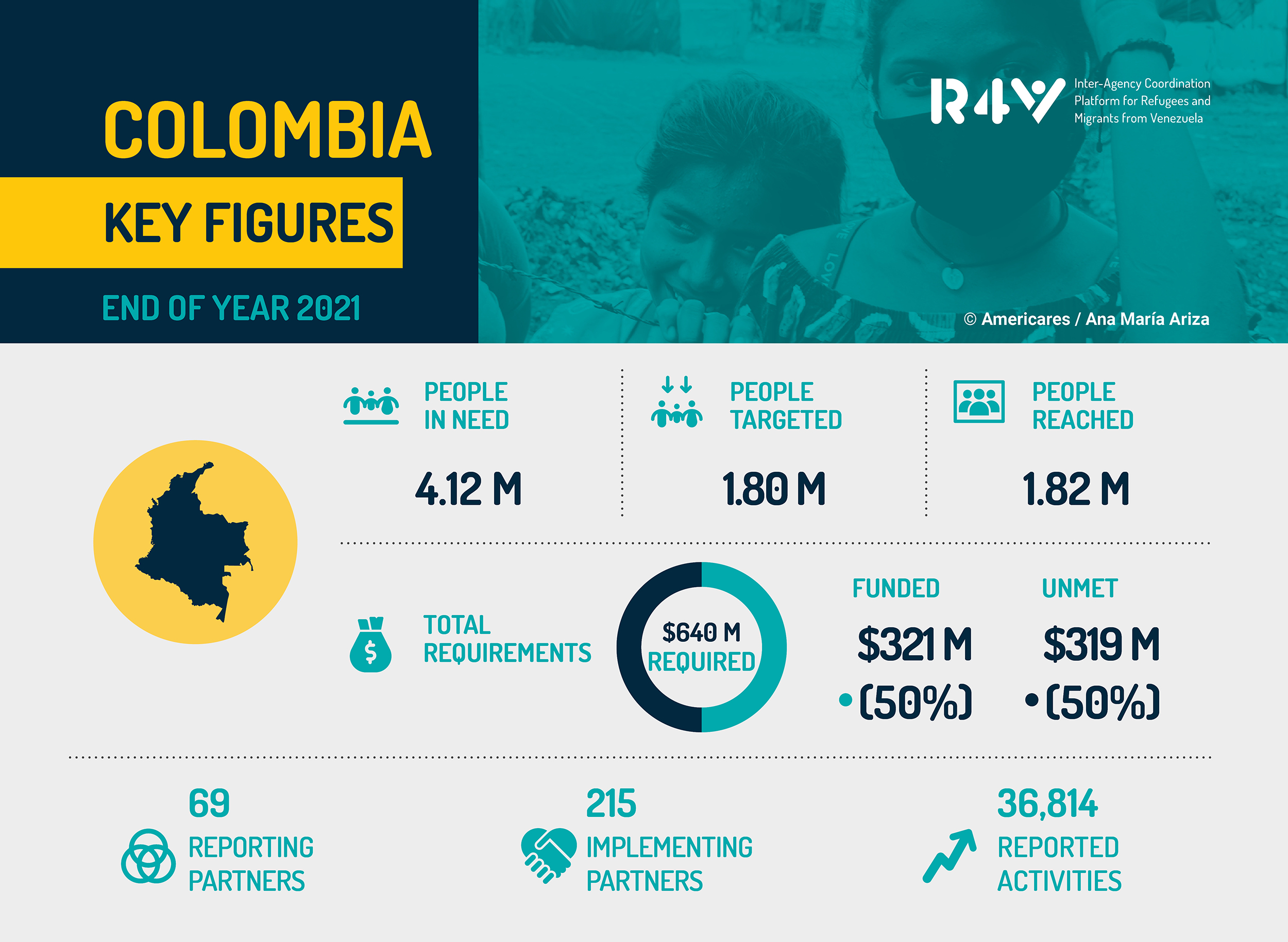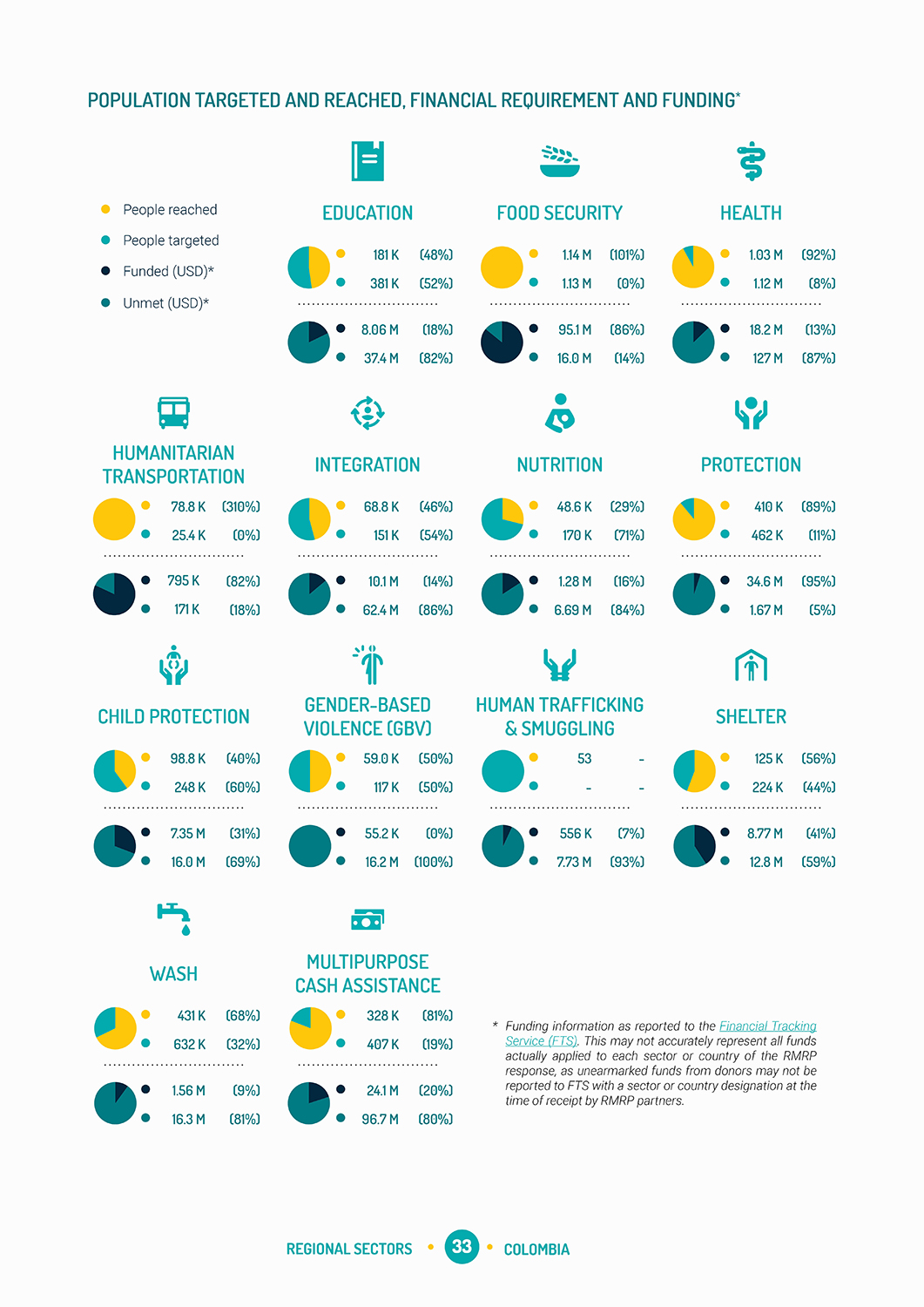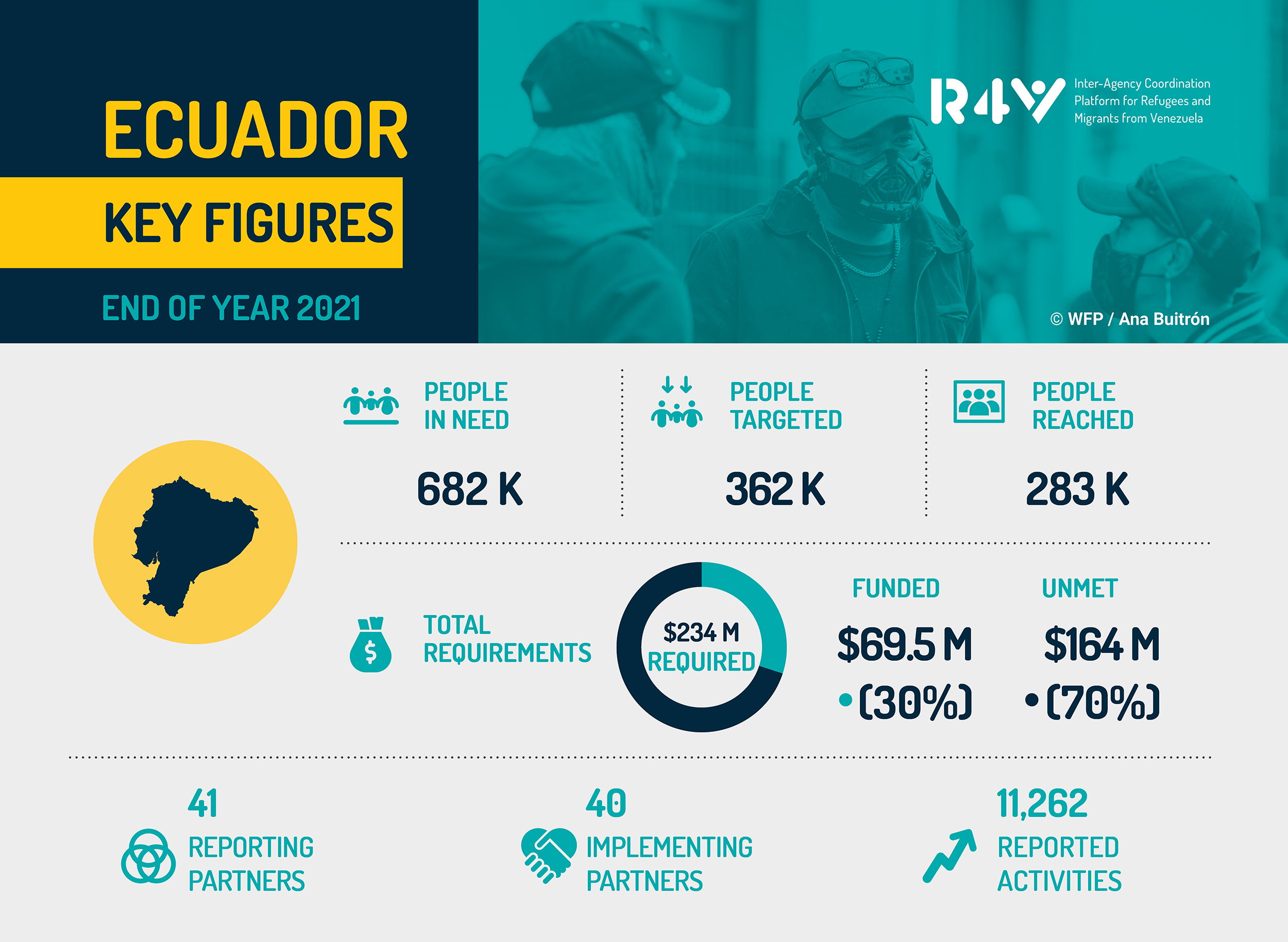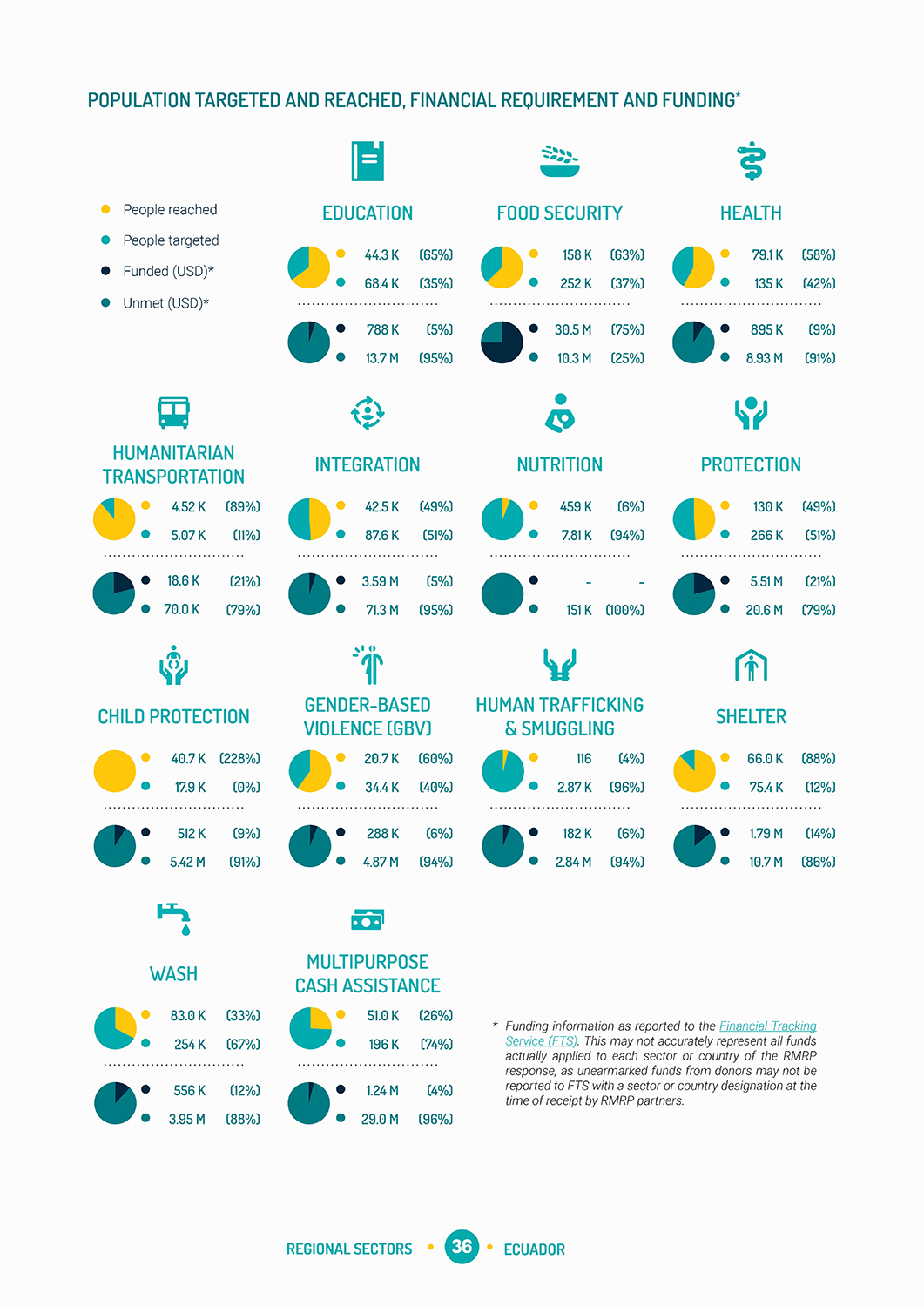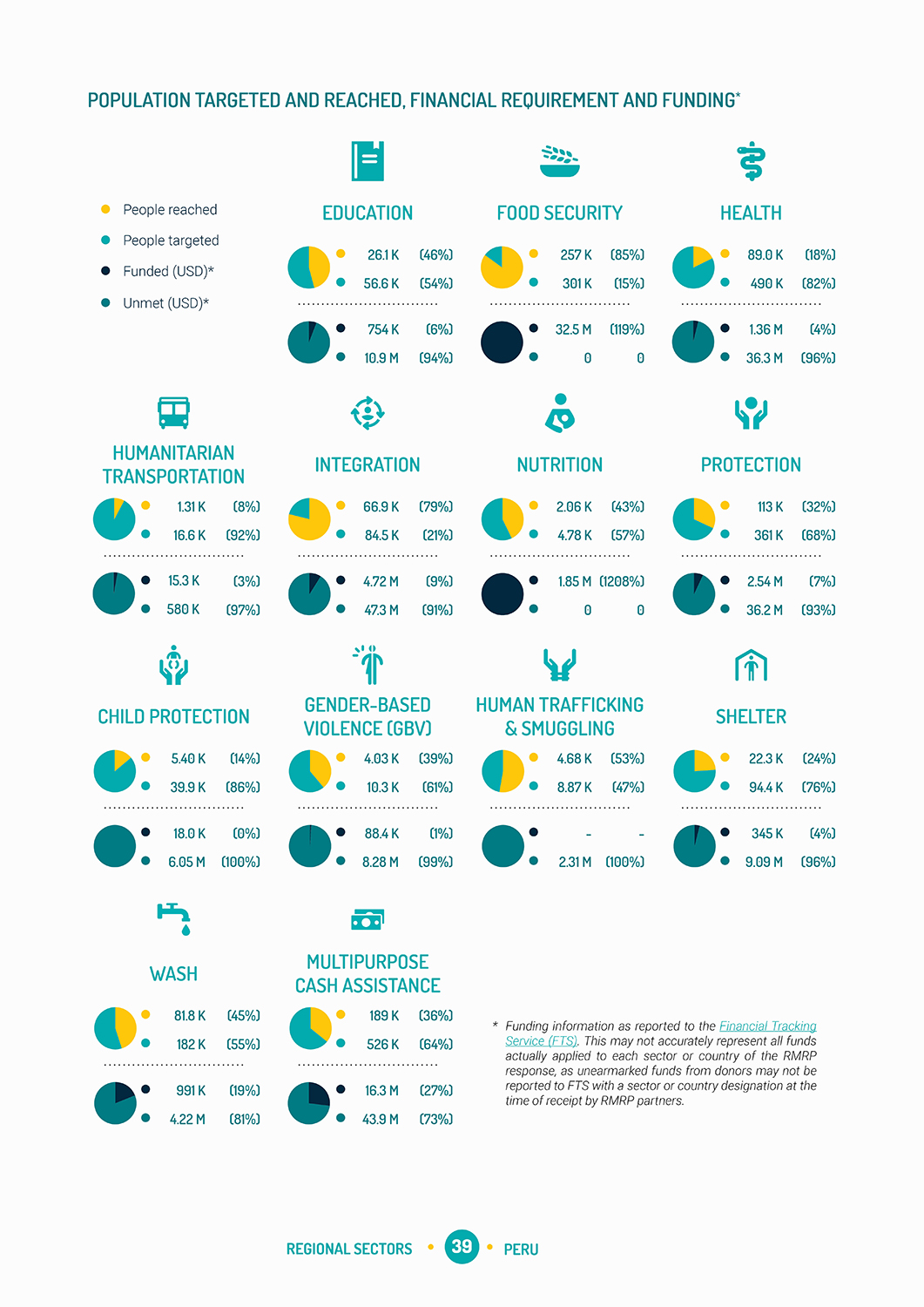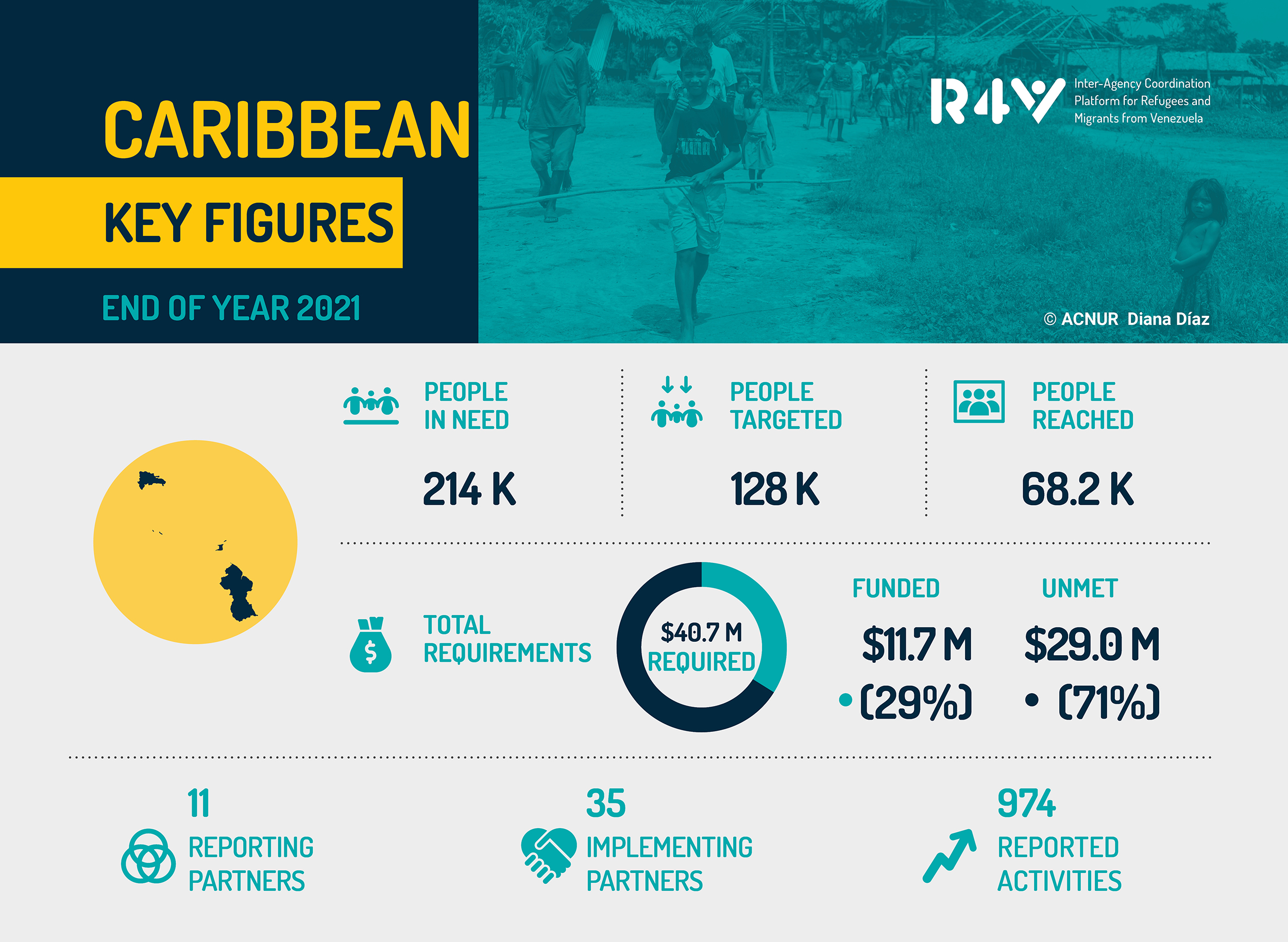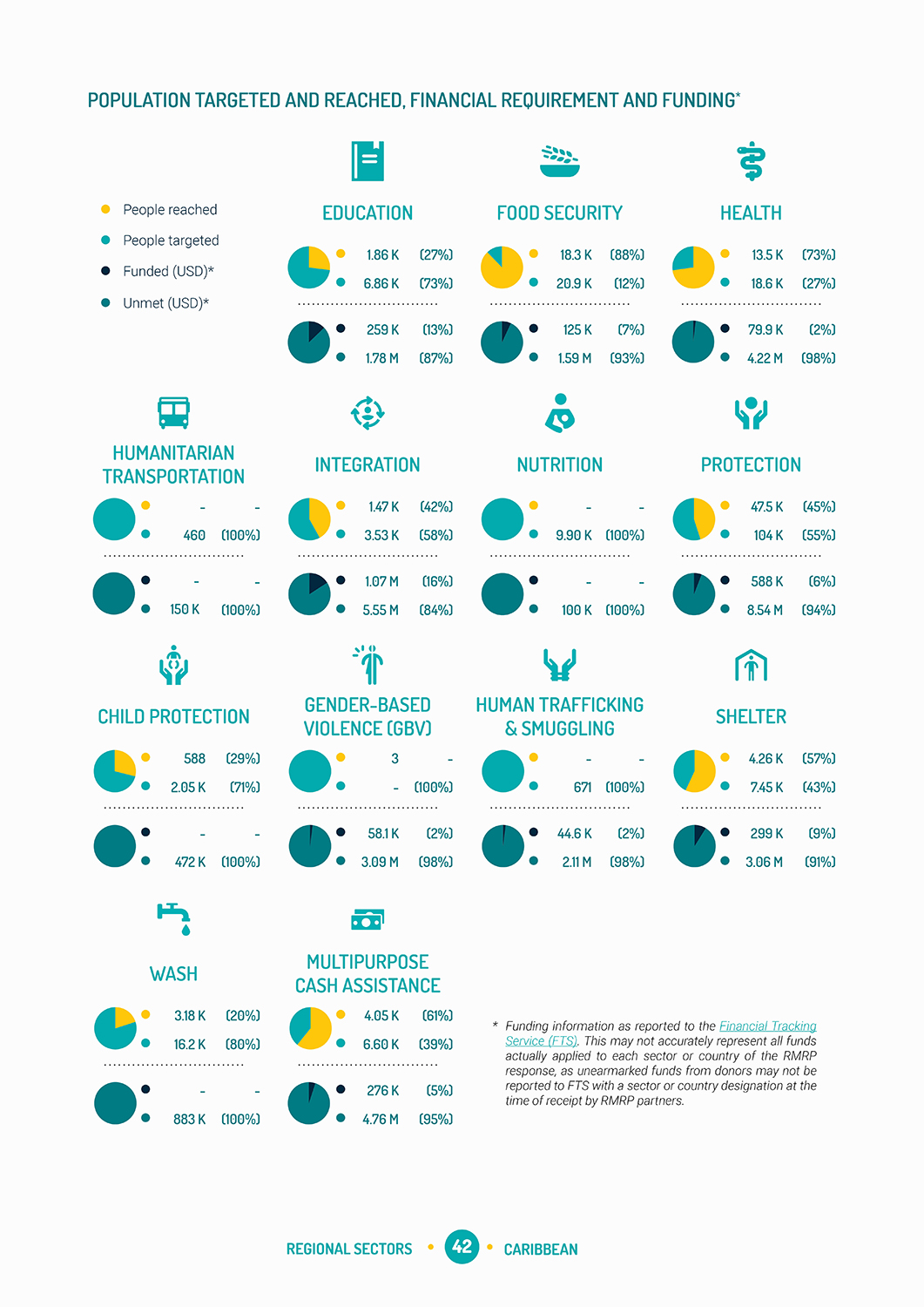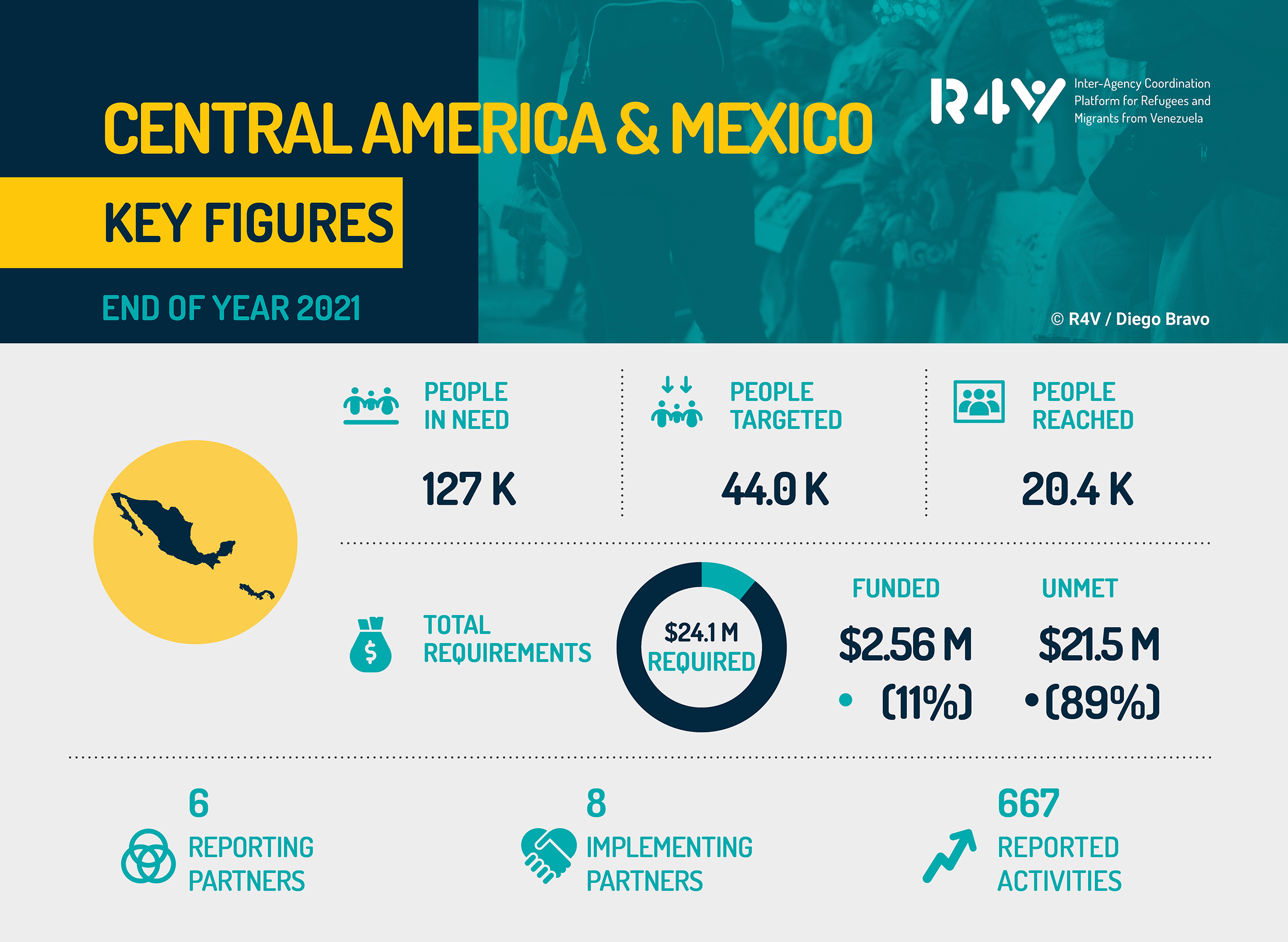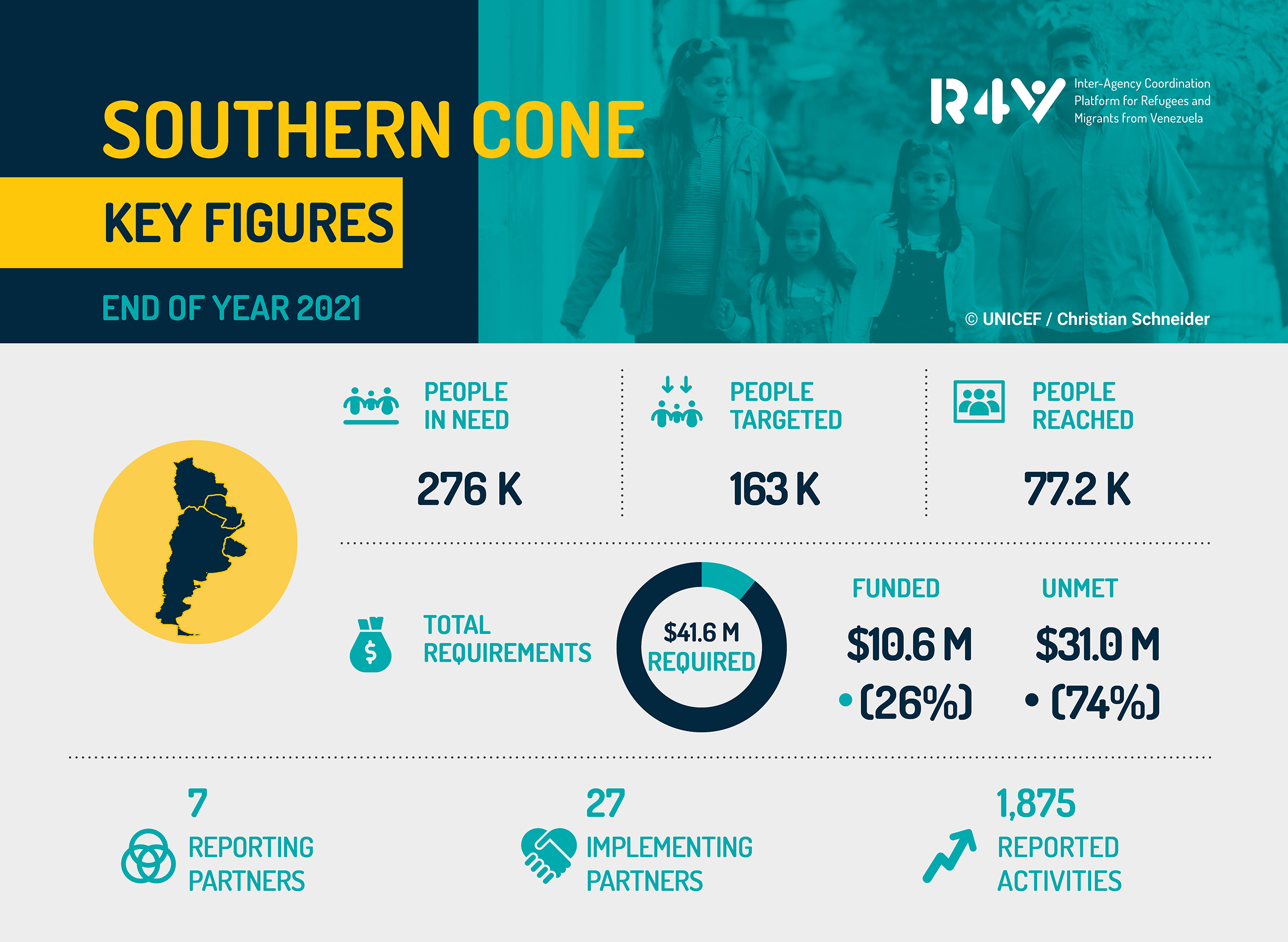RMRP 2021 End-Year Report
“The 192 partners of the R4V Regional Platform are working tirelessly in a daunting context. Refugees and migrants from Venezuela struggle to find stability and a new place to call home and they continue to need the support of the international community.
The 2021 End-Year Report reflects how the lack of funding can increase vulnerabilities and risks, at a time when it is crucial that refugees and migrants have greater access to regularization, documentation, protection and socio-economic integration. We have seen great efforts by some governments in the region with regularization and integration policies, inclusion in COVID-19 vaccination campaigns, and the involvement of international financial institutions in making the Donor’s Conference a success.
It is crucial that all these developments continue, as today more than ever there are unique opportunities to invest in inclusion and community development that benefit not only refugees and migrants, but also host communities.
The growth and prosperity of Latin America and the Caribbean are linked to the successful integration of refugees and migrants from Venezuela.”
Results of implementation of the RMRP in 2021
PEOPLE REACHED
In 2021, more than 3 million refugees and migrants from Venezuela and the communities hosting them received assistance from organizations working in partnership through the R4V Inter-Agency Coordination Platform to carry out activities of the Regional Refugee and Migrant Response Plan (RMRP). A total of 159 different UN Agencies, NGOs, academia and civil society organizations – including numerous Venezuelan refugee and migrant-led organizations – participated as appealing partners in the RMRP 2021 to support Venezuelan refugees and migrants.
The R4V is the largest regional inter-agency refugee and migrant response in the world, in terms of the geographic scope of the response, covering 17 countries in Latin America and the Caribbean.
Click on a country and/or sector in the interactive map below to see RMRP partners’ implementation in 2021.
FUNDING OF THE RMRP 2021
Working Groups and Cross-Cutting Themes
©R4V/ Enrique Castro-Mendevil.
CASH WORKING GROUP
In 2021, cash and voucher assistance (CVA) accounted for 42% of all people reached by the R4V response.
ENVIRONMENT
In the planning of the RMRP 2021, efforts were redoubled to integrate environmental considerations into project design.
PSEA
The pandemic and its consequences redoubled the need for efforts to promote protection from sexual exploitation and abuse (SEA) of refugees and migrants.
SUPPORT SPACES
A total of 206 Support Spaces were implemented in eight countries in 2021: Argentina, Bolivia, Brazil, Chile, Colombia, Ecuador, Peru and Uruguay.
AAP/CwC/C4D
Since 2021, Accountability to Affected Populations (AAP) and Communication with Communities (CwC) focal points coordinated to encourage collective approaches and initiatives.
COMMUNICATIONS
During 2021, the Communications Working Group focused on anti-xenophobia campaigns, promoting integration for refugees and migrants, and improving R4V’s visibility.
Information on R4V, the RMRP and partner organizations
What is R4V?
In April 2018 the UN Secretary-General directed IOM and UNHCR to coordinate the regional response to the situation of refugees and migrants from Venezuela. As a result, the Inter-Agency Coordination Platform for Refugees and Migrants from Venezuela (R4V) was established as a forum to coordinate the response efforts across 17 countries of Latin America and the Caribbean.
What is the RMRP?
The Regional Refugee and Migrant Response Plan (RMRP) was first developed in 2018 as a strategic regional response plan and advocacy tool to support country and sub-regional operations and to ensure the most pressing humanitarian, protection and integration needs of refugees and migrants from Venezuela, as well as those of host communities, were met.
Since its first iteration, the RMRP has served to mobilize some USD 1.55 billion to bring about positive change to the lives of vulnerable refugees and migrants from Venezuela as well as affected host communities, while strengthening national capacities of public institutions, also through the convening of the donor community in three International Donors’ Conferences (in 2019, 2020 and 2021).
NATIONAL/SUB-REGIONAL DOWNLOADS
SECTORIAL DOWNLOADS
RMRP 2021 partner organizations
100% Diversidad y Derechos
ACAPS
Acción contra el Hambre
Adventist Development and Relief Agency (ADRA)
AID FOR AIDS
Alianza por la Solidaridad
Americares Foundation
Asociación Civil Venezolana en Paraguay
Asociación Construyendo Caminos de Esperanza Frente a la Injusticia, el Rechazo y el Olvido (CCEFIRO)
1Asociación de Apoyo al Desarrollo APOYAR
Asociación de Jubilados y Pensionados Venezolanos en Argentina
Asociación de venezolanos en la República argentina (ASOVEN)
Asociación ILLARI-AMANECER
Asociación Manos Veneguayas
Asociación Mutual Israelita Argentina
Asociación Profamilia
Asociación Venezolana en Chile
Ayuda en Acción
Bethany Christian Services
Blumont
CAM
CARE
Cáritas Alemania
Caritas Brazil
Caritas Ecuador
Caritas Manaus
Caritas Rio de Janeiro
Caritas São Paulo
Caritas Switzerland
Center for Integrated Studies and Programs for Sustainable Development (CIEDS)
Center for Migration and Human Rights of the Diocese of Roraima (CMDH)
Centro de Atencion Psicosocial (CAPS)
Centro de Estudios y Solidaridad con América Latina (CESAL)
Cesvi
ChildFund Internacional
Churún Merú Association
Colonia Foundation of Venezuelans in the Dominican Republic (FUNCOVERD)
Comisión Argentina para Refugiados y Migrantes (CAREF)
Comité Internacional para el Desarrollo de los Pueblos (CISP)
Comité permanente por la defensa de los derechos humanos (CDH)
Compassiva
Consejo Interreligioso del Perú – Religiones por la Paz
COOPI – Cooperación Internacional
Cruz Roja Argentina
Cruz Roja Colombia
Cruz Roja Ecuador
Cuso Internacional
Danish Refugee Council (DRC)
Deutsche Gesellschaft für Internationale Zusammenarbeit (GIZ)
Diakonie Katastrophenhilfe
Diálogo Diverso
Dominican Institute for Integrated Development
Duendes y Ángeles Foundation
Famia Planea
Federación Luterana Mundial
Foro Salud Callao
Foundation of the Americas (FUDELA)
Foundation of Venezuelan Emigrants (FEV)
Fundación Alas de Colibrí
Fundación AVSI
Fundación Comisión Católica Argentina de Migraciones (FCCAM)
Fundación CRISFE
Fundación FIDAL
Fundación Halü Bienestar Humano (HALU)
Fundación Scalabrini Bolivia
Fundación SES
Fundación Tarabita
Globalizate Radio
Guarulhos Human Rights Defense Center (CDDH)
Heartland Alliance International (HAI)
Hebrew Immigrant Aid Society (HIAS)
HELVETAS Swiss Intercooperation
Human Rights Defence Curaçao
Humanity & Inclusion
Humans Analytic
I know my rights
iMMAP
IMPACT Initiatives (REACH)
Inmigrante Feliz Association
Institute for Migration and Human Rights (IMDH)
Instituto Félix Guattari
International Federation of the Red Cross (IFRC)
International Labour Organization (ILO)
International Organization for Migration (IOM)
International Rescue Committee (IRC)
INTERSOS
IPANC
Jesuit Service for Migrants and Refugees (JSMR)
Joint United Nations Programme on HIV/AIDS (UNAIDS)
Kimirina
Latin American Network of Non-Governmental Organizations of Persons with Disabilities and their Families (RIADIS)
LGBT+ Movement Brazil
Malteser International
MedGlobal
Medical Teams International
Médicos del Mundo
Mercy Corps
Mirares
Misión Scalabriniana – Ecuador
Nice Institute
Norwegian Refugee Council (NRC)
Organización de Estados Iberoamericanos para la Educación, la Ciencia y la Cultura (OEI)
Organización de las Naciones Unidas para la Alimentación y la Agricultura (FAO)
Organización Fuerza Internacional de Capellanía DDHH y DIH OFICA ICC
OXFAM
Panamerican Development Foundation (FUPAD)
Panamerican Health Organization/World Health Organization (PAHO/WHO)
Parroquia Ntra Sra Asunción y Madre de los Migrantes
Pastoral de Movilidad Humana – Conferencia Episcopal Peruana
Peace for Development
Plan International
Project HOPE
Red de Investigaciones Orientadas a la Solución de Problemas en Derechos Humanos (RIOSP DDHH)
Red regional LGTBI+
RET International
Salú pa Tur Foundation
Samaritan’s Purse
Save the Children International (SCI)
Scalabrini International Migration Network
Sección Peruana de Amnistía Internacional
Servicio Jesuita a Migrantes (SJM)
Servicio Jesuita a Refugiados (SJR)
Solidarites International/Premiere Urgence Internationale (Consorcio de SI y PUI)
SOS Children’s Villages
SPM – Serviço Pastoral dos Migrantes Nacional
SPM-NE – Serviço Pastoral dos Migrantes do Nordeste
Stichting Slachtofferhulp Curaçao
Stima Foundation
Swisscontact
Tearfund
Terre des hommes Lausanne
United Nations Children’s Fund (UNICEF)
United Nations Development Programme (UNDP)
United Nations Educational, Scientific and Cultural Organization (UNESCO)
United Nations Entity for Gender Equality and the Empowerment of Women (UNWOMEN)
United Nations High Commissioner for Refugees (UNHCR)
United Nations Office for Project Services (UNOPS)
United Nations Office of the High Commissioner for Human Rights (OHCHR)
United Nations Office on Drugs and Crime (UNODC)
United Nations Population Fund (UNFPA)
United Nations Programme for Human Settlements (UN Habitat)
Universidad Católica del Uruguay (UCU)
Vale da Benção Educational and Charitable Association (AEBVB)
VenAruba Solidaria
VenEuropa
Venex Curacao Foundation
Vicaría de Pastoral Social Caritas
War Child
World Council of Credit Unions
World Food Programme (WFP)
World Vision (WV)
ZOA
We World GVC
Sesame Workshop
Servicio Ecuménico para la Dignidad Humana
Fundación de Ayuda Social de Las Iglesias Cristianas
Cruz Roja Uruguay
Cruz Roja Perú
AsociacIón Misioneros de San Carlos Scalabrinianos
Regional Overview
In 2021, more than 3 million refugees and migrants from Venezuela and the communities hosting them received assistance from organizations working in partnership through the R4V Inter-Agency Coordination Platform to carry out activities of the Regional Refugee and Migrant Response Plan (RMRP). A total of 159 different UN Agencies, NGOs, academia and civil society organizations – including numerous Venezuelan refugee and migrant-led organizations – participated as appealing partners in the RMRP 2021 to support Venezuelan refugees and migrants.
The R4V is the largest regional inter-agency refugee and migrant response in the world, in terms of the geographic scope of the response, covering 17 countries in Latin America and the Caribbean.
Although many countries of the region continued with closed borders and travel restrictions due to the COVID-19 pandemic, the needs faced by vulnerable women, men, girls and boys from Venezuela compelled them to cross borders in search of safety, dignity and rights and to satisfy humanitarian, protection and integration needs. By the end of 2021, there were more than 6 million refugees and migrants from Venezuela in the world, almost 5 million of whom were hosted by countries in Latin America and the Caribbean.
Border closures and travel restrictions meant that growing numbers of refugees and migrants in 2021 were forced to use irregular travel routes, where they faced hazards from inclement weather and harsh terrain, as well as risks from human traffickers and smugglers, including physical and sexual violence, extortion, robbery, kidnapping, forced recruitment and other forms of harm. There were limitations on access to territory, asylum and registration procedures, documentation, rights and services. Refugees and migrants were also harder-hit by socio-economic impacts of the COVID-19 pandemic, saw larger reductions in their household income, had higher rates of forced evictions and homelessness, and encountered more barriers to access social support programs than their local counterparts.
Because of this, the work of RMRP partner organizations was essential, to provide services and assistance to refugees and migrants from Venezuela to reduce their vulnerability, mitigate their risks, help connect them to social support programmes and guarantee effective access to national protection systems, and overall promote their protection and integration.
One of the main needs identified by refugees and migrants from Venezuela across the region in 2021 was food insecurity. In response, R4V Food Security Sector partners provided food assistance to more than 1.5 million refugees and migrants as well as vulnerable members of host communities. Warm meals were served at shelters, food baskets were distributed at reception facilities, and partners provided cash and voucher assistance (CVA) so that families could make their own choices about household food purchases and support local economies and markets in the process.
R4V Nutrition Sector partners focused on addressing the particular nutrition needs of pregnant and lactating women and children under the age of five, to prevent and treat acute malnutrition, providing micronutrient tablets and supplements, and training to support culturally appropriate healthy feeding practices and breastfeeding for infants, in cooperation with local and national authorities and other sectors.
In the middle of the ongoing global health emergency, R4V Health Sector partners were on the front lines of the response to the COVID-19 pandemic for refugees and migrants from Venezuela. Thanks to advocacy and operational support from R4V partners to government health systems across the region, refugees and migrants were included in national COVID-19 vaccination plans, with R4V partners in some countries directly facilitating the application of vaccines to Venezuelan refugees and migrants, while partners in other countries provided medicines, equipment, and operational support to public health systems. R4V partners supported more than 1.2 million Venezuelans and members of host communities to access health systems to receive necessary care, medicines and other life-saving treatment.
Venezuelans received drinking water and had access to restrooms, showers, sanitation facilities and hygiene items thanks to R4V WASH Sector partners, who installed and maintained critical sanitation infrastructure, including at border crossings, in shelters, reception centres, and Support Spaces throughout the region, and distributed personal protective equipment (PPE), hygiene kits and menstrual hygiene items to thousands of vulnerable refugees and migrants.
Providing shelter to refugees and migrants otherwise in danger of homelessness was another key area of the RMRP response, especially with so many vulnerable individuals and families facing eviction or with difficulty finding stable housing in the middle of the COVID-19 pandemic. More than 260,000 refugees and migrants from Venezuela and members of vulnerable host communities received support from R4V Shelter Sector partners in 2021. Partners opened new shelters, expanded and improved existing facilities (including to comply with COVID-19 protocols) and provided rental support through CVA for vulnerable households, supporting their access to longer-term shelter solutions.
R4V Protection Sector partners worked to reduce refugees and migrants’ vulnerability to threats of violence, exploitation and abuse, and increased their access to national protection systems through documentation, registration, regularization and legal stay alternatives, especially for those otherwise in irregular situations. Protection partners reached over 852,000 Venezuelans and members of host communities with support in 2021, including through activities such as assisting with birth registration of children born to Venezuelan parents, providing differentiated support for members of indigenous communities, engaging in anti-xenophobia campaigns together with host communities, providing legal assistance and counselling to access regularization and asylum procedures, and data collection on disproportionate impacts of key protection risks among population groups. Protection partners staffed a total of 206 Support Spaces for Venezuelans throughout the region, where refugees and migrants received holistic assistance from intersectoral actors to provide comprehensive support. Partners in the Sub-sectors of Child Protection, Gender-Based Violence (GBV) and Human Trafficking and Smuggling provided specialized assistance and training to the authorities responsible for identifying and assisting victims of human trafficking, survivors of gender-based violence, and children with special protection needs, especially separated and unaccompanied children.
R4V partners provided safe and reliable Humanitarian Transportation to reduce refugees’ and migrants’ exposure to risks on dangerous routes and their vulnerability to human traffickers and smugglers. More than 86,000 Venezuelans received humanitarian transportation support throughout the region, with the sector far surpassing its goals for people reached in countries like Colombia (310%) and sub-regions such as the Southern Cone (124%).
To help refugees and migrants on their path to local integration and longer-term stability, R4V Integration Sector partners, working together with host communities and governments, development actors, the private sector, and refugees and migrants themselves, worked to promote linkages between regularization and documentation efforts and access to work opportunities, employment and income for refugees and migrants. Partners provided employment skills trainings, support for small business creation, facilitated access to the local job market and promoted social cohesion for more than 230,000 Venezuelans in 2021.
Finally, Venezuelan refugee and migrant children could access schools thanks to support from R4V Education Sector partners, who worked to improve registration and retention rates in national education systems. Venezuelans and vulnerable host community families received school supplies and other forms of financial support to cover the costs associated with school attendance, including cards for WiFi access and tablets to be able to participate in remote learning due to the COVID-19 pandemic. R4V partners also supported Venezuelan children and adults to validate academic and professional degrees earned abroad, which helped them to continue their educations or access better job opportunities.
A response of this scale required a well-coordinated structure at the regional, sub-regional and national levels, to ensure efficiency and avoid duplication of efforts, and promote Accountability to Affected Populations (AAP), Communication with Communities (CwC), ensure adequate measures in place for Protection against Sexual Exploitation and Abuse (PSEA), mainstream the centrality of protection (CoP) and issues such as gender and the environment across all organizations and activities of the RMRP. The R4V Regional Platform ensured that there were designated technical experts in these areas, as well as co-leads of the nine Regional Sectors and three Sub-Sectors, and for the key assistance modality of Cash and Voucher Assistance (CVA), with the leadership structure at the regional level representing more than 16 different UN agencies and NGOs. The information management and reporting framework established by the R4V Regional Platform, meanwhile, including through tools such as the 5Ws Monitoring Dashboard, allowed all partners to regularly provide information on progress and people reached, including per Regional Sector and National and Sub-Regional Platform, in a publicly accessible format. Information on funds received for RMRP activities was reported through the Financial Tracking Service (FTS) and visualized on the R4V Funding Dashboard. Regular reports – including Situation Reports and Population Updates – were published on R4V.info to provide updates on RMRP partners’ activities and important context developments, as well as communications content on a variety of platforms, including Twitter and YouTube.
The RMRP overall received 605 million USD or 42% of the requested 1.4 billion USD to provide assistance to a targeted 3.30 million people, including refugees and migrants from Venezuela and host communities. It is important to note that the financial information available through FTS on the funding of the response – which is the information reflected in this report and others by R4V – accurately reflects what appealing organizations have reported as received, particularly at the regional level for the RMRP, but may not include an accurate break-down per sector or country of the response: this is because unearmarked or softly earmarked funds from donors that are not assigned to a given sector or country at the time of receipt are also not so assigned in FTS. Unearmarked funds from donors are greatly appreciated as they allow for agencies’ flexibility to ensure that they are directed to the countries, sectors and activities of greatest need. Funds received for a particular sector and country, according to the information reported via FTS, are therefore referenced in this report as “designated funding,” but do not include the total amounts that agencies may have actually spent on activities in those particular sectoral or geographic areas.
The Donors’ Conference in Solidarity with Venezuelan Refugees and Migrants, hosted by the Government of Canada in June 2021, was a key event to raise funds to support host governments and organizations assisting refugees and migrants in the region. The R4V Regional Platform – including all nine Regional Sectors and three Sub-Sectors – hosted a series of high-level side events to highlight the main needs of refugees and migrants in the context of the pandemic and the RMRP response. In connection to the events, informational videos were produced to raise awareness among the donor community.
It would not have been possible to assist over 3 million refugees and migrants from Venezuela and members of affected communities without the support of host and donor governments, as well as refugees and migrants themselves, and the 159 appealing organizations of the RMRP, to make this response a reality. Thank you for your support of R4V.
Information on the current R4V response is available in the RMRP 2022 and related materials on r4v.info, including ways to support our ongoing efforts.
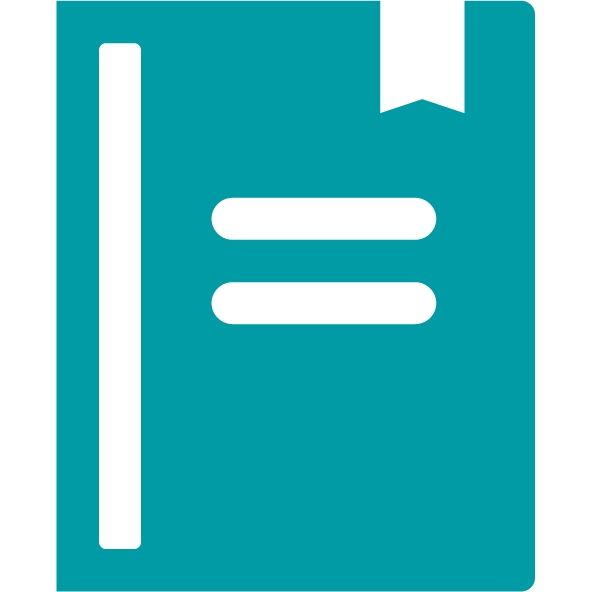
EDUCATION
Situation
As COVID-19 continued to spread in Latin America and the Caribbean (LAC), Ministries of Education progressively closed schools that had reopened or had plans to reopen. Refugee and migrant children from Venezuela faced particular challenges maintaining regular attendance in schools, either online or in-person, with absenteeism and the interruption of studies aggravated by worsened living conditions due to the pandemic. Causes included a lack of school supplies, such as uniforms, school meals, transportation, internet accessibility, and connectivity for mobile devices, as well as language barriers and xenophobia, discrimination, and lack of documentation.
Response
Partners focused on incorporating Venezuelan refugee and migrant children and adolescents into national educational systems and promoting their permanence in learning activities, including through in-kind aid and cash and voucher assistance (CVA), mental health and psychosocial support (MHPSS), support to teachers and public officials for capacity-building, and support to schools with supplies and improved infrastructure. Through these actions, 49% of the target population or a total of 284K people were assisted (46.36% girls; 42.48% boys; 4.72% women; and 6.44% men) including refugee and migrant children and adults and the host population.
R4V partners engaged in regional and national efforts to influence public policy to promote educational inclusion: working together with Ministries of Education, the enrolment of Venezuelan refugee and migrant children in the public education system in Colombia increased by 34% in 2021 compared to 2020, with 488,497 Venezuelan children enrolled; in Ecuador there was an increase of 56% in the enrolment of Venezuelan children in 2021; and in Peru, there was an increase of 18%. In the case of Trinidad and Tobago, meanwhile, where foreign children are still not allowed to enroll in public schools – despite advocacy by R4V – partners established alternative education programmes that instruction for refugees and migrants from Venezuela.
The Regional Education Sector promoted initiatives for the recognition and validation of studies in the framework of the Andres Bello Agreement including the implementation of the Equivalencies Table; strengthened mechanisms for monitoring the educational trajectories of children and adolescents in mobility situations together with Ministries of Education; and supported the development of an open data web platform for a regional monitoring framework for mobile students in LAC.
Lessons Learned
Lack of funding was again an important challenge for the sector, with only 14% of the 2021 plan funded. Data to evaluate refugee and migrant children’s learning permanence and outcomes continues to be a challenge, a situation exacerbated by school closings as a result of the pandemic. An important lesson learned is the comprehensive intersectoral care strategies that promote the social protection and welfare of the families of refugee and migrant children with educational needs, in order to ensure better conditions for continued learning.
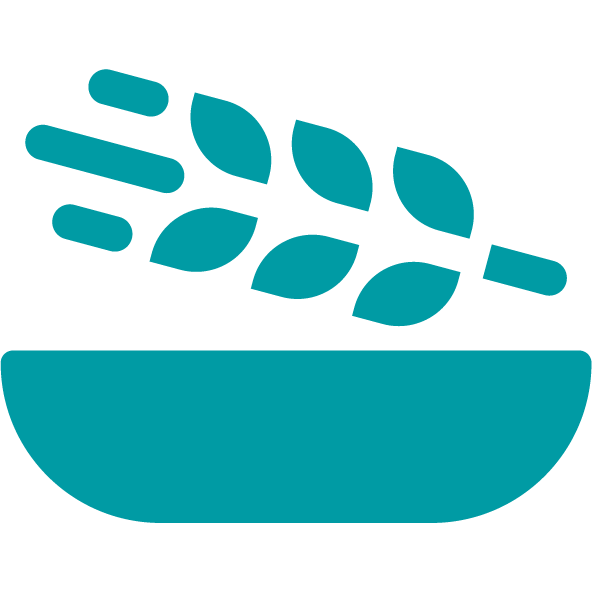
FOOD SECURITY
Situation
The COVID-19 pandemic is having long-lasting effects on food security and livelihoods in the Latin American and region, which has seen the highest relative increase of people in severe food insecurity, Many refugees and migrants from Venezuela (especially those in an irregular situation) are particularly dependent on the informal economy and face barriers accessing income-generating activities or social protection networks, resulting in an increasing inability to satisfy their essential needs.
According to needs carried out by RMRP partners in 2021, one out of four refugees and migrants either consumed only one meal a day or spent the previous day without eating. At least one in three refugees and migrants also reported having to skip meals or restrict consumption by adults so children could eat.
Response
In 2021, Food Security Sector partners assisted more than 1.5 million refugees and migrants from Venezuela and members of host communities across the region, reaching 92% of the target population of the sector, and were the largest providers of sectoral cash and voucher assistance (CVA). Partners also worked to improve food security in the long run by providing both agricultural and non-agricultural sustainable livelihoods opportunities to refugees and migrants .
Forms of support included in-kind food distribution through community kitchens and schools, as well as food packages for refugees and migrants in transit, and CVA distributed directly to beneficiaries and through national social protection systems. Ensuring that refugees and migrants from Venezuela are included in national social protection systems was a key priority.
The Food Security Sector at the regional level supported partners and host governments through the design and implementation of to leverage increasing internet coverage to collect real-time information on the food security situation of Venezuelan refugees and migrants in the region. These efforts contributed to greater programmatic harmonization through the adoption of common methodologies that produced comparable data across countries.
Lessons Learned
A regional support strategy facilitated the exchange of best practices and identification of common methodologies and approaches. The Regional Food Security Sector in key areas to promote programme harmonization across operations. These include common approaches to assessment, monitoring, targeting, beneficiary management, and identification and procurement of financial service providers.
For 2022, potential areas of improvement include:
- Include more disaggregation in needs assessments regarding the food security response, g. by ethnic groups, to improve the differential approach to food insecurity and linkages to longer-term integration.
- Enhance intersectoral work and communication, including with the Integration Sector on livelihoods and socio-economic integration, as well as with the Protection Sector on access to national social protection systems, to enhance the food security response based on community needs and participation.
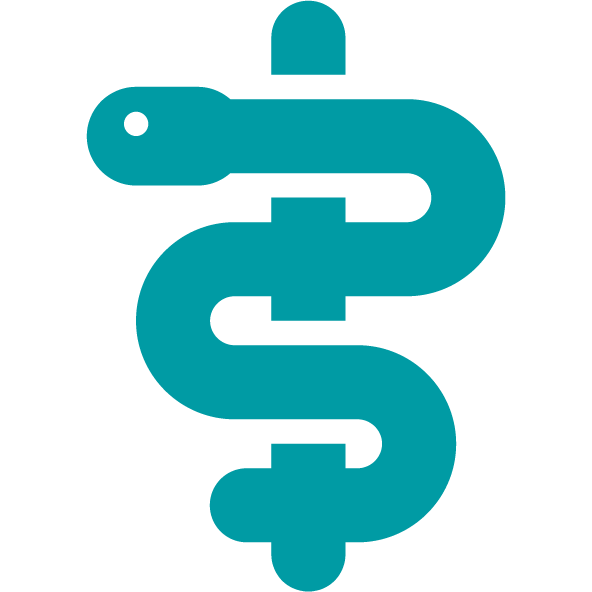
HEALTH
Situation
Access to health care for refugees and migrants from Venezuela remains limited in many countries, mainly due to irregular status, low levels of health literacy, and limited service coverage as a consequence of the COVID-19 pandemic. The lack of access to sexual and reproductive health (SRH) services and supplies remains a concern, as it increases maternal and neonatal mortality and the risk of unintended pregnancies.
Nevertheless, some important progress was made in 2021 to expand access. In Colombia, for example, the inclusion of refugees and migrants in national insurance systems increased with the Temporary Protection Permit, with . The national public health insurance in Peru increased its coverage to over 100,000 affiliated Venezuelans in the first half of the year, and the Ministry of Health provided care to 41,777 refugees and migrants in 2021. Ecuador provided free antiretroviral treatment to people living with HIV, including 1,494 Venezuelan refugees and migrants Brazil continued to provide free access to its national healthcare system (SUS) to all refugees and migrants with a taxpayer registry number (CPF) issued upon arrival at the border. Meanwhile, vaccination against COVID-19 advanced across the region, with national immunization plans inclusive of refugees and migrants from Venezuela.
Response
In 2021, R4V Health Sector partners reached the second largest number of people of any sector in the response, with a total of 1,253,942 refugees, migrants and members of affected host communities (70% of the target population) receiving health assistance. To address gaps in access to essential health services, partners strengthened national health systems with equipment, supplies and personnel, and provided health assistance to refugees and migrants at all levels of care, with a special focus on people in vulnerable situations, including people living with HIV. Partners also supported with outreach and logistics for COVID-19 vaccination campaigns, and in some countries – in the Caribbean for example – made vaccines directly available to refugees and migrants in coordination with local Ministries of Health who administered vaccines in R4V partners’ offices, at information kiosks and in community fairs.
The delivery of SRH services, including life-saving SRH information, increased in 2021. For example, more than 10,000 women in Brazil received access to contraceptives and SRH. Health facilities throughout the region were strengthened with SRH equipment and supplies for the clinical management of rape (), emergency obstetric and newborn care (EmONC) and family planning.
As a response to the increasing need for mental health and psychosocial support (MHPSS) brought on by the pandemic, partners carried out psychological accompaniment, first aid and other services.
Capacity-building was also conducted on COVID-19 vaccination, health rights and protection of vulnerable groups, such as LGBTQI+ persons and people living with HIV, including with border security personnel in Panama, and in Chile, where 9,000 refugees, migrants and health workers received information about health rights and vaccination against COVID-19.
Lessons Learned
As one of the main difficulties to access health services remains the irregular status of many refugees and migrants, in 2022 partners will focus on supporting registration for health insurance where it is available, including in conjunction with regularization and documentation initiatives in countries such as Colombia. To address challenges associated with a lack of knowledge of existing services, partners will prioritize community-based interventions with the objective of providing up-to-date information to refugees and migrants regarding access to health services in countries across the region.
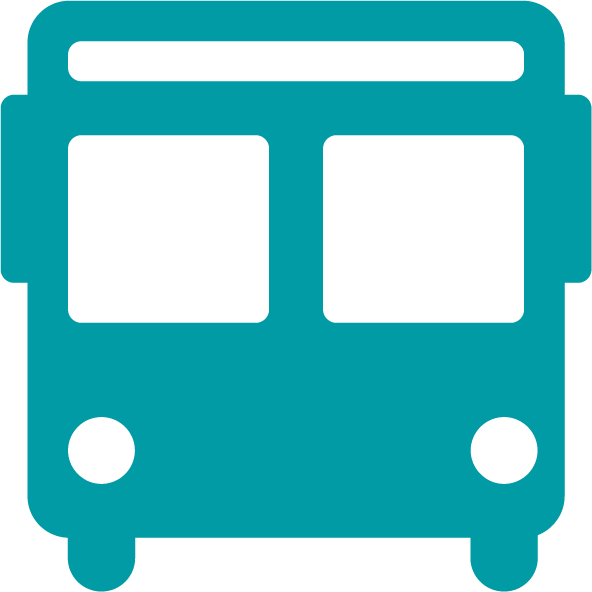
HUMANITARIAN TRANSPORTATION
Situation
In 2021, movement restrictions due to the COVID-19 pandemic strongly impacted Humanitarian Transportation activities, as most international land borders remained closed and only re-opened starting in October 2021 (for example, in Colombia) while some were closed throughout the year (for example, in Peru). The closure of land borders resulted in a higher number of refugees and migrants from Venezuela entering countries irregularly through non-official border points, which was also reflected in an increase in the number of Venezuelans walking through transit routes due to a lack of ability to access or pay for other transportation options. Safety and security risks also increased during 2021, with a greater presence of smugglers in border areas, and exposure to GBV and human trafficking and smuggling for refugees and migrants, particularly those transiting on foot. In the case of the Bolivia-Chile border, for example, humanitarian actors were compelled to stop their activities at the end of the year due to insecurity.
Response
In 2021, 86,585 individuals received humanitarian transportation support (134% of the targeted population) in eight countries through the activities of 11 RMRP organizations and 33 implementing partners. Partners in Colombia surpassed their objective by three times, reaching 310% of the target population, and partners in Brazil reached 52% of their target, while partners in Peru reached 8% and in Chile 11% of their respective target populations The levels of support of host governments for humanitarian transportation initiatives were key to explaining these differences: in Colombia, the Migration and Border authorities promoted the piloting of humanitarian transportation initiatives for extremely vulnerable refugees and migrants, in coordination with the R4V country platform (GIFMM); in Brazil, RMRP partners coordinated with the government’s Operation Welcome programme to provide humanitarian transportation to internally relocate refugees and migrants from border areas to more than 600 reception cities; while in Peru and Chile, COVID-19 movement restrictions, international border closures and visa requirements for Venezuelans limited the number of refugees and migrants who could be assisted with humanitarian transportation. The main priority for R4V partners has been coordinating with the authorities to provide safe and dignified transportation for refugees and migrants, framing the interventions under the countries’ norms and regulations. Activities included border-to-border and internal transportation, which in countries like Brazil were the main activity, while in other operations, day-to-day transportation was provided for accessing basic services, regularization processes, and livelihoods opportunities.
Lessons Learned
In coordination with local and national authorities, strong reinforcement of these areas is a priority for the sector in 2022. The sector will also work to mainstream protection and PSEA in all activities, to reinforce the capacity of humanitarian workers to mitigate risk exposure for the affected population.
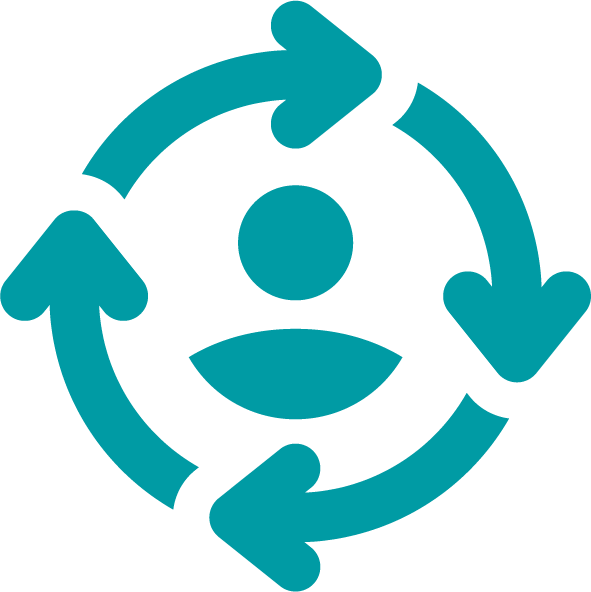
INTEGRATION
Situation
In 2021, Bolivia, Colombia, Costa Rica, the Dominican Republic, Ecuador and Peru all began or continued regularization processes for Venezuelans. Coupled with asylum procedures, these processes represented a significant step towards the sustainable socioeconomic integration of Venezuelan refugees and migrants, especially access to the formal labour market. At the same time, countries continued to experience the negative economic effects of the COVID-19 pandemic. Although many governments put in place economic recovery plans, an Integration Sector analytical report found that the majority of Venezuelan refugees and migrants were left out, mainly those in the informal sector. Venezuelan-owned enterprises or businesses that employed Venezuelan refugees and migrants continued to struggle: for example, in Trinidad and Tobago, about a third of small to medium-sized businesses remained closed in 2021, according to an R4V situation report.
Women and youth in particular lost employment and education prospects due to the pandemic. In Chile, 31% of Venezuelan women lost their jobs due to the pandemic, compared to 19% of Venezuelan men. In Peru, 70% of unemployed Venezuelans in Lima were women. A regional report indicated that youth were also particularly affected due to interruptions in their educational and professional trainings. The pandemic hit informal workers – who are disproportionately women, refugees and migrants – especially hard, by closing informal jobs and leaving even more vulnerable these workers who were already outside of social protection schemes.
Finally, 2021 saw instances of increasing xenophobia against Venezuelan refugees and migrants, including acts of xenophobic violence in the north of Chile, which inhibited local integration and peaceful coexistence.
Response
R4V partners’ integration priorities for 2021 included linking regularization and documentation processes with integration; increasing access to livelihood opportunities, especially for women and youth; and promoting social cohesion with host communities. 6,980 integration activities were implemented by 58 RMRP organizations and 130 implementing partners in 2021, reaching 36% of the targeted population in the region, out of whom 66% were women. Integration activities mainly included entrepreneurship support Integration activities were primarily implemented in Colombia, followed by Peru, Ecuador and Brazil.
At the regional level, the sector published a report on the inclusion of refugees and migrants in the socioeconomic policies of governments in response to the pandemic in Argentina, Brazil, Chile, Colombia, Dominican Republic, Ecuador Mexico, Panama and Peru. The report analysed policies, barriers to implementation and best practices related to regularization, social protection and employment, and provided recommendations to governments and stakeholders.
Lessons Learned
The main challenge was funding shortages: the integration sector only received 9% of the requested amount of dedicated funding. Integration initiatives are expensive, and during the pandemic, there was a substantial re-allocation of funds from integration activities towards humanitarian and cash interventions. RMRP partners tried to maintain their integration activities, but low financing meant decreasing the number of people reached.

NUTRITION
Situation
The nutrition situation of refugee and migrant children and women (and host communities) continues to be of concern, in particular acute malnutrition in children under age 5, which can result in death. According to data from Brazil, Colombia and Peru, cases of acute malnutrition in children under 5 are between 4.3 and 8.6% in s, while the prevalence of stunting (which reflects sustained nutritional deficiencies) in children under 5 ranges from 17 to 22% in Ecuador and Brazil. In Colombia, 4.8% of pregnant and lactating women from Venezuela were malnourished, creating risks for mothers and their infants.
The difficult situation faced by refugees and migrants due to the COVID-19 pandemic continues to result in limited access to health services, precarious WASH conditions, and limited access to diversified/nutritious food, all of which have deteriorated the nutritional status of the most vulnerable groups.
Response
The R4V Nutrition Sector focused on addressing the specific nutritional needs of vulnerable groups, according to age and condition, to prevent, identify and treat malnutrition, and improve survival. Target population groups included children (under age five and under age two) and pregnant and lactating women.
Main achievements included strengthening the capacities of health authorities to provide nutrition interventions through training (Guyana, Ecuador, Peru, Brazil, Colombia) and funding additional nutrition personnel (including indigenous health monitors) in government health units (Brazil); monitoring the nutrition status of children under 5 across borders (Colombia and Ecuador); and integrating nutrition interventions with other sectors (e.g. counseling on infant and young child feeding integrated with CVA in Trinidad and Tobago, Peru and Ecuador, and training caregivers in food preparation and healthy feeding coupled with food assistance in Brazil).
Main achievements at the regional level included organizing a webinar series on Nutrition in Emergencies in the context of COVID-19 and migration; organizing a high-level nutrition event as part of the 2021 Donor’s Conference and associated materials (factsheet, event recording, summary report, and Q&A); and publishing a R4V Nutrition Sector joint statement calling all R4V partners to protect, promote and support breastfeeding and avoid distribution of breast milk substitutes.
Lessons Learned
- Main challenges in the 2021 response included the lack of data on the nutrition situation of vulnerable groups, limiting recognition of the scope of nutritional problems faced by refugees and migrants; limited presence of actors with nutrition expertise, reducing the response’s reach; and difficulties with the implementation of nutrition interventions in . Critical lack of funding was a main challenge.
- To improve implementation in 2022, the sector will seek to 1) generate up-to-date information on the nutritional situation of vulnerable groups using standardized methodologies, like nutrition surveys, in addition to screening exercises 2) advocate for nutrition support to vulnerable groups in an emergency context, making visible their needs, risks, and gaps and the need to provide access to nutrition services, especially through local health services; and 3) conduct an analysis of capacities at the country level to manage acute malnutrition and identify areas for improvement
.
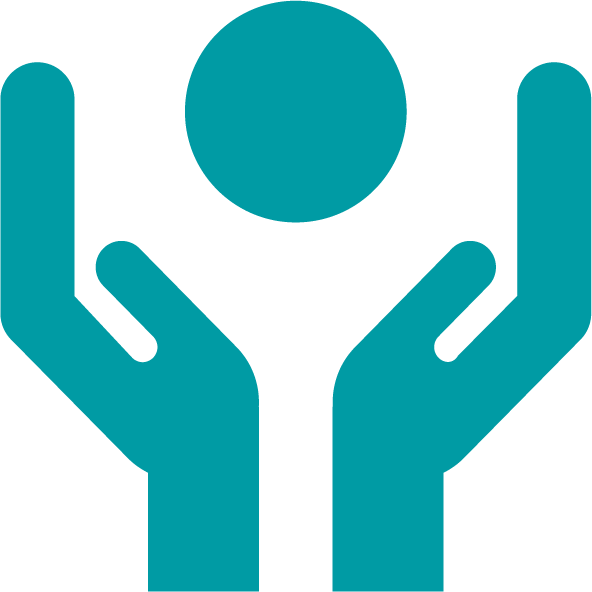
PROTECTION
Situation
In 2021, despite the extension of border closures and mobility restrictions, refugees and migrants from Venezuela in need of protection and assistance crossed borders both regularly and irregularly, with those in irregular transit particularly exposed to serious protection risks, including trafficking, disappearances, kidnappings, family separation and gender-based violence (GBV Access to territory was restricted in multiple countries. In some countries, detention, interception at sea and deportation increased, putting in danger the lives of Venezuelan refugees and migrants. In addition, onward movements of Venezuelans from Peru, Ecuador and Colombia towards Mexico and the United States registered a sharp rise.
Venezuelans in an irregular situation were significantly hindered in their access to rights and basic services. Asylum systems continued to be overstretched, with over 721,946 pending Venezuelan asylum claims across the region as of June 2021 Multiple governments in the region announced or initiated regularization initiatives to offer alternatives for documentation of the population.
Groups particularly impacted by protection risks in the region included indigenous persons, youth, evicted persons and sex workers or persons engaged in prostitution. Discrimination and acts of xenophobic violence were notably detected in 2021.
Response
Protection activities carried out in all 17 countries of the RMRP in 2021 – which provided assistance to a total of 852,266 refugees and migrants and vulnerable members of host communities – aimed to prevent, mitigate, and address protection risks, and advocate for access to rights and national protection systems for refugees and migrants.
Meanwhile, highlights of the Regional Protection Sector response included: a report prepared jointly with the Organization of American States (OAS) on the disproportionate impacts of COVID-19 on evicted persons, sex workers or persons in situation of prostitution, and indigenous peoples in Brazil, Colombia, Guyana, Caribbean and Southern Cone; consultations on the situation of indigenous refugees and migrants in Brazil, Colombia, Guyana and Trinidad and Tobago, resulting in recommendations presented at a High-Level Forum to seven Special Rapporteurs from the Inter-American Commission on Human Rights (IACHR) and the UN; a data visualization project which highlights the impact of COVID-19 on Venezuelan refugees and migrants who are faced with homelessness and eviction, with results from the regional survey on evictions and the toolkit launched in early 2021; and consultations carried out with national and sub-regional sectors and Venezuelan diaspora-led organizations, in order to feed into the RMRP 2022 process, including consultations with youth, indigenous peoples, LGBTQI+ and people living with HIV.
Lessons Learned
With the continuity of the COVID-19 pandemic, challenges included restrictions on public spaces and limitations on in-person delivery of protection services. In 2022 there will be a focus on strengthening case management procedures, referral mechanisms (including transborder) and protection analysis.
Limited funding affected the overall response, reducing activities such as protection monitoring, services linked to mental health support, legal assistance and representation, amongst others. The Regional Protection Sector in 2022 will explore additional avenues to support partners with fundraising.
For 2022, the Sector will continue to strengthen collaboration with other thematic sectors and working groups, especially as protection can contribute to prevent, mitigate and address threats and risks that Venezuelan refugees and migrants face in areas such as education, shelter, integration, humanitarian transportation, cash and voucher assistance and health services.
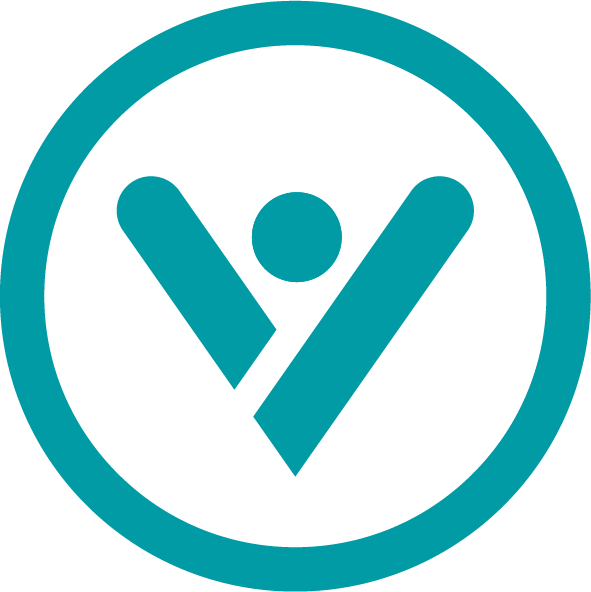
SUPPORT SPACES
Situation and Response
During 2021, the Support Spaces initiative continued to expand in response to the increase of refugees and migrants from Venezuela at points of entry and in host communities across the region. A total of 206 Support Spaces were implemented in eight countries: Argentina, Bolivia, Brazil, Chile, Colombia, Ecuador, Peru and Uruguay.
COVID-19 restrictions were maintained or lifted to varying degrees in these countries, which implied maintaining remote modalities or partial in-person attention with limited capacity.
In line with the priority to update and adapt regional tools for implementation, the Support Spaces Toolkit and training resources were updated and adapted to respond to the needs identified in the field and to improve capacities. The revisions were conducted through consultation with the national and sub-regional platforms and other relevant regional stakeholders.
To improve the visibility of the Support Spaces structures to be recognizable to persons of interest along transit routes, work was coordinated with the national and sub-regional platforms. The Support Spaces became points of reference for community protection in Peru, through a series of assistance sessions that took place throughout Lima with the collaboration of the Support Spaces and community-based organizations, and in Colombia, they were spaces to receive information, orientation, and facilitation of regularization processes during the implementation of the Temporary Protection Status (TPS).
At the regional level, throughout 2021, the Support Spaces continued to collaborate with regional networks such as RIADIS, Red Clamor and the Regional Network for the Protection of LGBTQI+ Persons, among others. The Support Spaces also presented to the Quito Process through its thematic group on Guidance Centres/Support Spaces, to articulate efforts with governments and share good practices, and Member States approved the proposed Guiding Principles and Standards presented during the Lima Chapter, under Peru’s Presidency Pro Tempore.
The regional R4V service mapping tool was upgraded with new functionalities. More than 1,500 services within all sectors were updated and mapped in coordination with national and sub-regional platforms.
Lessons Learned
Following the update to the Safe Spaces Toolkit, its application will be strengthened by providing training to representatives from national and sub-regional platforms and through on-site visits to ensure the positioning of the initiative in the field.
Improving communication and coordination efforts will contribute to strengthening the network, which is one of the characteristics of the Support Spaces initiative. It is also necessary to enhance the community-based protection approach and accompany it with guiding tools from the regional level to promote its adaptation at the national and sub-regional platform levels.
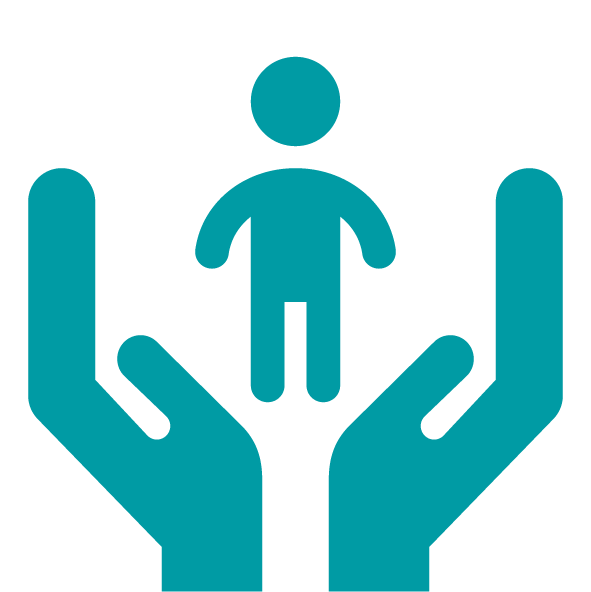
CHILD PROTECTION
Situation
In 2021, COVID-19 continued to complicate outreach to communities and refugees’ and migrants’ ability to access services. Studies by R4V partners indicated that the pandemic has further limited access by refugee and migrant children and their families to food, education and healthcare; that gender-based violence (GBV) was the most recurrent form of violence affecting Venezuelan refugee and migrant girls and adolescents in Colombia, Peru and Ecuador, including sexual, physical and psychological violence and xenophobia; and that the decrease in income for Venezuelan families led to increased child labour, marriage or early unions, voluntary separation from parents and caregivers when they left the country, and recruitment by irregular armed groups. R4V partners engaged and coordinated efforts with host governmentss to identify and support unaccompanied and separated children (UASC), but adolescents traveling through uncontrolled points of entry and/or without documentation often prevented them from accessing services, such as vaccines.
Response
In 2021, Child Protection Sub-sector partners reached a total of 158,025 beneficiaries with assistance, including 71,743 girls and 66,687 boys, for a total of 138,430 children assisted; while 19,591 adults (12,326 women and 7,265 men) were supported through capacity-building activities. A total of 85 organizations (29 appealing partners and 56 implementing partners) were involved in carrying out 3,687 reported activities across 10 countries.
The Regional Child Protection Sub-sector contributed to strengthening partners’ capacities for the protection of refugee and migrant children and adolescents with virtual training spaces, including Clinical Patient Management Systems (CPMS) webinars with 665 participants from 21 countries in the region; providing an internal materials repository and trainings on child protection with a focus on UASCs and GBV survivors; and engaging in online capacity-building together with the GBV Sub-sector to train partners in providing remote psychosocial support for Venezuelan refugee and migrant adolescents who are survivors of GBV . The Subsector also engaged partners in studies spearheaded by the Protection Sector on double jeopardy and organized crime affecting Venezuelan refugee and migrant children and adolescents, and an analysis of the child labor situation in this same group of interest.
To promote advocacy actions for the protection of children in emergencies, within the Quito Process framework for a protocol / mechanism to establish regional guidelines, Child Protection Subsector partners designed a regional campaign on UASCs to be implemented in 2022.
Lessons Learned
Limited funding resulted in limitations in the ability to develop databases for refugee and migrant unaccompanied and separated children in the region, which are needed for public policies to provide specialized child protection services, family reunification, and regularization to UASC. Support for UASC continues to be a priority, and greater investment is needed to identify, negotiate and create mechanisms between countries to identify UASC and provide them with child protection services.
In 2022, digital platforms will continue to be used to strengthen partners’ capacities to protect children. Coordination with other sectors and sub-sectors will also remain a priority, to ensure child protection across all sectoral interventions of the R4V response.
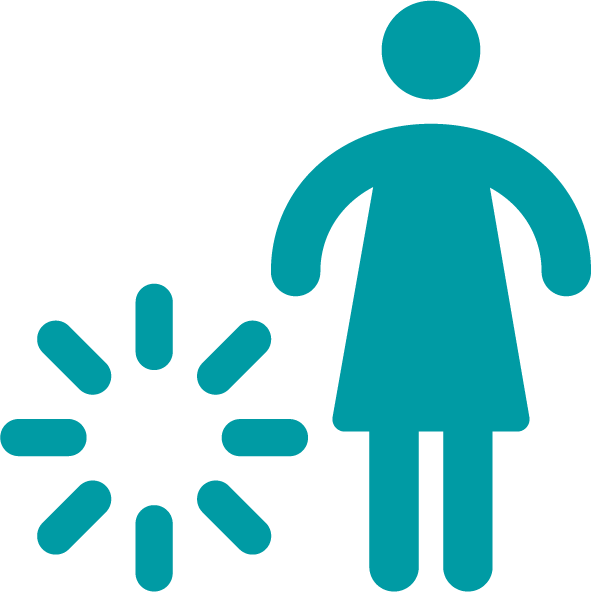
GBV
Situation
The socio-economic effects of the pandemic, including loss of livelihoods and income, disproportionately impacted refugee and migrant women, exposing gender inequalities and increasing risks of gender-based violence (GBV). Refugees and migrants in situations of financial hardship found themselves homeless as a result of eviction or upon arrival to host countries: an R4V survey of Venezuelans at risk of eviction in 2021 in Brazil, Colombia, the Dominican Republic, Ecuador, Guyana, Panama and Peru found that women were disproportionally affected by evictions, with 79% of women interviewed at risk due to informal tenancy agreements.
Intimate partner violence and attacks on transgender women and sex workers / people in situations of prostitution were a concern. Adolescent girls reported to R4V partners that they were fearful of sexual assault and vulnerable to forced marriages, trafficking and other forms of sexual exploitation. Against the backdrop of deportations of Venezuelans from countries in the Caribbean and Chile, ongoing border closures and travel restrictions, and discrimination and xenophobic violence, refugees and migrants were forced to spend nights in the streets and travel through irregular crossings, which made women and girls in particular more vulnerable to GBV, including rape, sexual assault, trafficking and other forms of sexual exploitation and abuse. There were also reports of men and boys – including LGBTQI+ persons – affected by sexual exploitation.
Response
In 2021, GBV partners reached 84,437 refugees and migrants from Venezuela and members of host communities with activities in Argentina, Bolivia, Brazil, Colombia, Costa Rica, Ecuador, Guyana, Panama and Peru. This included direct support to survivors of GBV, as well as trainings of authorities responsible to identify and respond to GBV.
The Regional GBV Sub-sector provided support to partners, created a forum for strategic planning and to exchange good practices, and supported GBV service delivery at country level. For example, the regional sub-sector worked with partners in the Caribbean to craft service mappings, referral pathways and GBV Standard Operating Procedures. The regional sub-sector – in coordination with other sectors and working groups – rolled out technical guidance and delivered trainings to develop capacity. These included a guidance manual on the use of Multipurpose Cash Assistance to meet the needs of Venezuelan refugee and migrant GBV survivors in Ecuador; a training manual for non-GBV specialists on referring GBV survivors to multi-sectoral services; and a psychosocial support training manual to provide in-person and remote support to child GBV survivors.
In 2021, the Sub-sector supported the launch of the regional positive masculinities campaign “A Thousand Ways to Be a Man,” with videos and messaging in English, Portuguese and Spanish. The campaign reached a total of 9,808,176 views through 747,484 social media interactions.
Lessons Learned
While services in some border areas are functional and accessible, GBV responders have limited service coverage in smaller destination cities and hard-to-reach areas, including mining and agro-industrial sites where there is a higher risk of sexual violence and exploitation. There are also not enough shelters or alternative accommodations for women at risk of GBV, which limits their opportunities for recovery or self-sufficiency.
In 2022, the GBV Sub-sector will scale-up activities in countries such as Chile and Mexico, which host significant populations of Venezuelans but where programming and resources for a specialized GBV response have been limited.
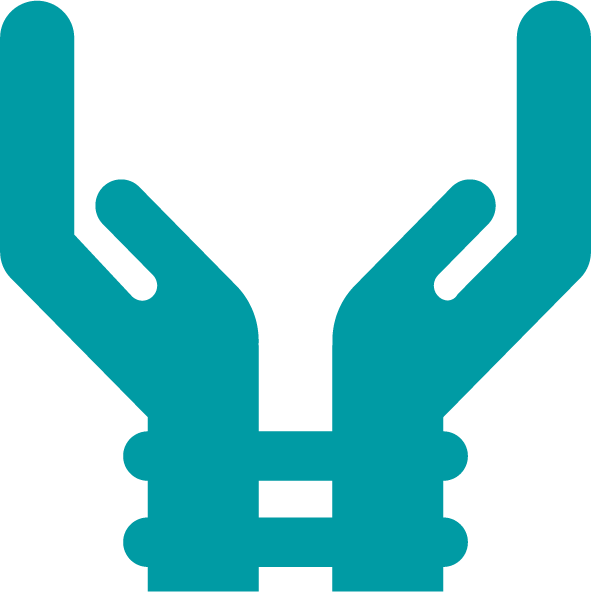
HUMAN TRAFFICKING & SMUGGLING
Situation
Human trafficking and migrant smuggling are complex phenomena, linked to transnational criminal networks, which can generate a series of human rights violations for refugees and migrants who experience them. Trafficking and smuggling disproportionately affect women, girls and adolescents.
The prolonged impact of the COVID-19 pandemic has exacerbated Venezuelan refugees’ and migrants’ vulnerability to trafficking and smuggling. Mobility restrictions and border controls have propelled the use of alternative and more dangerous travel routes, irregular border crossings and unofficial means of transportation, which also increased refugees’ and migrants’ dependency on smuggling and trafficking networks and their risks of exploitation. Border controls and movement restrictions also resulted in greater numbers of Venezuelans in an irregular situation, which limited their ability to access documentation and regularization procedures, work legally, or exercise their rights. Limited income-generating prospects and access to social services also increased possibilities of abuse and exploitation.
Response
The Human Trafficking and Smuggling Sub-sector reached almost 5K members of host communities and refugees and migrants from Venezuela with specialized support in 2021, of whom over 4.6K were members of host communities in Peru, reached through activities such as trainings with the authorities responsible for preventing and responding to trafficking and smuggling as well as through direct assistance to victims of trafficking or refugees and migrants at risk of trafficking.
At the regional level, the Sub-sector focused on the four pillars of prevention, protection, prosecution and partnership. In terms of protection, the Sub-sector implemented a Regional Assistance Mechanism through which assistance was provided to 33 Venezuelans who exhibited signs of being possible trafficking victims and 22 Venezuelans who had experienced violence, abuse and/or exploitation. On prosecution, the Sub-sector collaborated with multiple UN agencies to create a mechanism for information exchange and specialized analysis between experts in criminal justice, Ombudspersons’ Offices and civil society organizations regarding challenges in prosecution of charges in trafficking and smuggling cases, with a gender perspective. On partnership, the Sub-sector collaborated intersectorally with the Protection, Humanitarian Transportation and Integration Sectors, on events such as a meeting with the Special Rapporteur on Human Trafficking, in which 21 civil society organizations also participated (representing Bolivia, Brazil, Costa Rica, Chile, Ecuador, Guyana, Paraguay, Peru, Trinidad and Tobago and Uruguay). Finally, for prevention, the Sub-sector designed a communications campaign on smuggling and trafficking, with key messages in Spanish, English and Portuguese, which will be launched in 2022.
Lessons Learned
Underfunding resulted in limitations on the response and affected the ability to have data with which to drive evidence-based practices. For 2022, the Regional Human Trafficking and Smuggling Sub-sector plans to enhance information exchange with national and sub-regional platforms, including through field visits to better understand the country dynamics and challenges in the region, and continue the established good practice of collaborating across sectors at the regional level.
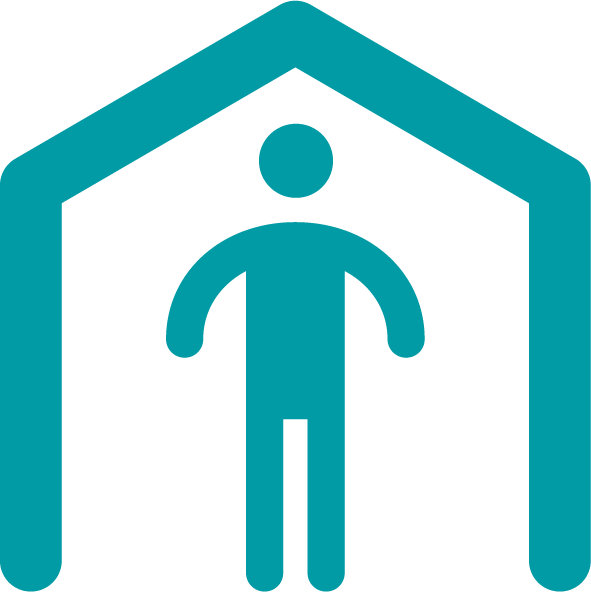
SHELTER
Situation
In 2021, shelter continued to be among the top three needs of refugees and migrants from Venezuela as identified in multiple R4V needs assessments, including those conducted in Brazil, Colombia, Ecuador, Peru and the Southern Cone. COVID-19 restrictions and requirements created ongoing operational challenges for the response. Nevertheless, shelter partners increased their operational capacity to enable the reopening of temporary collective shelters by adapting and implementing Infection Prevention and Control (IPC) measures, including physical distancing. For example, in Ecuador, only 2 out of 29 Temporary Collective Shelters remained fully closed in 2021 after closing in 2020. Despite this improvement, the capacity to address the most urgent shelter needs of refugees and migrants from Venezuela in transit remained a significant challenge. The pandemic continued to impact refugee and migrant households’ capacities to earn an income to cover their rental costs, and the lack of affordable rental housing in the market, also for members of host communities, was identified as a major barrier to adequate shelter in countries such as Chile and Brazil. The number of refugees and migrants from Venezuela living in informal and spontaneous settlements without access to basic services increased during 2021, also resulting in higher risks for eviction, affecting particularly the indigenous people in Colombia, Brazil and Guyana, in territories bordering Venezuela.
Response
In 2021, shelter activities reached 264,170 refugees and migrants and members of host communities (55% of those targeted) in 15 countries through the work of 33 organizations and 80 implementing partners. Colombia and Ecuador reported the highest numbers of Venezuelans receiving shelter-related assistance, with rental support programmes providing cash and voucher assistance (CVA) as the main modality and activity carried out by sector partners. The trend towards providing rental assistance in the form of CVA expanded throughout the region, with rental programming reported as the key shelter solution implemented to tackle evictions while also supporting refugees’ and migrants´ access to and choices of longer-term individual shelter solutions. In 2021, settlement interventions also increased across the region, particularly in Brazil, Peru, Ecuador, and Colombia, commonly framed under the area-based approach, through the implementation of community infrastructure and the support of governance structures that benefit both refugees and migrants and residents of local host communities. The Regional Shelter Sector supported this process by developing and implementing guidelines for the management of collective shelter solutions as part of capacity-building efforts.
Lessons Learned
Inter-sectoral collaboration was an important element of shelter activities in 2021, to be expanded upon in 2022. In 2022, the Regional Shelter Sector will focus on raising awareness of the importance of access to adequate housing through the implementation of campaigns and the development of tools to mainstream access to shelter in relation to protection, housing, land and property, health, integration and WASH considerations, among others. This will imply a particular focus on rental market-based programming to better inform shelter responses and to link to exit strategies from collective emergency shelters while seeking more durable solutions and integration for refugees and migrants.
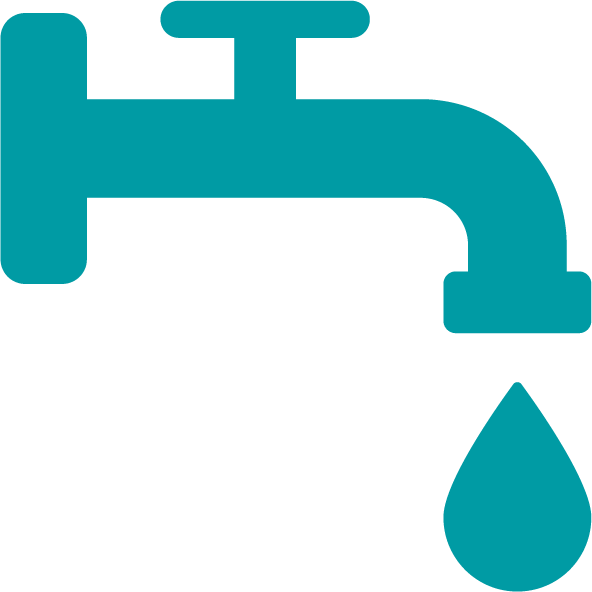
WASH
Situation
A total of 4.1 million refugees and migrants from Venezuela and members of host communities were in need of water, sanitation and hygiene (WASH) services in 2021. Lack of WASH products and services can lead to public health concerns and outbreaks of disease and vector-borne illnesses, increase vulnerabilities including to gender-based violence (GBV), and affect human dignity.
A 2021 by R4V partners indicated a need to strengthen investment and technical capacity to increase coverage and quality of WASH services. Key needs for Venezuelan refugees and migrants and host communities included: 1) facilitating the operation and maintenance of existing WASH systems, going beyond the tendency to inaugurate new infrastructure; 2) integrating WASH rights into municipal plans and budgets in a coordinated manner between donors, service providers and host country authorities; and 3) having a territorial rather than a demographic focus, to avoid doing harm and to contribute to social cohesion between refugees, migrants and host communities.
Response
The WASH response, implemented by 47 appealing partners and 55 implementing partners in 13 countries, benefited 642,078 refugees, migrants and members of host communities, representing 58% of the 1.1 million target. Designated funding needs for the sector were only 19% met, which limited the scope of activities. Colombia reported the greatest number of people reached, followed by Ecuador, Peru and Brazil. Response priorities included provision of potable water; sanitation and waste management services that are inclusive of gender, age and disability; hygiene and menstrual hygiene services integrating the ‘Hand Hygiene for All’ global initiative; and COVID-19 prevention, including capacity and supply support to institutions. The sector also focused on prevention of other public health risks in addition to COVID-19 and provided support for the safe return to schools.
With changes in transit routes came the emergence of new hotspots for WASH needs (including Necocli along the Colombia/Panama border; Region 1 along the Guyana/Venezuela border; and Pacaraima along the Brazil/Venezuela border). The sector adapted to provide more agile and mobile WASH services to meet the demands of people in transit, including in temporary shelters.
The Regional WASH Sector worked to ensure intersectoral coordination with the Food Security, Health, and Education Sectors, and the Communication with Communities Working Group, particularly on the safe return to school. Two high-level events were organized focusing on the humanitarian-development nexus and WASH gaps for refugees and migrants in the context of the safe return to school.
Lessons Learned
The WASH policy review suggested that WASH needs are perceived more as a consequence of or linked to access to health, education and shelter services, instead of as a priority service in itself. This has a significant impact on public governance and investments. This also highlights the importance of intersectoral coordination, which will remain a focus in 2022.
An information management system integrating WASH needs within identified population movements and overlaying maps of service coverage in communities and institutions would help to ensure limited funding is invested strategically, to address WASH gaps.
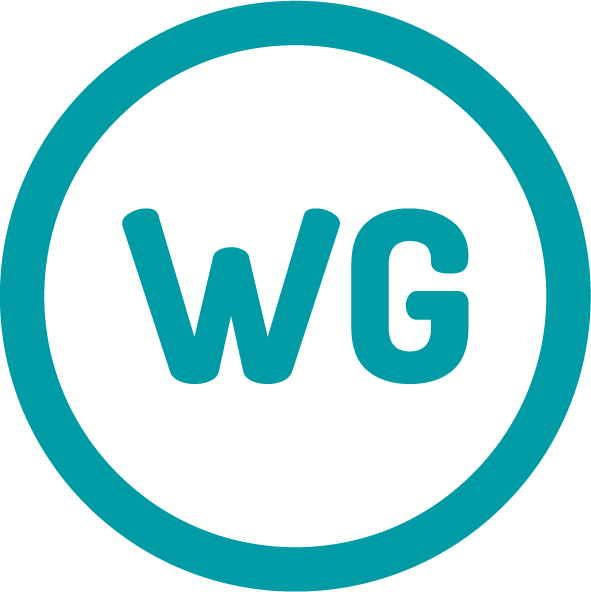
CASH
Situation
During 2021, Venezuelan refugees and migrants faced reduced income and livelihoods due to the ongoing COVID-19 pandemic and their overrepresentation in the informal sector and low rates of inclusion in government-led social protection mechanisms. Lack of income among refugee and migrant households continued to hinder access to basic goods and services, including food, shelter, and healthcare. It is also associated with protection-related risks, including gender-based violence (GBV), evictions, and negative coping mechanisms. In 2021, some host countries introduced mechanisms to support Venezuelans’ socioeconomic integration with impacts on cash and voucher assistance (CVA). For example, Colombia initiated its Temporary Protection Status (TPS) that is expected to facilitate access to formal employment, public services, and social protection, including social cash transfers.
Response
In 2021, CVA accounted for 42% of all people reached by the R4V response: a total of approximately 1.3 million refugees, migrants and members of affected host communities received cash and voucher assistance across 17 countries through 53 organizations. Colombia had the largest number of people reached, followed by Peru and Ecuador. Cash transfers, in particular multipurpose cash (MPC), were identified by refugees and migrants as a preferred modality of assistance, including in the Joint Needs Assessment (JNA) conducted in Colombia. CVA was also recognized as one of the most flexible/adaptable assistance modalities throughout the pandemic.
Roughly half of the CVA (49%) distributed in 2021 corresponded to MPC, while the other half (51%) was distributed as sectoral CVA. Food Security was the predominant sector using CVA as an assistance modality, with over 50% of the sector’s assistance cash-based. Other sectors using cash transfers included Integration, Shelter and Protection, and to a lesser extent Health, WASH, Education and Humanitarian Transportation.
The Regional Cash Working Group (RCWG) held regular coordination and technical discussion meetings; engaged with and supported national and sub-regional CWGs; worked with regional sector leads to support cash activities; and collaborated closely with the R4V Regional Platform (including to improve the CVA dashboard). It also promoted cross-fertilization and learning on regional priorities, such as by organizing an event on the linkages between CVA and social protection and supporting the dissemination of relevant information on Venezuelans and cash transfers. In September 2021 the RCWG held elections to renew its leadership.
Lessons Learned
One of the main challenges during 2021 related to the intersection between humanitarian activities and longer-term integration, which grows in importance over time for the Venezuela response. This created a more prominent need for national CWGs to coordinate with the authorities regarding linkages between CVA and government-led social protection programmes. Another challenge was the insufficient funding received for multipurpose cash (MPC), which was just 18% of the request. Lastly, CVA also faced challenges regarding providing unaccompanied minors with financial assistance. To address these issues, the RCWG will coordinate with regional partners, national CWGs, sectors and the R4V Platform in capacity-building, support and advocacy.

GENDER
Situation
R4V estimates that women and girls make up almost 52% of refugees and migrants from Venezuela in LAC. With the increasing feminization of human mobility, a growing number of refugee and migrant women and girls are affected by discrimination, gender-based violence (GBV), early unions, human trafficking (especially for sexual exploitation), unemployment and poverty. They also face greater barriers to accessing rights and services, including healthcare, during the COVID-19 pandemic. Unaccompanied or separated girls, including LGBTQI+ children,exposed to unique risks.
The rate of GBV increased significantly during the pandemic. Some studies indicate that the rate of GBV among refugee and migrant women, transgender women and girls reached 50% in some destination countries, including sexual violence, domestic violence, and survival sex. According to a study developed by R4V partners in seven countries (soon to be published), 60% of participating refugee and migrant women from Venezuela felt at risk of GBV in transit, and 39% reported that they continued to feel unsafe in the host community. 60% of women were not aware of services available for GBV survivors.
The sectors with the greatest loss of employment during the COVID-19 pandemic were sectors where women historically have been overrepresented, particularly refugee and migrant women. At the same time, there has been a significant increase in unpaid domestic work.
Response
At the regional level, the Gender Working Group worked to ensure a gender-sensitive response and to effectively address the differentiated impact of human mobility on refugee and migrant women and girls from Venezuela. In 2021, the Working Group led the implementation of the Gender with Age Marker (GAM) for the development of the RMRP 2022. This was done through the design and preparation of and trainings in Spanish and English on how to apply the GAM.
Projects submitted by R4V partners have shown an increasing commitment to integrating gender and age in their activities and recognizing that equal rights for men and women are a pre-condition for fulfilling the principles of leave no one behind and do no harm. In the RMRP 2021, 80 per cent of R4V partners incorporated gender equality measures in their planning; for the RMRP 2022, this reached 92 per cent.
The Working Group also provided technical guidance on activities related to gender and the R4V response, including inputs to a to strengthen GBV prevention, risk mitigation and response in seven countries (Brazil, Colombia, Costa Rica, Ecuador, Mexico, Peru, and Venezuela); support to the Protection Sector of Argentina for a two-day training for more than 20 R4V partners on accompaniment of GBV survivors; and support to the GBV Sub-sector in Colombia.
Lessons Learned
To strengthen the gender-differentiated R4V response, in 2022 the Working Group will work to dedicated to providing technical support and to accompany partners in all 17 RMRP countries on a permanent basis
Other vital needs include engaging women´s organizations more substantively in the response, and addressing issues such as the overload of unpaid care tasks for refugee and migrant women.

ENVIRONMENT
Situation
In the planning of the RMRP 2021, efforts were redoubled to integrate environmental considerations into project design. Thanks to easier access to tools and technical advice, sectors have shown increased enthusiasm for incorporating an environmental perspective to further their objectives. Additionally, COVID-19 and the associated biosafety measures made it necessary for many R4V partners to adapt their modus operandi. This has not only challenged project planners to think about the associated additional waste and how to manage it (e.g. in the area of food distribution) but also increased awareness of other novel approaches that could be implemented and at the same time benefit the environment.
Response
According to a self-assessment exercise for the RMRP 2022, Shelter, WASH and Food Security were the sectors with the highest rates of inclusion of environmental considerations in project planning in the region (over 70% per sector). Environmental criteria were already an integrated part of planning processes in these sectors. Additionally, there were an increasing number of environmentally friendly alternatives available to respond to certain needs (e.g. solar lamps for family use or public spaces).
The integration of environmental considerations was more novel for the Integration Sector and the Cash Working Group, which had the lowest rates of inclusion (50% each). In response, in Brazil and Colombia, pilot projects were implemented to enable the integration of refugees and migrants into Green Jobs to strengthen more sustainable and innovative business models. Meanwhile, lockdown and social distancing measures advanced digitalization and simplification of steps in the distribution of multipurpose cash and reduced the use of paper and mobilization of partners and beneficiaries, which consequently mitigated the environmental impact of Cash and Voucher Assistance (CVA).
These new experiences and lessons, from the COVID-19 adaptation process, were incorporated into thematic guidance and environmental mainstreaming tools, such as the Cash & Environment Checklist, developed in Colombia. This and other similar tools for other sectors to mainstream environmental considerations in humanitarian action were shared on the R4V Key Resources Website and presented in webinars on national, regional and global levels. These tools will help to respond to the increasing number of donors establishing environmental safeguards and requirements to give access to financing.
Lessons Learned
Despite the strong interest of R4V partners on climate change and environmental issues, gaps and challenges remain. For some partners, environmental mainstreaming and climate action still represent a new approach. Raising awareness on their importance and potential will therefore continue to be a priority in 2022. Few partners have access to specialized in-house knowledge or can afford external technical expertise to proactively incorporate environmental considerations into programming. In most cases, partners must rely on available general guidance to mainstream environmental impact. Therefore, improved access to context-adapted planning tools and technical advice will be an important for inclusion of environmental considerations in project planning throughout 2022, especially as donor requirements have increased.

PSEA
Situation
The pandemic and its consequences presented more risks for sexual exploitation and abuse (SEA) at the same time that the channels for communicating with communities and the spaces for seeking support and reporting misconduct have been limited by the remote nature of many interventions.
The results of a mapping conducted in July 2021 highlighted important gaps and good practices in the region. R4V partners participating in the exercise reported that 30% of organizations did not have the minimum organizational structures to deal with SEA (a policy addressing SEA and complaint handling procedures); 50% were not aware of whether there was a protection against sexual exploitation and abuse (PSEA) Focal Point within their organization; 80% reported being unaware of any existing inter-agency referral pathways for victim assistance; while 56% reported having produced awareness-raising material for staff and communities.
PSEA remains a core commitment of the R4V response. This means that all partners must commit to mainstreaming prevention, risk mitigation, and response activities across their sectoral responses and ensure they deliver assistance that is safe, relevant, and timely. This will ultimately help all actors in fulfilling their mandate, and jointly promoting the safety, dignity, and wellbeing of refugees and migrants from Venezuela.
Response
In 2021, the Regional Platform established the R4V PSEA collective response supported by a Community of Practice (CoP) that serves as a space for advocacy, knowledge sharing, network building, and technical assistance to national and sub-regional platforms in the implementation of actions to tackle SEA. Among its main achievements, was the completion of the mapping of interagency PSEA initiatives in July 2021, which is the basis for further R4V PSEA efforts in 2022. Interagency PSEA protocols were identified in Colombia and Ecuador and are under development in Chile and Brazil, while Inter-agency Community-Based Complaints Mechanisms (CBCM) were identified in Colombia.
Furthermore, the PSEA CoP organized best practice webinars and developed inter-agency materials, such as the standard R4V PSEA Training Module and Facilitation Guide. The CoP also produced a Risk Assessment methodology which will be pilot tested in 2022.
The CoP has worked to embed PSEA considerations into platform tools and processes, particularly the RMRP planning. The RMRP 2022 Planning Instructions included PSEA as a priority, cross-cutting issue. Guidance Notes covered in greater depth how to integrate PSEA into RMRP activities.
Lessons Learned
To address gaps and build on good practices identified in the 2021 mapping exercise, moving forward the CoP will work to promote greater collective, operational PSEA activities at the country level through a network of Focal Points. It will continue to advance PSEA strategic priorities, including strengthening partners’ capacity to undertake SEA prevention (risk assessments, training, internal policies and procedures); SEA response (community-based complaint mechanisms and victim’s assistance services); and overall leadership and accountability.

AAP/CwC/C4D
Situation
In the context of continued COVID-19 restrictions and the gradual reopening that characterized 2021, providing refugees and migrants with accurate information on available services, safe transit routes and where to seek help in case of emergencies remained a priority for Communication with Communities (CwC). In addition, as vaccination programmes were implemented across the region, information on vaccine access for refugees and migrants was one of the main concerns relating to access to information.
Community engagement and participation efforts were complicated by the restrictions in place, while the need to actively involve and hear from refugees and migrants continued to be a priority to implement an R4V response that promoted accountability to affected populations (AAP). Understanding community priorities, getting feedback on services provided and uncovering gaps in needs have been pivotal for all sectors and partners of the R4V Platform, which required safe and culturally appropriate channels to be deployed in order to engage refugees and migrants in such conversations.
Response
Since 2021, AAP and CwC focal points for R4V at the regional level have coordinated jointly to encourage collective approaches and initiatives focusing on community engagement in an integrated manner, under the three operational pillars of AAP: communication with communities, participation and complaints and feedback mechanisms (CFMs).
To bridge information gaps, the AAP/CwC Regional Working Group prepared materials for populations in transit, including messaging on safety and protection and health advice, in multiple formats to be distributed across digital and offline channels.
Information materials about vaccines were produced on vaccine safety and to highlight the importance to get the COVID-19 vaccine to mitigate the risk of developing severe illness.
The Working Group also to promote the use of the U-report Uniendo Voces. The digital platform is used in Brazil, Ecuador and Bolivia and allows adolescents and young adults to collect information and participate in surveys to give their views on important topics.
To take stock of current practices to engage the affected population in the response, a regional mapping was conducted to understand the capacities, challenges and opportunities that R4V platform partners have been experiencing in the area of AAP. The mapping highlighted the need for increased coordination on the topic. As a result, an AAP network was created with focal points in national and sub-regional platforms who will work together to advance the accountability agenda in R4V.
Lessons Learned
R4V partners expressed the need for increased support for AAP efforts, from building capacities to enhanced coordination in this transversal area.
The continuous need for information also shows the necessity to constantly update existing materials, ensuring they stay relevant to new needs and a changing context. Coordination at the local level is key to ensure quality and consistent information is distributed to refugees, migrants and host communities.

COMMUNICATIONS
Situation and Response
During 2021, the Regional Communications Working Group strengthened its efforts in the following thematic areas:
Dissemination of messages against xenophobia and in support of integration for refugees and migrants.
Following the R4V Platform’s commitment to advocate against the discrimination and stigmatization of refugees and migrants, the One Step Closer regional campaign launched its second phase in April 2021 with social media materials, a panel on local integration, and a social experiment to show the challenges faced by refugee and migrant children in their new communities. The campaign had over 1M social media interactions and more than 10M user views.
To reach new audiences, between November and December, the Communications Working Group developed three communication products together with Pictoline, one of the most renowned content creators in Latin America. The content was shared on Pictoline’s social networks, from which it reached more than 5.8M users.
Improving the R4V Platform’s visibility in media and social networks and positioning R4V as a reference on Venezuelan refugees and migrants in the region.
Efforts focused on increasing content production and improving its effectiveness by targeting specific audiences. Some achievements include:
- The launch of R4V’s Twitter account @Plataforma_R4V in September, which reached more than 2,000 organic followers and almost 700K impressions.
- More than 300 videos (in English, Spanish and Portuguese) uploaded to R4V’s YouTube account, produced by multiple sectors and working groups of the Regional, National and Sub-regional Platforms.
- Over 7,900 views of the R4V biweekly newsletter.
- Launch of the RMRP 2022 with over 50 communication and advocacy products, including social cards, GIFs, videos, and a dedicated website. Through a joint global press release, 272 pieces of coverage were generated in 39 countries.
Increasing the number of coordinated initiatives with members of the working group.
In December 2021, the R4V Platform and the LAC-RMD Coalition co-produced and launched a three-chapter miniseries focused on civil society organizations’ activities in the areas of gender, childhood, socioeconomic and cultural integration in three countries: Colombia, Peru, and Panama. The videos are available in English and Spanish.
Lessons Learned
As in previous years, achieving regular engagement from all group members was a challenge. In 2022, the Regional Communication Working Group will meet monthly to improve coordination. Additionally, the Working Group will regularly produce R4V co-branded communication materials involving all partners to promote their commitment.
Working with content creators has proven to be an effective way to reach new audiences. For this reason, the Working Group will focus on developing more products with content creators to generate higher impact at a lower cost.
Twitter has also shown to be an essential tool for visibility of the R4V. The Working Group will carry out an analysis of its impact and formulate best practices to ramp up its reach for it to become R4V’s primary public communications channel.
Brazil
Situation
While land borders remained closed for most of 2021, the second year of the COVID-19 pandemic saw increased irregular arrivals of refugees and migrants along the northern border between Brazil and Venezuela, many in even worse conditions than before, including greater numbers of indigenous families (mainly Warao, Eñepa and Pemón-Taurepang).
Brazil’s ‘Operation Welcome’ (Operação Acolhida) maintained its commitment to humanitarian principles and continued to provide assistance to vulnerable refugees and migrants from Venezuela, regardless of their legal status. Refugees and migrants who arrived in the country prior to the introduction of entry restrictions were able to access basic services – including social welfare and poverty-reduction cash transfers – on an equal basis with nationals.
Through Ordinance 655, issued in June, the Federal Government lifted restrictions on the admission of refugees and migrants from Venezuela on humanitarian grounds, which in turn allowed the documentation of those who had entered Brazil irregularly after the border closure in March 2020. Under this framework, the Federal Police issued 43,647 entry permits during the year, and the overall population of refugees and migrants from Venezuela in Brazil grew to 305,076.
However, because the number of Venezuelans waiting to be regularized in Pacaraima surpassed the processing capacity of the authorities, some 4,000 refugees and migrants were in situations of homelessness in the border town, as of December 2021.
Response
As a response to the increased arrivals of refugees and migrants in irregular situations during the first quarter of 2021, the R4V Platform supported Operation Welcome in designing and carrying out a vulnerability assessment through which 5,400 people were interviewed and 3,300 were sheltered. R4V also supported Operation Welcome in opening five new shelters in Boa Vista and Pacaraima, and in expanding two existing facilities, increasing by 4,510 spaces the overall capacity of the 12 shelters in Roraima.
The Federal Government continued the internal relocation strategy with R4V partners’ support, through which almost 20,000 refugees and migrants were provided with humanitarian transportation, job placement support, family reunification and temporary housing to facilitate their local integration in 2021. Over 66,000 Venezuelans have been internally relocated since 2018 – April marked the milestone of 50,000 Venezuelans internally relocated – which has allowed them to find better integration opportunities in almost 800 cities across Brazil. This year, the Integration Sector also supported the design and roll-out of the Regional Interiorization Clusters (NURINs), multi-sectoral coordination structures that support local authorities in implementing the interiorization strategy.
As a result of advocacy by the R4V Platform, refugees and migrants from Venezuela were included in the COVID-19 National Immunization Plan. Health Sector partners supported the public response to COVID-19 and donated antigen test kits, conducted regular monitoring of suspected cases of COVID-19 among refugees and migrants in Operation Welcome shelters, and supported COVID-19 vaccinations.
To address practical difficulties with civil registration of Brazilian children born to refugee and migrant parents, the R4V Platform issued a technical guidance note on the right to civil birth registration, which is guaranteed to children born in Brazil, in accordance with Brazilian and international law.
Partners also conducted a comprehensive technical assessment of WASH conditions in all Operation Welcome shelters in Boa Vista and Pacaraima. This included recommendations to meet Sphere standards on water supply, hygiene, sanitation, drainage, solid waste, and vector control.
Education partners supported the integration of internally relocated Venezuelan students into the formal education system in destination cities through information sessions and booklets to inform families about childrens’ rights to access education in the country. To facilitate Venezuelan childrens’ access to public schools in Pacaraima, R4V partners translated primary education placement exams into Spanish.
In 2021, the R4V Platform held regular meetings between Federal Government and Operation Welcome officials and R4V sectors and partners, thereby strengthening coordination. The Platform’s membership was expanded with nine new organizations, bringing the total to 55 in Brazil. The Information Management Working Group also expanded its role and produced key inter-agency tools, such as a 3W dashboard, a 5W of the RMRP 2021, and conducted a Joint Needs Assessment (JNA).
Lessons Learned
In the last months of 2021, R4V partners’ capacities to provide direct assistance to refugees and migrants across Brazil were impacted due to a lack of funding, which affected internal relocation and other integration initiatives. Smaller organizations at the forefront of the response were particularly impacted by underfunding, which limited their capacity to respond to the needs of refugees and migrants outside the northern region, where Operation Welcome operates.
Chile
Situation
In 2021, with land borders remaining closed throughout the year, Chile experienced an increase in irregular entries of refugees and migrants, mostly from Venezuela. Official figures report 56,586 irregular arrivals for the year, or over 150 per day (while unofficial local sources in the north often reported 500-600 arrivals per day, suggesting the total number may be significantly greater). Deprived of a regular pathway to enter Chile, refugees and migrants turned to irregular alternatives, and were exposed to high altitudes, harsh climatic conditions and difficult terrain, leading to the death of 22 people in transit in 2021.
The National Government responded by increasing military and police personnel on the borders with Peru and Bolivia (Decree 265) and carrying out at least 800 deportations of Venezuelans and other nationalities in an irregular situation in 2021. A new Migration Law was adopted in April 2021, to go into effect in 2022.
The increased arrivals of refugees and migrants, in combination with limited response capacities of the receiving communities in the north, especially Colchane near the border with Bolivia, fuelled tensions with the host population, eventually resulting in acts of discrimination and xenophobic violence.
The disagreements around the country’s policy towards refugees and migrants were reflected in the election processes for the Constitutional Convention delegates and the new President, where human mobility was a widely discussed and divisive topic.
Response
As a result of joint efforts by R4V partners, a total of 146,187 refugees and migrants from Venezuela received assistance in Chile, representing 102 per cent of the target population (143,009) within the Chile Chapter of the RMRP 2021. The sectors with the highest numbers of persons reached were protection (49,973), food security (45,920), shelter (10,917) and health (10,743).
To respond to the increased arrivals of vulnerable refugees and migrants, the response was reoriented mostly to protection and basic needs. The inadequate funding level, however, caused an imbalance in the delivery of assistance across sectors, leading to a large spread between the sectors’ achievements (for example, with the integration and education sectors reaching only 7% and 9% of their target populations, respectively). Only 25% of the financial requirement (USD 11.32 million) was received. This means that, despite reaching greater numbers of people in need, the response those refugees and migrants received was often limited in scope, addressing basic needs without being able to provide stabilization and integration support.
The Northern Regions were where most assistance was concentrated, with over 33,000 beneficiaries in Tarapacá, followed by 25,000 in Antofagasta, and 18,000 in Arica and Parinacota.
The launch of the Refugee and Migrant Working Group of the North Region (GTRM in Spanish) which included XX partners, marked a milestone for the R4V National Platform in Chile, as it established a dedicated coordination structure among R4V partners, national and regional authorities, and local actors. The GTRM worked to avoid duplication, contributed to the continuity of assistance, and improved participation.
In June 2021, an anti-xenophobia social media campaign was launched by R4V partners. The prevention campaign included videos of refugees and migrants telling their stories and how they achieved socio-economic integration in Chile.
The Health Sector, in close coordination with the Ministry of Public Health, implemented a “health duo” activity, where one doctor and one social worker paired together provided medical services to the Venezuelan community in and across the principal transit routes. Integration Sector partners, meanwhile, conducted activities such as entrepreneurship courses for women in Santiago and Iquique. The women received comprehensive training on entrepreneurship and business plans and seed capital to purchase tools to start their own businesses.
Lessons Learned
Lack of reporting of funding received by partners for the RMRP remains a challenge; in 2021, only three R4V partners reported funds received for the Chile response to FTS. This situation limits the visibility of the National Platform’s response, makes it appear as if partners are reaching more people in need with fewer funds than those that are in reality being spent, and hinders its capacity to advocate among the donor community. In 2022, the R4V Chile Platform will work with partners to improve financial reporting to FTS. The Platform will also work to strengthen sectoral leadership among RMRP agencies to promote the smooth coordination of activities, especially sectoral needs assessments. Another priority in 2022 will be to improve institutional support to the Platform by carrying out outreach within the UN system, NGO community, and with local and national authorities, in order to clarify coordination structures and avoid duplication of activities and diffuse coordination roles.
Colombia
Situation
According to official Government statistics, more than 1.84 million Venezuelans resided in Colombia as of December 2021 The announcement of the 10-year Temporary Protection Statute (TPS for Venezuelans represented a significant step to promote refugees and migrants’ protection, access to essential services and rights, and effective socioeconomic integration in the country. This opportunity also required operational adjustments by R4V partners to ensure support for access to the regularization process for eligible Venezuelans.
Beginning in March, violence in Apure State in Venezuela led to an outflow of some 6,000 refugees and migrants to Arauca in Colombia. While a majority eventually returned, the border area remained unstable, with continued displacement dynamics.
Despite the gradual reopening of the Colombian border later in the year, most Venezuelans crossed the border irregularly in 2021.
Progress in the National COVID-19 Vaccination Plan, including access to vaccination for Venezuelans, and the easing of lockdown measures, contributed to the reactivation of the economy. Nevertheless, refugees, migrants and host communities continued to face constraints to access basic services and income, resulting in persistent intersectoral needs: according to a Joint Needs Assessment (JNA) carried out in June, 24% of Venezuelan households interviewed were food insecure, 25% consumed poor quality water, 36% were overcrowded, and 31% were at risk of eviction, while 25% of children were not attending schools.
Response
In 2021, a total of 1.82 million people in Colombia, representing 101% of the target population including Venezuelan refugees and migrants and host communities, received support from 63 RMRP partners working in 32 departments.
To complement the Government’s implementation of the TPS, the Inter-Agency Group on Mixed Migration Flows (GIFMM) – the R4V Platform in Colombia – elaborated a TPS Support Plan with 46 RMRP partners. Over 250,000 people were reached in 29 departments, with virtual pre-registration, legal assistance, communications and other services. GIFMM and Migration Colombia organized joint workshops on the TPS procedure. The Communications and Communicating with Communities (CwC) Working Groups developed communications plans on TPS and to combat misinformation, fraud, and xenophobia. The Protection Sector developed a standardized form for Venezuelans to prove their stay in Colombia as a prerequisite for the TPS, and identified gaps and needs during the TPS roll-out, using a child protection and gender-based approach.
Meanwhile, 40 Protection Sector partners provided services to 454,885 Venezuelans in over 80 Support Spaces in 23 departments across the country. The GBV and Human Trafficking and Smuggling Sub-sectors of protection strengthened risk identification mechanisms and capacity-building with local GIFMMs, civil society organizations, and the authorities.
Health Sector partners complemented the health authorities’ capacities for COVID-19 vaccination of refugees and migrants. The WASH Sector reinforced the delivery of menstrual hygiene items and hygiene kits and maintained WASH infrastructures at border crossings with Venezuela. The Shelter and Humanitarian Transportation Sectors implemented an inter-agency evaluation to evaluate the conditions and response in 54 temporary shelters and supported a humanitarian transportation pilot in Norte de Santander for refugees and migrants with specific vulnerabilities. The Food Security and Nutrition Sectors provided food assistance, supported children with acute malnutrition, and strengthened The Cash Working Group coordinated multipurpose cash transfers (MPC), particularly for people in transit and affected by emergencies.
The Integration Sector supported the certification of labour skills of refugees and migrants, provided training on the integration of Venezuelans under the TPS, and created an orientation guide on access to financial products and services for Venezuelans. The Education Sector supported the return of pupils to schools, ensuring basic conditions in terms of curricula and infrastructure.
Finally, the GIFMM conducted two JNAs to identify the needs of refugees and migrants, including Venezuelans residing in Colombia and the pendular population over the Colombian-Venezuelan border. The “GIFMM Contigo” app was launched with information on available services across the country.
Lessons Learned
Despite securing only 50% of the requested funding for Colombia in the RMRP 2021, the response reached 101% of its target population. However, stark differences in funding levels between sectors presented an operational challenge, with considerable variations in targets reached.
The deterioration of the security situation in parts of the country, including in border areas, in 2022 will continue to require implementation of emergency and relief actions coordinated between GIFMM, the Humanitarian Country Team (HCT) and OCHA through the back-to-back strategy.
As a result of the successful TPS implementation, more support will be required for integration in 2022. This will imply closer coordination with government and development actors and continued strengthening of relations with civil society, in particular the 14 Venezuelan civil society organizations in the RMRP 2022.
Ecuador
By the end 2021, over 500,000 refugees and migrants from Venezuela were living in Ecuador. In this context, the Government of Ecuador announced a new regularization exercise, with expected implementation in 2022. The initiative has the potential to address the needs of hundreds of thousands of Venezuelans and advance their integration into society, as over 60 per cent reported being in an irregular situation during the Joint Needs Assessment (JNA) conducted by 21 GTRM partners in May 2021. Moreover, 75% reported having to recur to coping mechanisms due to their vulnerable situation, such as skipping meals, which indicates the devastating impact of the pandemic on the ability of Venezuelans to meet their basic needs.
Despite movement restrictions related to the COVID-19 pandemic, Ecuador continued to witness the arrival and transit of refugees and migrants from Venezuela through irregular movements, leading to heightened protection risks. In response, R4V partners expanded the use of the inter-agency Border Monitoring and Population Profiling System in order to monitor population flows, provide assistance, estimate irregular movements, and plan its response and advocacy efforts accordingly.
Response
The Working Group on Refugees and Migrants (GTRM in Spanish) – the R4V Platform in Ecuador – strengthened its evidence-based planning and response through a multisectoral inter-agency joint needs assessment carried out by 21 partners, reaching over 9,000 Venezuelans through interviews with 2,278 household representatives. In order to address more localized information needs, the GTRM developed a Rapid Interagency Evaluation tool (ERI, for its Spanish acronym) and conducted six assessments throughout the year, to identify population profiles and assess their needs and integration levels in Ambato, Huaquillas, Machala, Latacunga, Pindal and Santo Domingo. In addition, three new local-level GTRMs were established across the country, resulting in a total of ten local GTRMs, which coordinate the response with partners, the Government and other relevant stakeholders at the field level.
In 2021, R4V partners reached approximately 216,000 refugees and migrants and 68,000 members of host communities with activities in 130 municipalities. There was an important increase in the scope of Integration Sector assistance (reaching 49% of the target set for the year, in comparison to only 7% in 2020), highlighting the enhanced focus on socioeconomic integration in the response. Moreover, and in line with inclusion efforts, there was an increase in Education Sector partners´ assistance to improve access to and retention of children in the national education system, as well as for such as legal counselling and support to access documentation, assistance to unaccompanied and separated children and other children at risk, and support to survivors of gender-based violence.
To support the Government of Ecuador in implementing its COVID-19 vaccination plan, which was inclusive of refugees and migrants, the GTRM established an Intersectoral Vaccination Support Group, which developed and coordinated communication campaigns and supported the Ministry of Health’s operational efforts. In light of that, there was an increase in Health and WASH Sector assistance compared to 2020, particularly in the context of the COVID-19 pandemic.
Particularly for refugees and migrants in transit through Ecuador, cash and voucher assistance (CVA), Food Security and Shelter Sector support were crucial elements of the R4V response. However, despite the critical needs, there was the number of recipients of multipurpose CVA in 2021, compared to 2020. Worrying funding gaps in multipurpose CVA and live in safe and dignified conditions, and increased their vulnerability and exposure to negative coping mechanisms, hampering their socioeconomic integration prospects. Furthermore, although food assistance was identified as the principal need of refugees and migrants in the JNA, Food Security Sector support remained at similar levels compared to 2020.
Institutional strengthening and support to the Government were at the center of the GTRM response in sectors such as Protection, Health and Education, among others. In this context, partners provided support through capacity development activities for approximately 60,000 participants from public institutions across the country, as well as 1,232 institutional support initiatives.
Lessons Learned
In the face of heightened humanitarian, protection and socioeconomic needs and funding shortages, in 2022 the GTRM will work to enhance intersectoral coordination to encourage complementarity of interventions in Ecuador. The GTRM will also work to strengthen linkages with development actors, financial institutions and the private sector, with a view to promote coherence and synergies in humanitarian and development actions in relation to strategic policy, alliances and investments that are inclusive of refugees and migrants.
Peru
In February, the Government of Peru launched its COVID-19 vaccination programme, in which all foreign nationals, regardless of their status in the country, were included in the immunization scheme. At the end of the year, of eligible Venezuelan refugees and migrants (12 years of age or older) had received two vaccine doses, according to the Ministry of Health.
Throughout the year, two processes were implemented to enable access to regularization and documentation for Venezuelans. In June, the Ministry of Foreign Affairs (MFA) authorized the issuance of humanitarian residency to 530,000 Venezuelan asylum-seekers through RM N°0207-2021-RE. Furthermore, in July, the procedure for immigration regularization (TUPA, for its acronym in Spanish) under to obtain the Temporary Residence Permit Card (CPP) came into effect. Over 360,000 Venezuelans were initially pre-registered to obtain the CPP. At the end of the year, the National Superintendence of Migration (SNM) reported the delivery of some 90,000 CPPs, as well as 23,000 humanitarian residencies.
Political instability continued throughout the year,While GDP increased by 13 per cent in 2021 as the Peruvian economy recovered from the effects of the pandemic, the currency depreciated and levels of unemployment remained high. Inflation rose 6.1 per cent and impacted the cost of living for refugees, migrants and host communities.
Response
The RMRP 2021 prioritized three main areas: 1) providing access to essential goods and coverage of basic needs; 2) expanding integration opportunities, including access to jobs, entrepreneurship support and recognition of academic degrees, while reducing discrimination and xenophobia; and 3) preventing, mitigating and responding to protection risks, and improving access to territory, documentation and regularization to increase access to rights and services.
To cover basic needs, the Cash Working Group developed a Minimum Expenditure Basket with the support of Shelter, Education, Food Security, WASH and other sectors. This increased the efficiency and impact of cash and voucher assistance (CVA), and almost 190,000 refugees and migrants received support in the form of multipurpose cash assistance (MPC). The increased use of CVA as a support modality also ensured a substantial rise in the number of people reached by the Food Security Sector, which assisted over 257,000 people or 85 per cent of its target.
Amid the ongoing pandemic, a major effort of the R4V Platform in Peru, or Refugee and Migrant Working Group (GTRM in Spanish) was the dissemination of information on access to COVID-19 vaccinations, the school enrolment process, and the new documentation (CPP) and humanitarian residence initiatives. Meanwhile, the WASH Sector focused on distributing standardized hygiene kits to populations in transit and residents, as well as installing hand washing facilities in public spaces to address structural deficiencies.
The Protection Sector contributed to reducing obstacles to access the two regularization and documentation initiatives through advocacy efforts, including engagement with authorities, information-sharing, and Through the Human Trafficking and Smuggling Sub-sector, partners developed SOPs for assistance to victims of trafficking and persons affected by smuggling, and jointly carried out ten trainings for authorities and other stakeholders, reaching some 300 participants.
The Integration Sector reached 79% of its target population, focusing mainly on strategies to improve self-reliance through entrepreneurship and professional and vocational skills. Alliances were built with key actors, such as the Municipality of Lima and the private sector. The Education Sector worked to expand school enrolment for Venezuelan children, and nearly a third of the vacancies assigned during the extraordinary enrolment period went to refugees and migrants from Venezuela. Finally, efforts to address discrimination and xenophobia through the #TuCausaEsMiCausa campaign played a role in reducing tensions during a complex context that included the militarization of the northern border at the beginning of the year, and the electoral campaign that took place during the first half of the year.
Lessons Learned
The RMRP in Peru received only 34% of funds requested, with large disparities in funding across sectors. Due to insufficient funding for the Health Sector, for example, which was only 4% funded despite the COVID-19 context, partners reached just 18% of vulnerable persons targeted for healthcare support. While the RMRP planned to support healthcare centres with medical supplies and technical support, such assistance was severely limited.
Despite funding obstacles and other challenges, the response in Peru maintained its effectiveness thanks to strong coordination and standardization of assistance, including in collaboration with state actors working with the R4V national platform. Thus, more refugees and migrants and host communities received support from sectors such as Shelter, WASH and Integration, and in the form of multipurpose cash, in 2021 compared to 2020. Meaningful learning came from understanding the challenges of working in densely populated urban areas, particularly those with high rates of poverty and marginalized and informal settlements, where access to basic services was already constrained for host communities. One of the biggest challenges was the competition over limited resources and public services fueling xenophobic sentiments. This has highlighted the need to work with host communities and the importance of initiatives to foster social cohesion and understanding, with a particular focus within Lima for 2022. Ensuring access to reliable information is another important lesson learned, and will be a priority this year in dense urban areas.
Caribbean
Situation
By the end of 2021, R4V partners estimated that the population of Venezuelan refugees and migrants in need within the Caribbean had increased by almost 13% in comparison to the previous year. However, despite the growing needs, less than 30% of the funding requirements of the Caribbean RMRP 2021 were met.
Continued border closures and limited legal entry pathways, lockdown measures, and the socioeconomic consequences of the COVID-19 pandemic continued to negatively impact the living conditions of Venezuelans in Caribbean countries, where they faced reduced employment opportunities, losses of income and generally precarious living conditions, and reduced access to social and economic rights, such as food security and nutrition, dignified shelter, WASH, health services, and more.
Throughout 2021, there were notable increases in requests for humanitarian assistance from R4V partners by refugees and migrants in the Caribbean, particularly for food security support. Malnutrition and waterborne diseases reportedly increased among refugee and migrant families in Guyana, particularly in indigenous communities. Reduced quantity and quality of nutritious foods were also observed by R4V partners among children in Trinidad and Tobago.
Access to regularization and asylum procedures remained limited in many countries of the Caribbean, with some exceptions. In January 2021, the Dominican Republic established a Normalization Plan for Venezuelans, for which R4V partners were instrumental in designing and implementing the process with the Government. In March 2021, the Government of Trinidad and Tobago conducted a re-registration exercise for previously registered Venezuelans and extended their stay permits through the end of 2021. On the other hand, in early 2021, both Aruba and Curaçao implemented entry visa requirements for Venezuelans. Government-issued stay-permits in Guyana did not allow Venezuelans to legally work.
The protection of Venezuelans in transit and those in an irregular situation also remained key challenges in 2021. Aruba, Curaçao, and Trinidad and Tobago continued to deport Venezuelans in an irregular situation, with limited access to asylum procedures and to territory for those arriving irregularly. Aruba, Curaçao, and Trinidad and Tobago partners also reported instances of Venezuelans compelled to return to Venezuela as their socio-economic situations in their host countries worsened. Increased risks of human trafficking and smuggling and deaths at sea from shipwrecks of vessels transporting refugees and migrants were also recorded.
Response
In 2021, R4V partners assisted 68,246 refugees, migrants and host community members in the Caribbean Sub-region. Response priorities included providing access to essential goods and services, such as emergency shelter, food assistance, hygiene , non-food items (NFIs), and cash and voucher assistance (CVA). The greatest numbers of refugees and migrants received support in the form of protection (47K people reached); food security (18K people reached); and health assistance (13K people reached).
Protection Sector partners in the Caribbean prioritized preventing, mitigating, and responding to protection risks faced by refugees and migrants from Venezuela and improving the general protection environment for vulnerable groups, including victims of trafficking (VoT) and survivors of gender-based violence (GBV), who were able to access specialized telehealth services, mental health and psychosocial support. R4V partners provided information, prevention and response services on GBV and through legal counselling, case management, advocacy and capacity development. Partners also supported refugee status determination procedures and resettlement from some countries. These Venezuelans will be able to secure driving licenses, access financial services and social security programmes.
Those prioritized for assistance included VoT, survivors of GBV and indigenous persons. Shelter support – including in the form of CVA – was also provided to vulnerable refugees and migrants. Access to and improvement of WASH facilities was also a priority, particularly in remote border areas and within indigenous refugee and migrant communities.
As Venezuelans, especially women, girls and other persons with special needs, continued to face hurdles accessing health services, partners prioritized access to essential healthcare, including mental health and psychosocial support (MHPSS). General healthcare was provided to all refugees and migrants regardless of their status (in Aruba and Curaçao through R4V partners), including access to medicines, lab testing, dental care, and secondary and tertiary medical assistance. Moreover, all five governments in the sub-region included all individuals, regardless of nationality or status, in COVID-19 vaccination plans.
R4V partners also conducted campaigns to reduce xenophobia, promote solidarity and improve social cohesion. R4V partners supported education through the donation of tablets, as well as organization of after-school programmes and second language classes for Venezuelan children and adults. In addition, partners worked to enhance the socioeconomic integration of refugees and migrants, promoting livelihoods, access to decent work and essential public services.
Lessons Learned
While the Caribbean continued to grapple with the pandemic and the relatively high proportion of refugees and migrants hosted compared to the total population, partners in the Caribbean received only a fraction of the required funding for the RMRP. Increased support is required to strengthen host countries and help them meet the needs of refugees and migrants. Particularly on access to documentation, further support to governments is needed to establish national legislation on refugee and migrant matters.
One of the major lessons learned was the importance of coordination between R4V partners and local and national governments. In the Dominican Republic, strong collaboration between the government, UN and civil society organizations, coordinated through the R4V Platform, was key to support the implementation of the Normalization Plan and represents a best practice for other regularization initiatives.
Central America and Mexico
Situation
The situation in Venezuela, coupled with heightened vulnerabilities in host countries throughout the region brought on by the ongoing COVID-19 pandemic, led refugees and migrants to continue to embark on dangerous journeys in search of safety and better opportunities. 2021 saw an increase in onward movements of refugees and migrants from countries where they had previously resided but faced challenges to meet their basic needs, secure livelihoods and integrate locally. The economic downturn, health crisis, and volatile socio-political environments – including increasing levels of xenophobia and discrimination – resulted in more refugees and migrants from Venezuela searching for solutions and protection in countries such as the United States, and both transiting through – and remaining in –Panama, Costa Rica, and Mexico en route. A total of 2,819 Venezuelans crossed through the Darien Gap land border between Colombia and Panama in 2021, a 3,700 per cent increase from 2017, when only 76 Venezuelans used this route. Most continued their transit northward through Central America and Mexico, despite the protection risks faced along the way, including gender-based violence (GBV), human trafficking and smuggling, kidnapping and extortion.
In Panama, Executive Decree 235 was introduced in September 2021, which established new fees for status regularization processes, a challenge for many to afford the corresponding procedures due to the economic impacts of the COVID-19 pandemic. Moreover, Executive Decree No. 1316 of 10 December 2019 (allowing the use of expired Venezuelan passports for migratory and other administrative procedures) expired in December 2021, leaving Venezuelans with inadequate documentation and limited access to rights and procedures. In Costa Rica, the Complementary Protection Category for Venezuelans was modified through resolution No. DJUR-0133-07-2021-JM to include Venezuelans who have “physically and continuously remained in the national territory” from 1 January 2010 to 18 March 2020, and also extended the reception period until February 2022. A total of 1,031 Venezuelans were granted two-year residency permits and work rights in 2021. In Mexico, the authorities registered an increasein new asylum claims from Venezuelans while there was also an increase in Venezuelans entering irregularly though the border with Guatemala and arriving regularly by plane, and traveling north to the border with the United States (which reached a total of 106,755 “encounters” with Venezuelans attempting to enter the United States via the land border with Mexico in 2021).
Response
In 2021, more than 20,400 refugees and migrants from Venezuela and members of host communities received assistance from R4V partners (6,839 in Panama; 4,559 in Costa Rica; and 9,020 in Mexico) representing 46% of the targeted population. Assistance provided to the greatest numbers of people included protection (reaching over 12,000 refugees and migrants), multipurpose cash assistance (over 3,000 people) and health (over 2,700 people). Partners also provided support in education, food security, integration, GBV and child protection sub-sectors, shelter and WASH.
R4V education partners focused on fostering academic permanence in formal and informal education programmes. In Panama, school supplies and educational kits were provided, including connectivity solutions for remote education. In Costa Rica, partners provided information on academic degree validation, technical training for income generation, identification of occupational profiles, and the development of soft skills, empowerment and finances. In Mexico, assistance was delivered to enhance access to education and school enrolment.
Food security partners delivered food assistance both in-kind and though prepaid cards, prioritizing the most vulnerable households with specific needs.
To respond to the COVID-19 pandemic context, health partners prioritized access to primary and specialized health services, and psychosocial support. In Panama, Venezuelans received psychosocial support and general healthcare assistance. In Costa Rica, under a special agreement with the national social security entity, over 1,000 Venezuelans were enrolled in health insurance, and others received mental health and psychosocial support (MHPSS). In Mexico, partners facilitated access to medicines, tests and assistive devices through cash and voucher assistance (CVA) and through direct assistance.
Seeking to enhance livelihoods and access to income-generating alternatives during the pandemic, integration partners promoted self-reliance, skill-building and self-employment. Refugees and migrants in all three countries received seed capital and business supplies, vocational training and skills certifications for job placement. In Mexico, second editions of the Manual for Migrant Entrepreneurship were distributed.
R4V protection partners implemented actions to strengthen protection and access to rights for Venezuelans, including through legal assistance and counselling, information sessions, CVA to cover documentation costs, and support for regularization procedures. In Panama, seeking to strengthen the capacity of the authorities on trafficking in persons (TiP), officials were trained on protection and the prevention of trafficking and labour exploitation.
Shelter solutions in all three countries were provided in the form of emergency shelter, CVA and temporary accommodations, especially targeting Venezuelans in situations of homelessness or at risk of homelessness, including due to evictions. Households in vulnerable conditions received CVA to meet basic needs – including food, housing, and utilities – and to facilitate access to rights and services, including refugee status determination (RSD) procedures.
Under the WASH Sector, partners distributed hygiene kits and personal protective equipment (PPE) to meet ongoing COVID-19 biosafety guidelines, and provided diapers to those in need.
Lessons Learned
The trend of increasing numbers of refugees and migrants from Venezuela entering and transiting through Central America and Mexico has imposed significant challenges in the sub-region. aimed at supporting populations in-transit and improved coordination among partners made it possible to mitigate some risks, but the needs of many vulnerable refugees and migrants from Venezuela remained largely unmet.
R4V partners highlighted the importance of promoting the identification and engagement of community entities in the development and implementation of activities. Increased participation of community organizations in 2022 should improve the impact of activities, foster social cohesion and enhance the empowerment of refugees and migrants to promote their protection.
After two years of the pandemic, the support network for new arrivals This situation, coupled with the increase in arrivals of refugees and migrants from Venezuela, has also created the need for improved shelter options. R4V partners will seek to strengthen local shelters’ capacities to ensure the availability of beds and enhance accommodation options in 2022.
Souther Cone
Situation
Due to prolonged border closures, mobility restrictions and sanitary requirements throughout the region, Venezuelans increasingly used alternative routes or irregular pathways to enter countries, leading to an increase of Venezuelan refugees and migrants in an irregular situation in the Southern Cone. The last months of 2021 in particular saw a considerable increase in arrivals, resulting in challenges ensuring access to basic needs such as water, food, temporary shelter and basic health care. Limited presence and response capacities of government institutions and partners in border areas, as well as inadequate basic infrastructure, affected access to basic needs and services, especially for refugees and migrants in transit through Bolivia (en route to Chile) and those in border areas trying to enter Argentina, Paraguay and Uruguay by land.
The irregular routes undertaken by many Venezuelans are increasingly associated with severe protection risks, including the border crossings between Peru and Bolivia, but in particular between Bolivia and the north of Chile, where at least 20 refugees and migrants died in 2021.
The protection space in the Southern Cone continued shrinking in 2021. This was mainly due to border closures, restrictive policies and practices regarding access to asylum and access to territory, and to considerable delays in the procedures to obtain residence permits and national identification documents. Refugees and migrants also reported difficulties with achieving family reunification services, and unaccompanied and separated children and adolescents lacked the conditions for safe entry into multiple countries of the Southern Cone. Nevertheless, there were also positive developments: at the end of 2021, Bolivia implemented a regularization programme, through which eligible Venezuelans currently in an irregular situation may receive two-year stay permits; and Paraguay recognized most Venezuelans who had applied for asylum in the country as refugees, which provides them a path to permanent residency and citizenship.
Despite the partial recovery of the economies of the four countries, the pandemic and its related containment measures continued to impact the living conditions of Venezuelans in the Southern Cone. For example, refugees and migrants registered higher unemployment and informal labour rates in comparison with nationals. A large majority of Venezuelans suffered the partial or total interruption of their incomes due to the pandemic, and even in the second half of 2021, a significant proportion of refugees and migrants were not able to regain their pre-pandemic income levels.
In terms of health, refugees and migrants reported little access to health services available in Bolivia and Paraguay, frequently due to lack of information on national health systems, to administrative-bureaucratic documentation requirements, high costs and discrimination.
Response
For the RMRP 2021 response in the Southern Cone, the greatest number of refugees and migrants received support from the Shelter Sector (over 17K people reached) followed by Protection (almost 15K people reached) and Health (over 12K people reached). Meanwhile, the Humanitarian Transportation, WASH and Child Protection sectors and sub-sector all reached over 100% of their target populations.
As refugees and migrants continued reporting low-income levels in the aftermath of the pandemic, partners in the Southern Cone provided assistance to cover basic needs. To respond to the difficulties in accessing temporary accommodation and dignified housing, partners supported with shelter solutions. Interventions of the Shelter Sector also aimed to strengthen capacities in collective accommodation management and on related issues such as the environment, mainstreaming of age, gender and diversity (AGD) and the prevention of gender-based violence (GBV) and sexual exploitation and abuse (PSEA).
In response to the increased number of Venezuelan refugees and migrants in an irregular situation, R4V partners prioritized interventions related to protection and specialized services to guarantee access to territory, asylum and documentation. Partners also provided capacity-building to actors participating in the response to reinforce the protection environment and integrate AGD into their work. The Child Protection Sub-sector provided information on the risks children face en route, trained actors working on child protection issues, and provided specialized child protection services to refugee and migrant children. The GBV Sub-sector held trainings and workshops for both the Venezuelan population and humanitarian actors involved in the prevention and mitigation of GBV risks, and provided specialized care and guidance to support survivors of GBV.
To address insufficient access to food, R4V partners reinforced food assistance activities through cash transfers, vouchers and food baskets. In a transversal way, the Cash and Voucher Assistance (CVA) Working Group managed to reach a significant proportion of the population – over 11K refugees and migrants – with cash assistance and multipurpose bank transfers being the most recurrent modalities to cover basic needs such as food, shelter and WASH items.
To respond to the needs of Venezuelans on the move despite ongoing mobility restrictions in the sub-region, the Humanitarian Transportation Sector expanded its activities (reaching 124% of the original target population) and provided border-to-border transportation, as well as internal transportation assistance and support for daily transportation in order to access protection services, basic goods and other services, in Argentina, Bolivia and Uruguay.
In terms of integration, the main focus in 2021 was on capacity-building for self-employment initiatives and to provide access to job opportunities, financial inclusion and social cohesion. Partners also promoted the improvement of safety, health and hygiene conditions at workplaces. Likewise, the Integration Sector supported public organizations to raise awareness on human mobility dynamics through workshops, trainings and campaigns on integration and social inclusion of refugees and migrants in the four countries.
Lessons Learned
In 2021, the sub-region experienced a scenario of uncertainty, where patterns and diversification of transit routes and onward movements in between countries were difficult to predict. As a result, one of the greatest challenges for partners during the year was responding to more complex and vulnerable profiles of refugees and migrants traveling through dangerous irregular routes, who required more comprehensive assistance upon arrival and while in transit. The assistance required going beyond covering their immediate needs, to providing reinforced legal guidance, mental health services and psychosocial support. These elements are in the process of being reinforced in the RMRP 2022.
In 2022 it will also be a priority to reinforce states’ capacities to prevent and respond to GBV and human trafficking and smuggling, as well as child protection issues. To that end, R4V partners are expected to reinforce their activities with a goal to achieve family reunifications and support unaccompanied and separated children and adolescents, especially at border points, to avoid situations of greater vulnerability.
Venezuelan family on the move after being evicted from their house in Soacha, Colombia. © NRC/Nadège Mazarserger
Your content goes here. Edit or remove this text inline or in the module Content settings. You can also style every aspect of this content in the module Design settings and even apply custom CSS to this text in the module Advanced settings.

